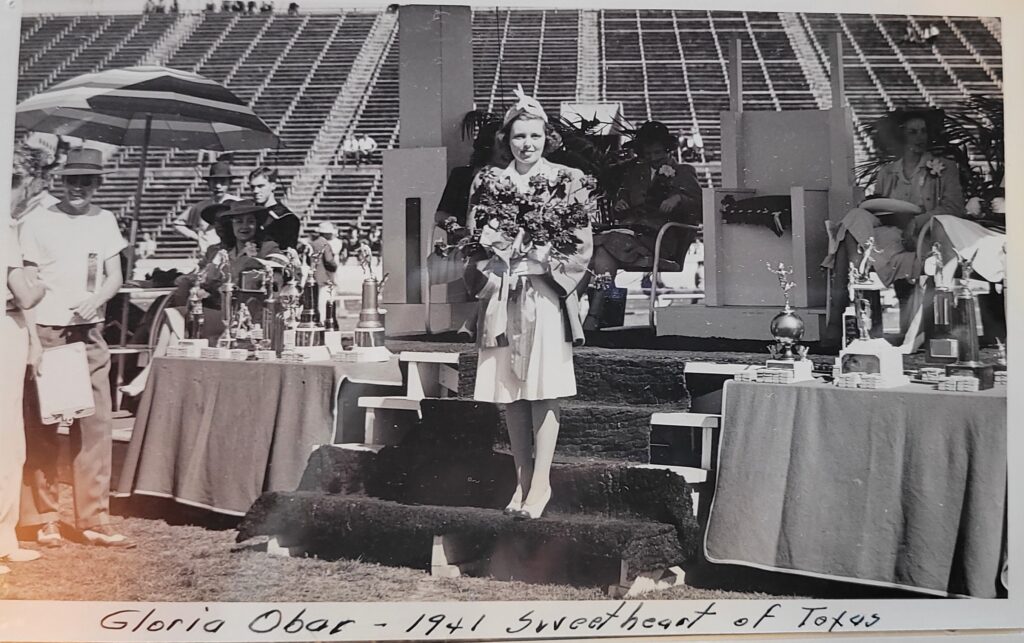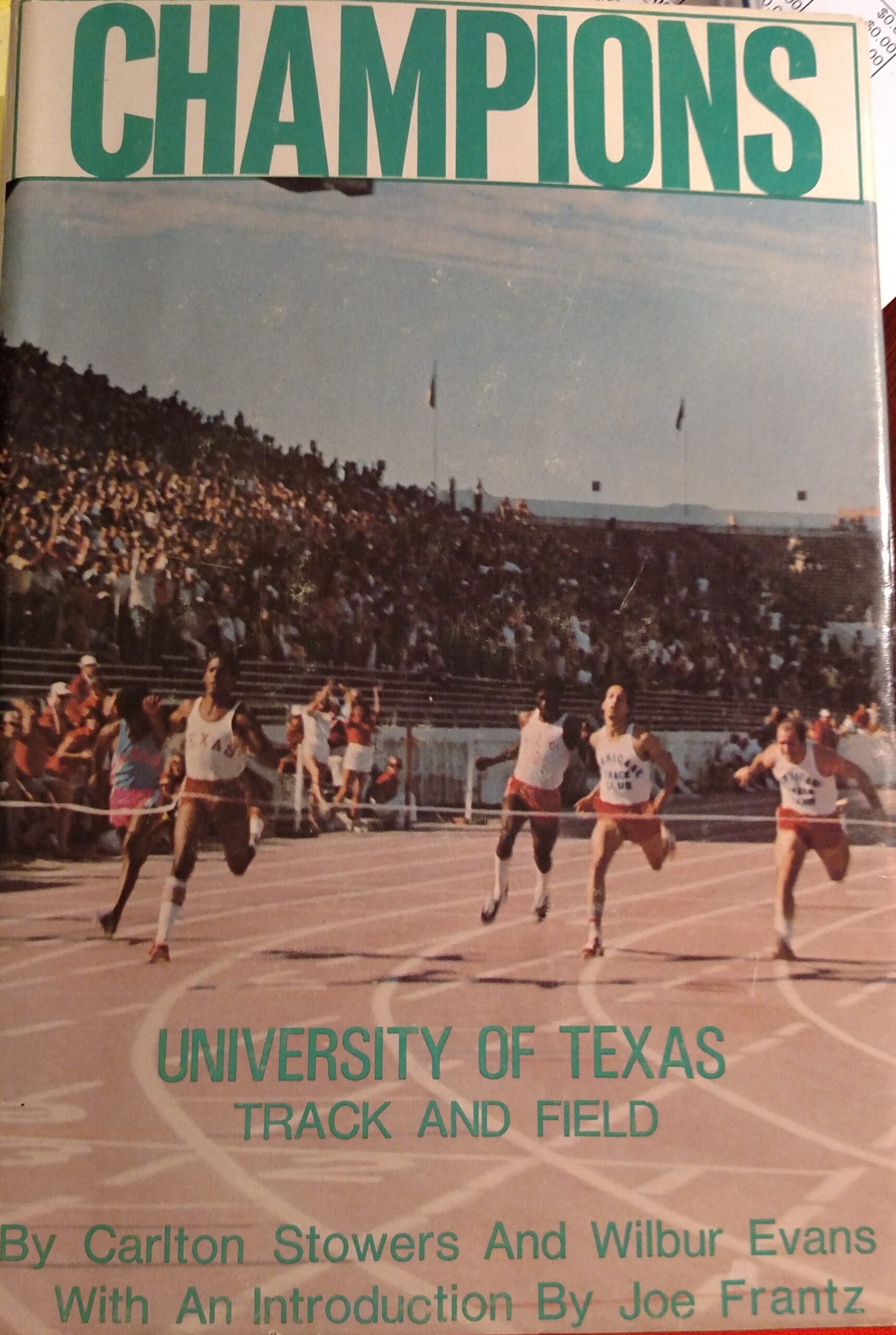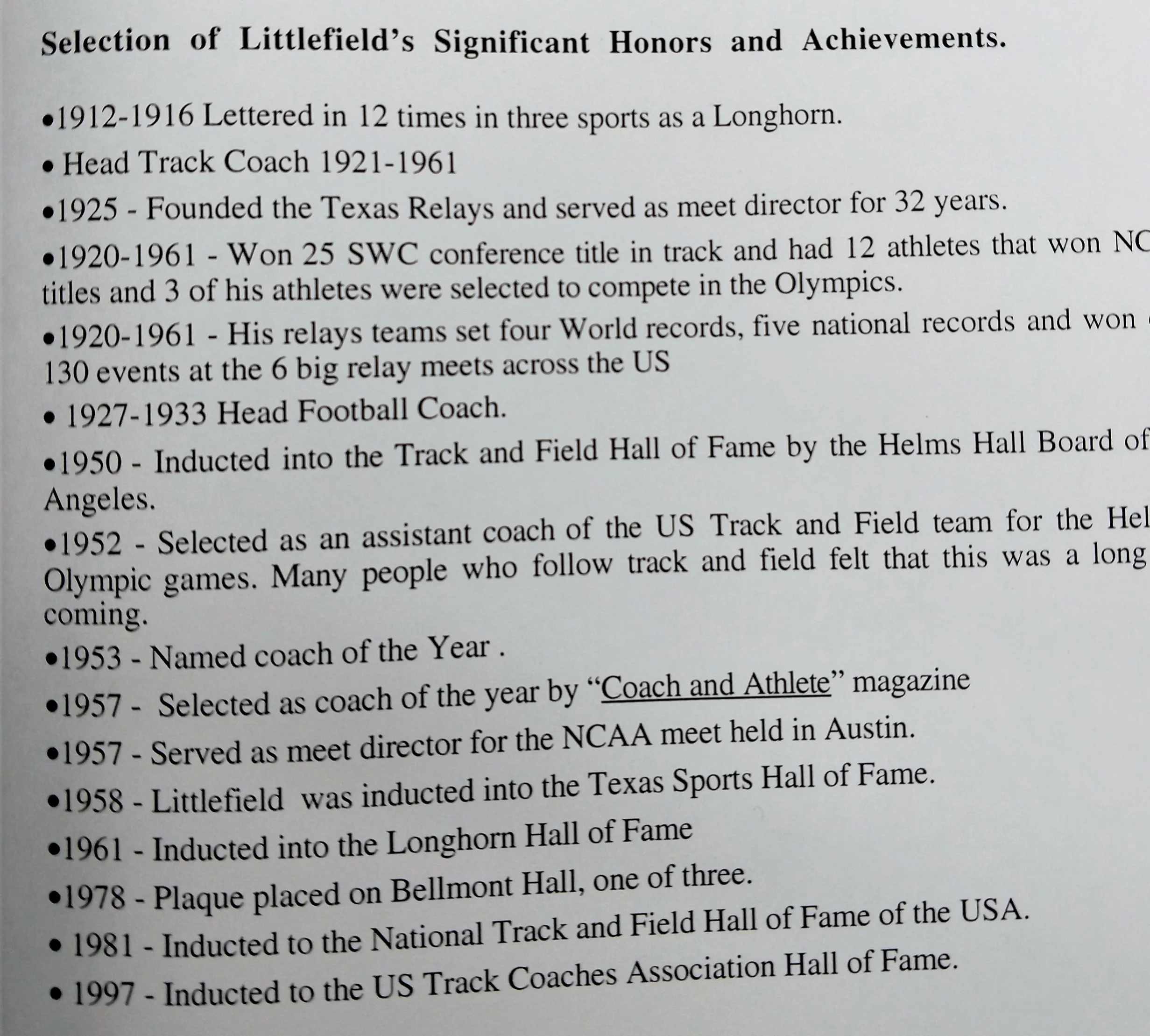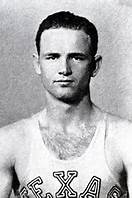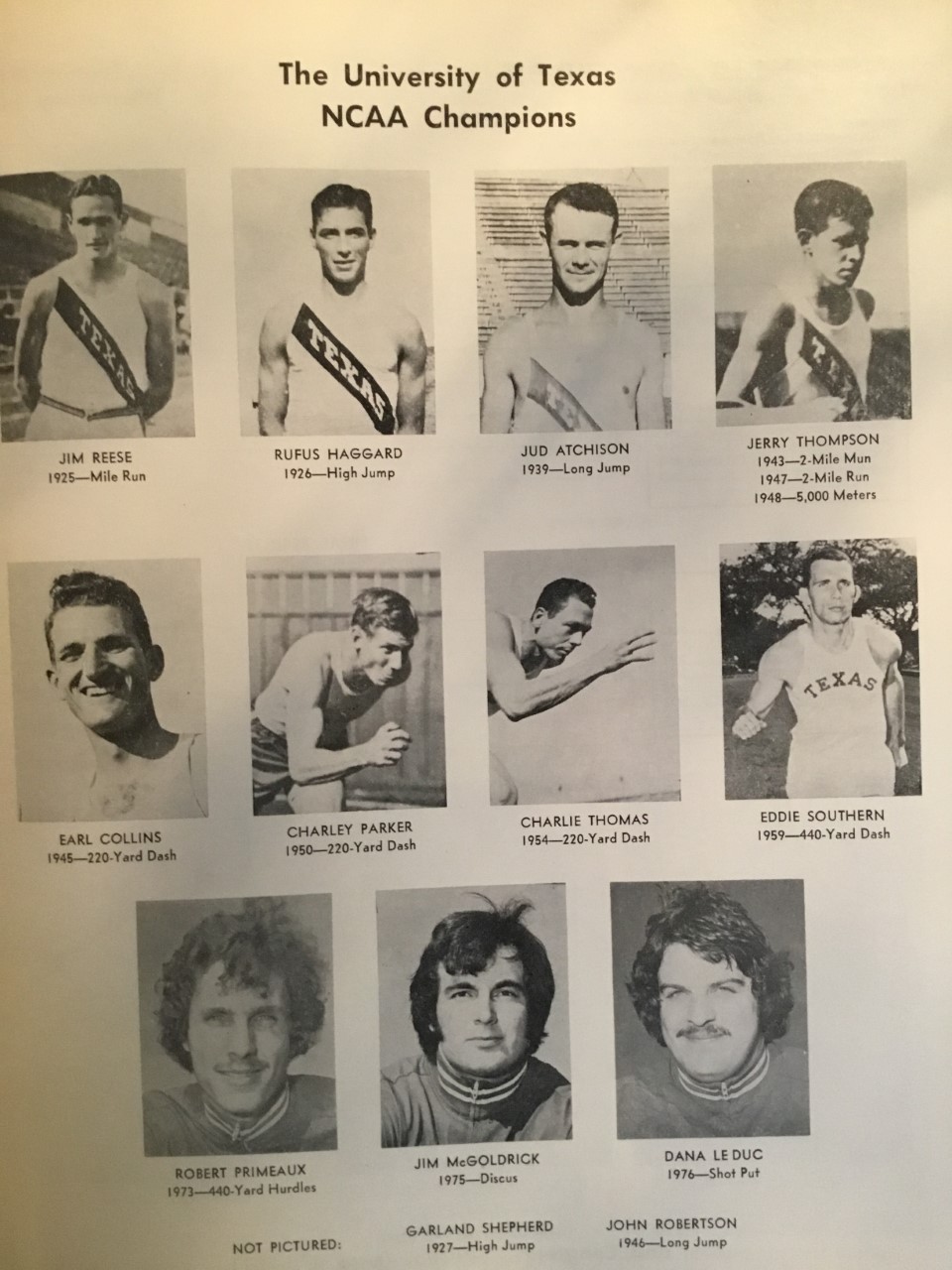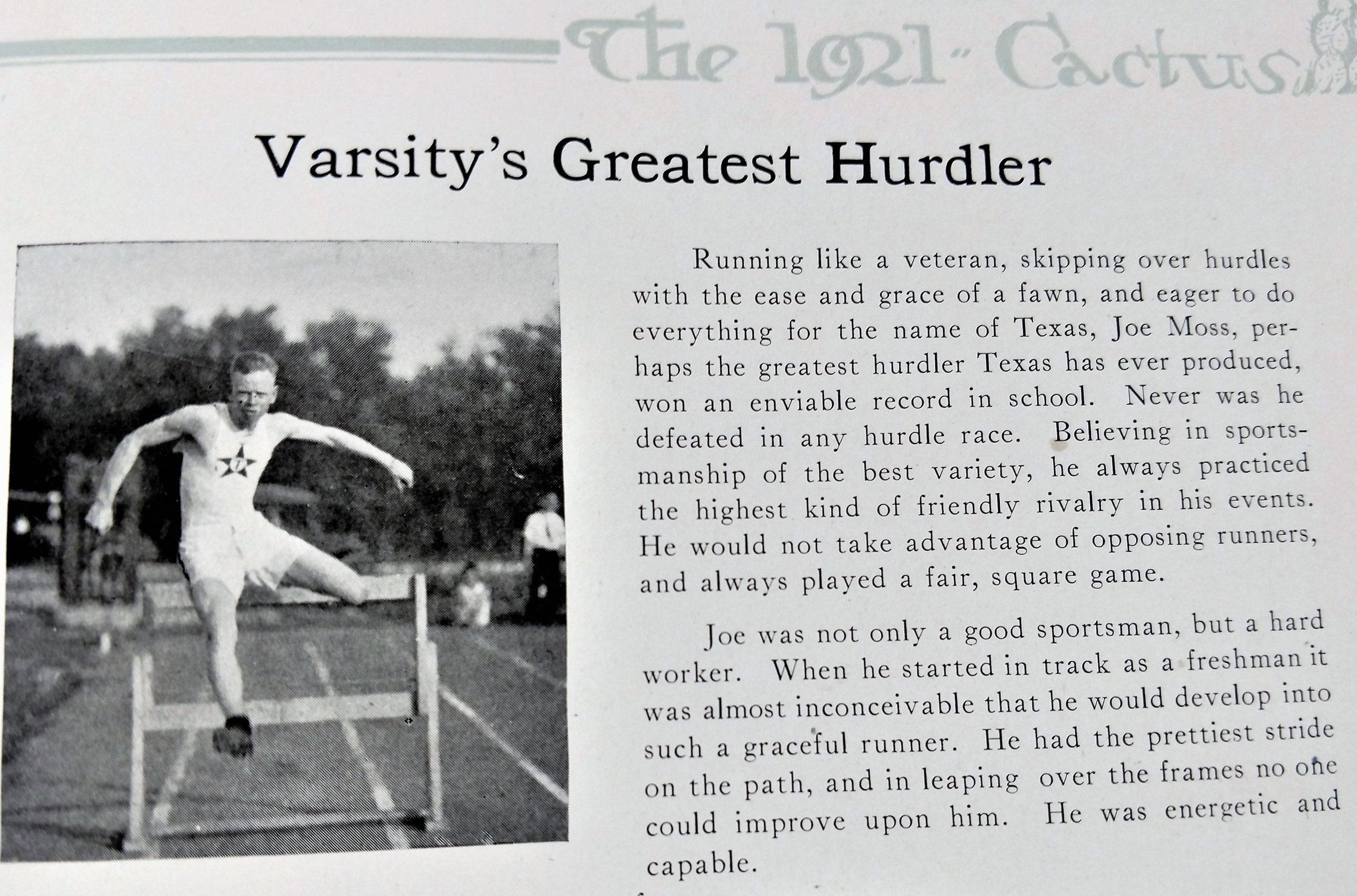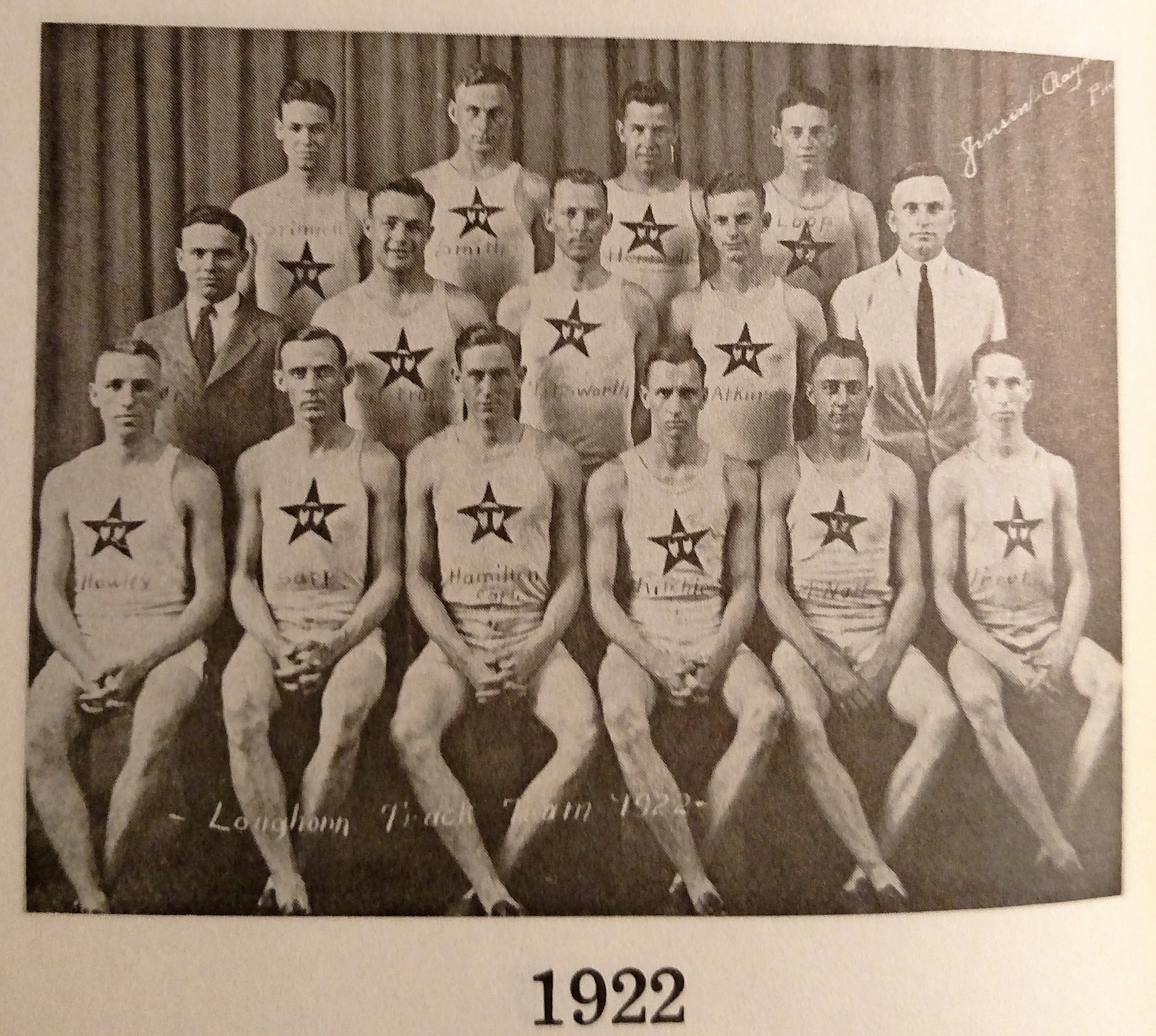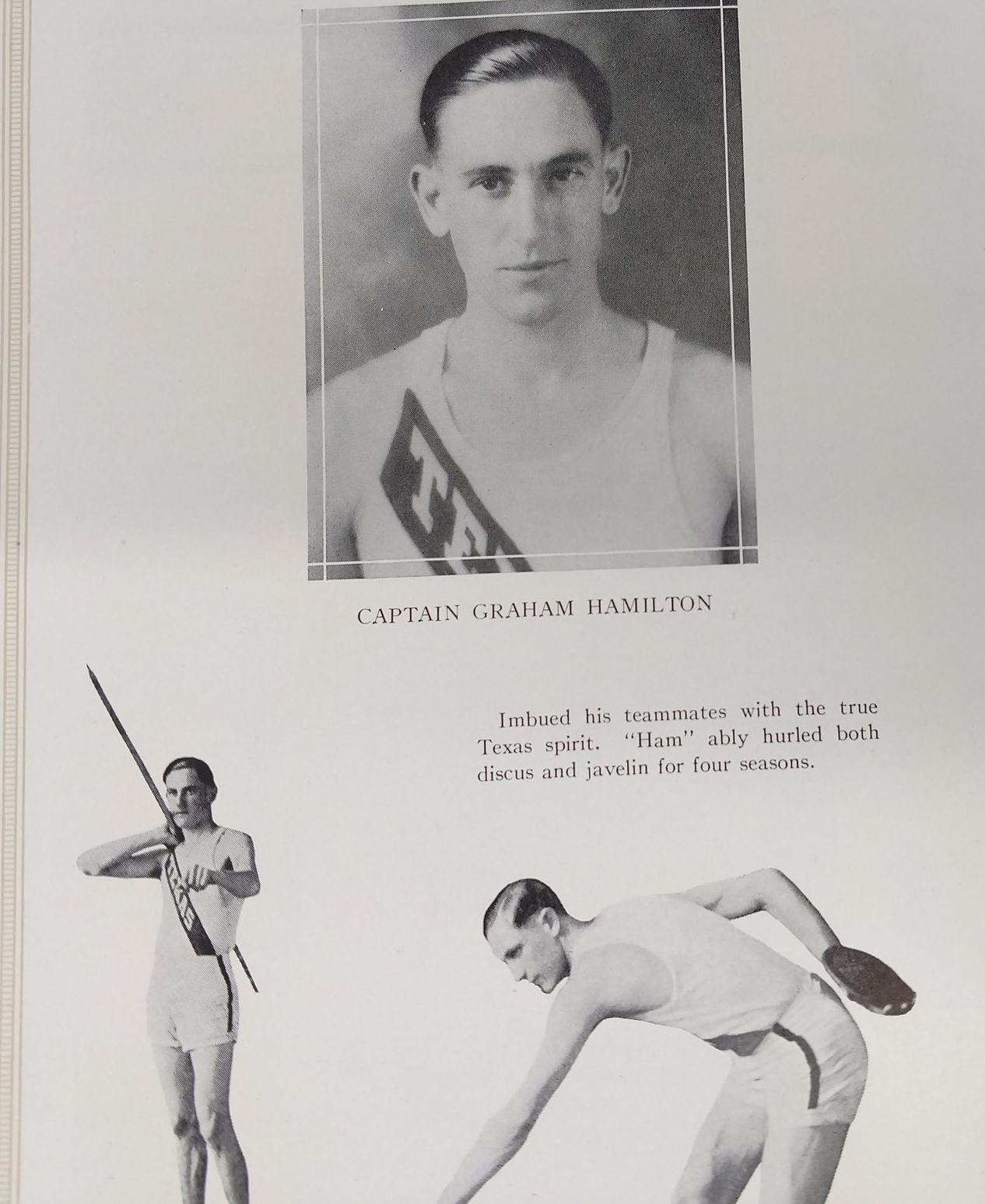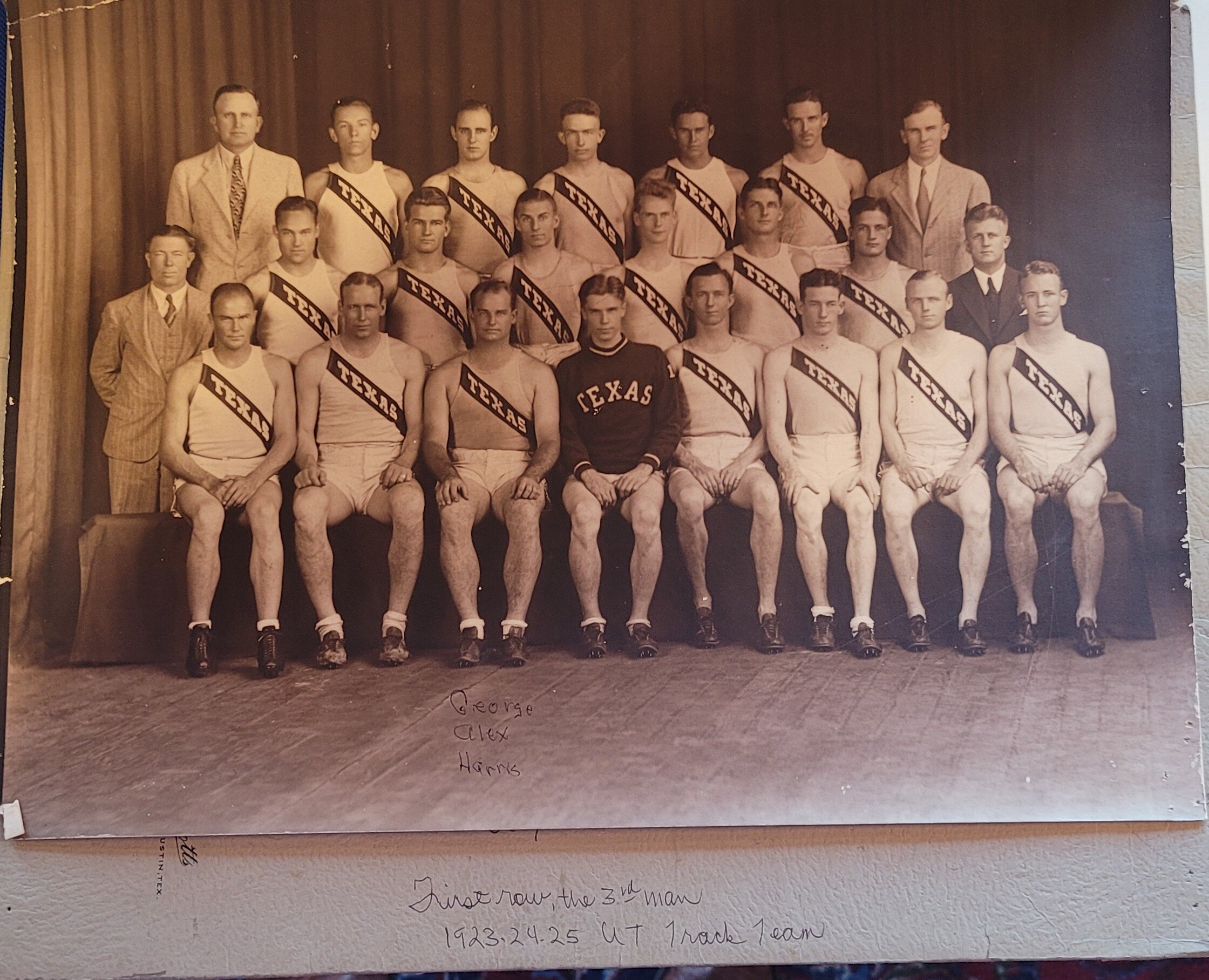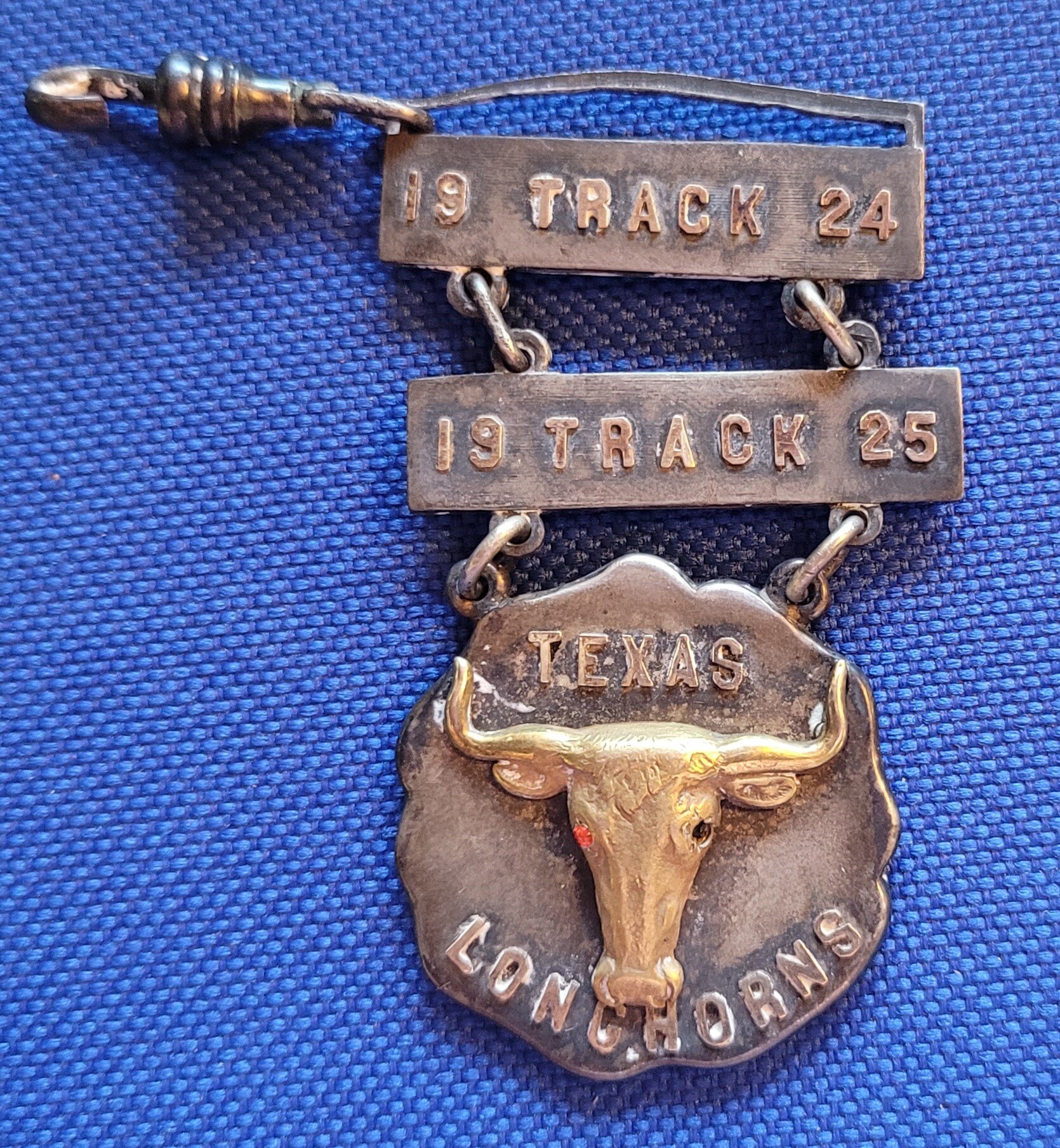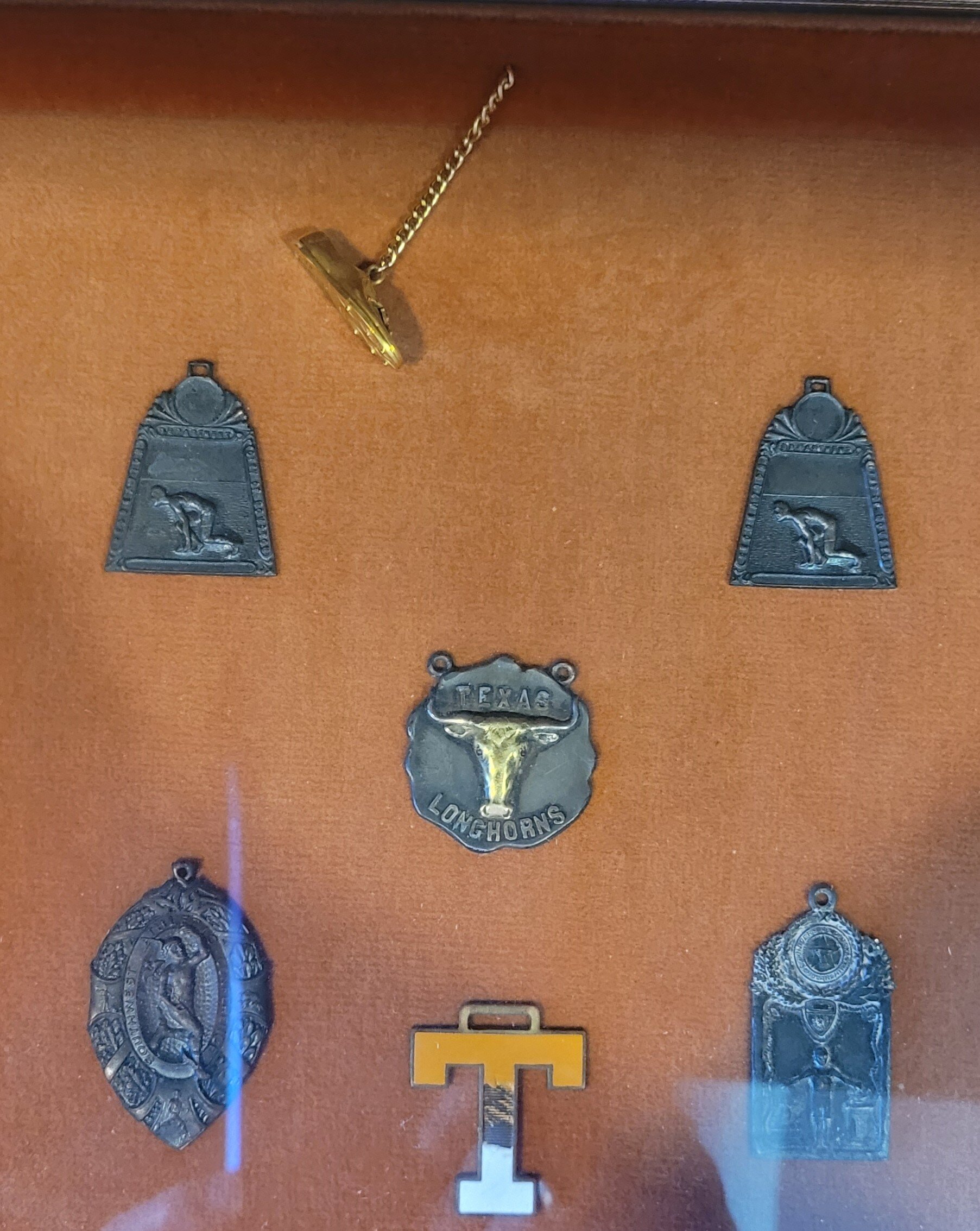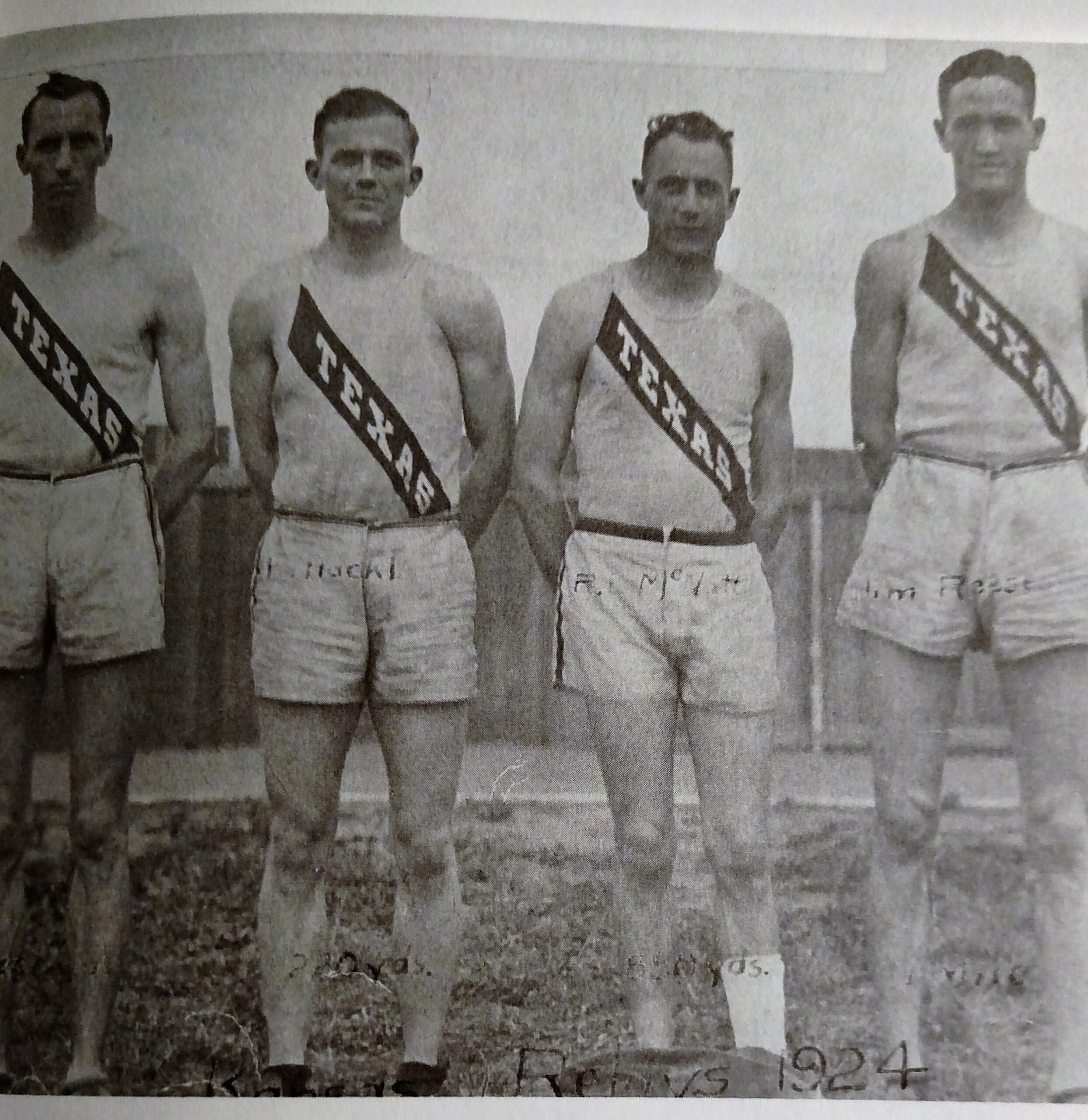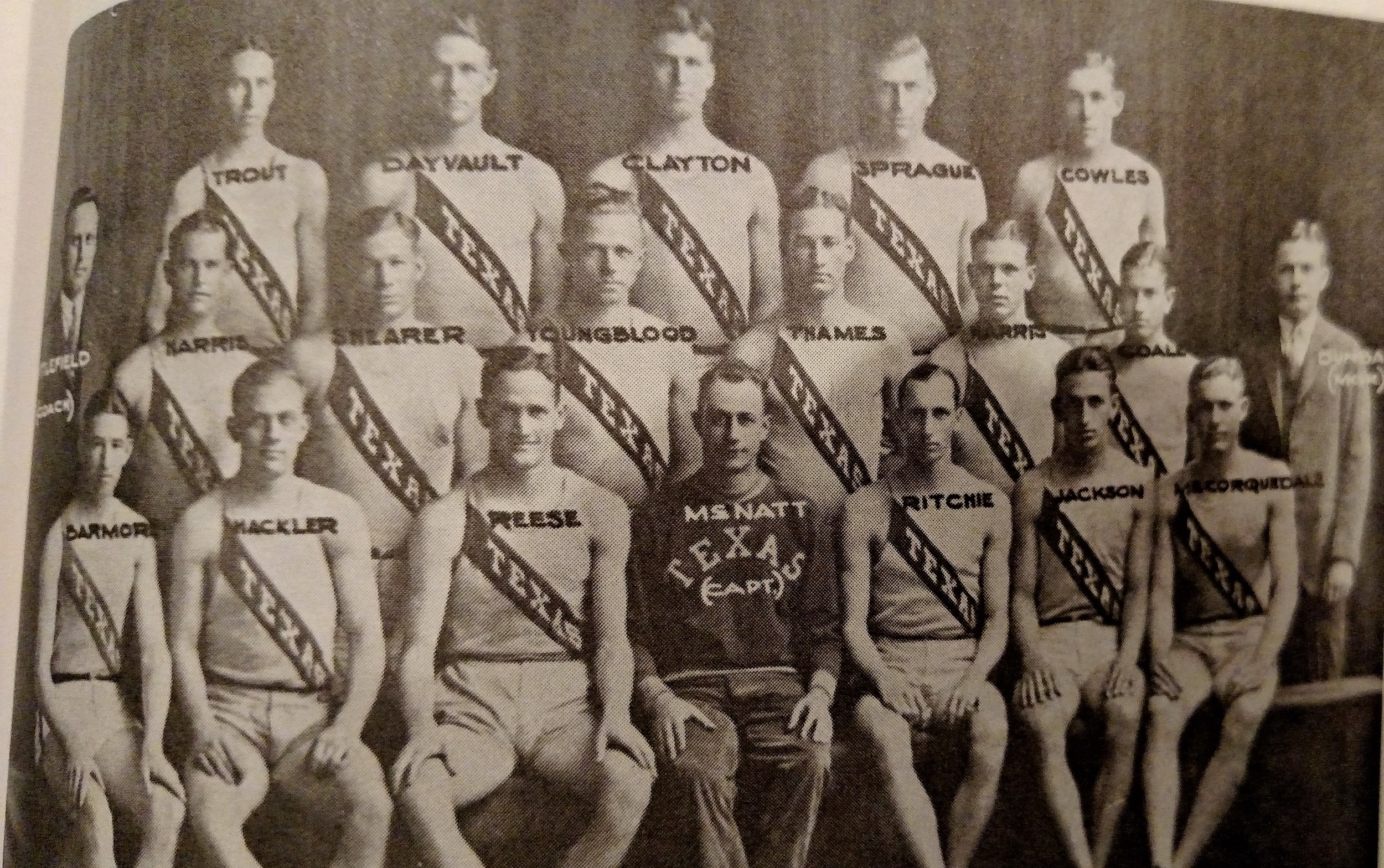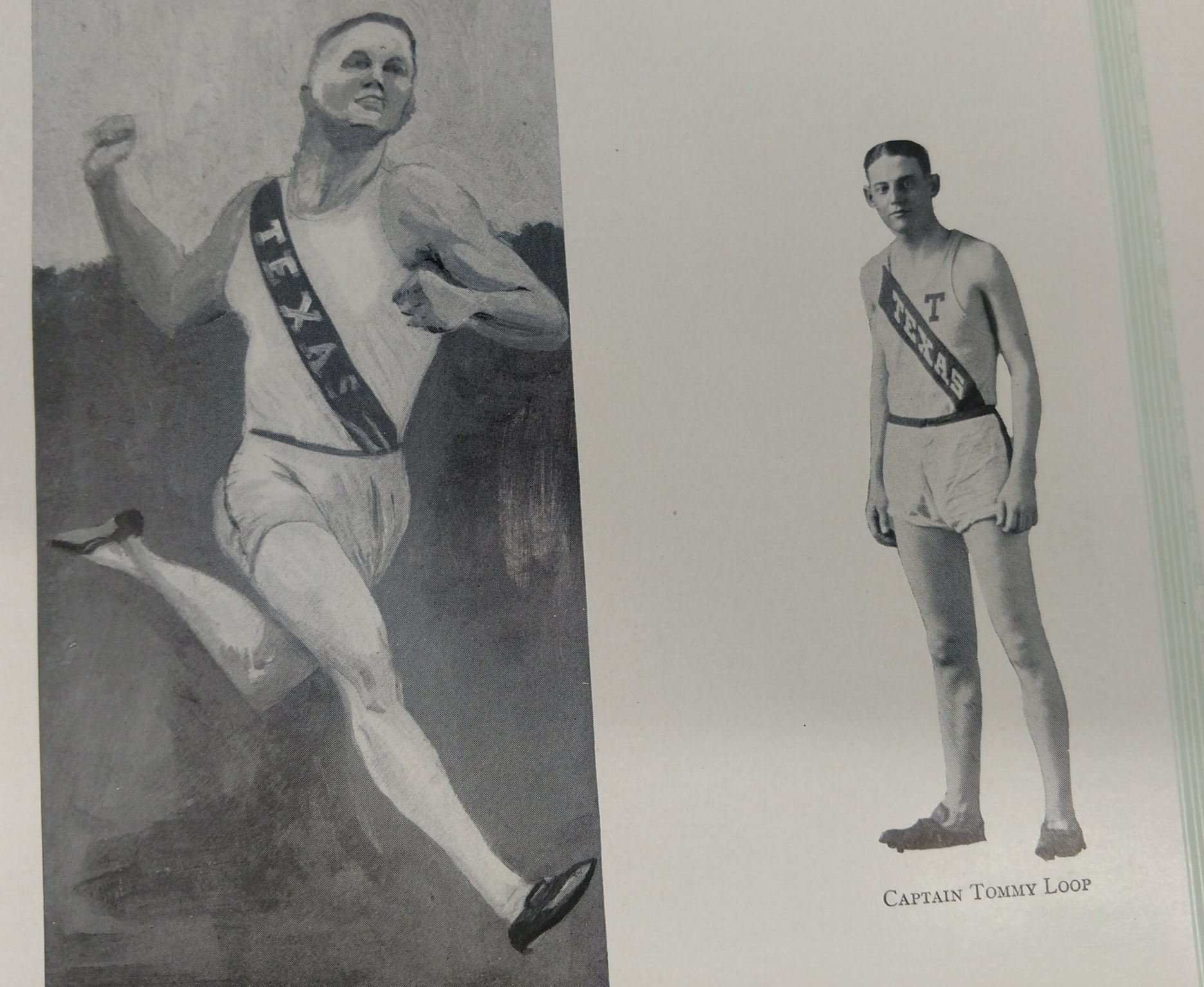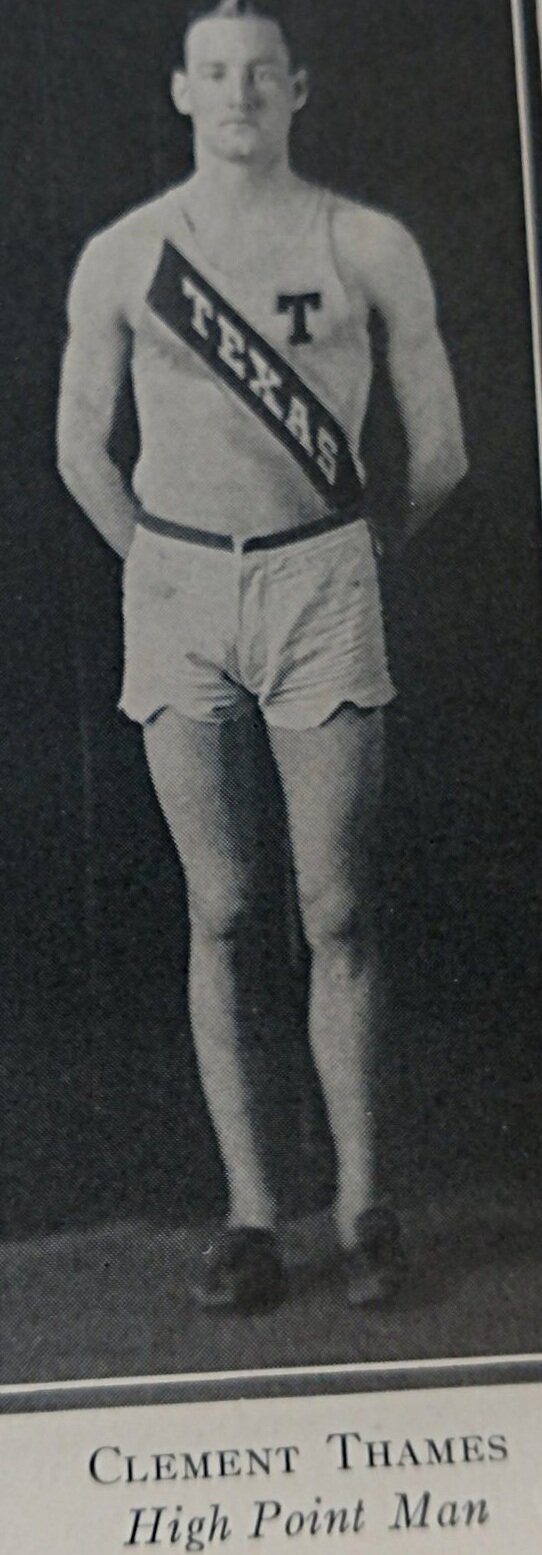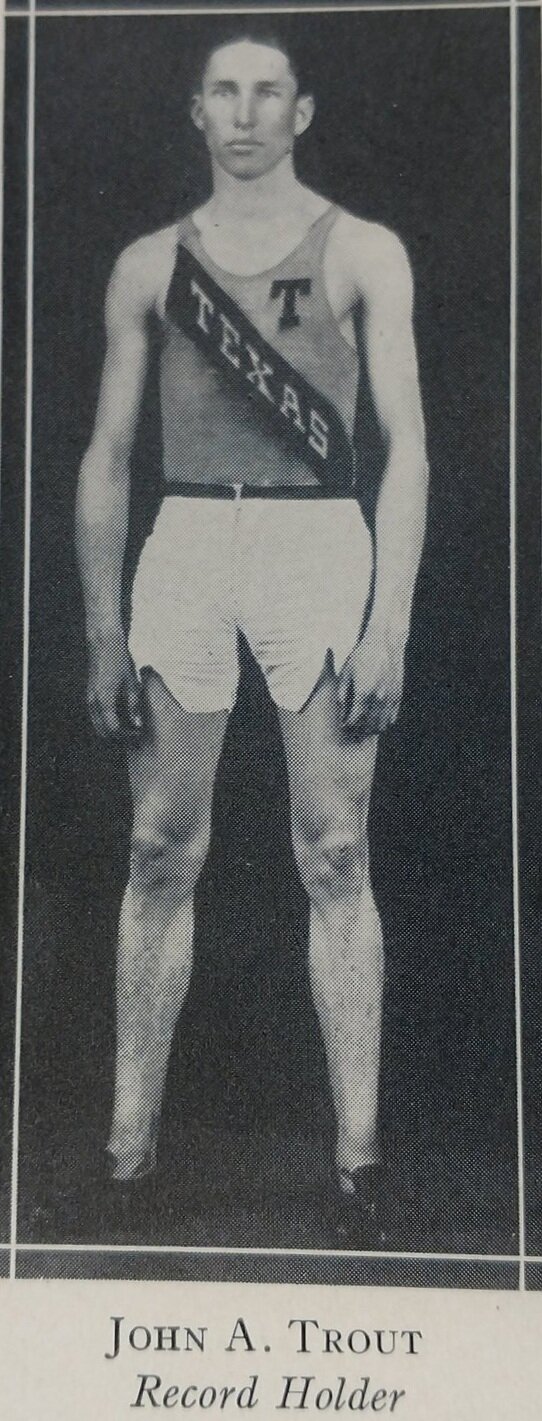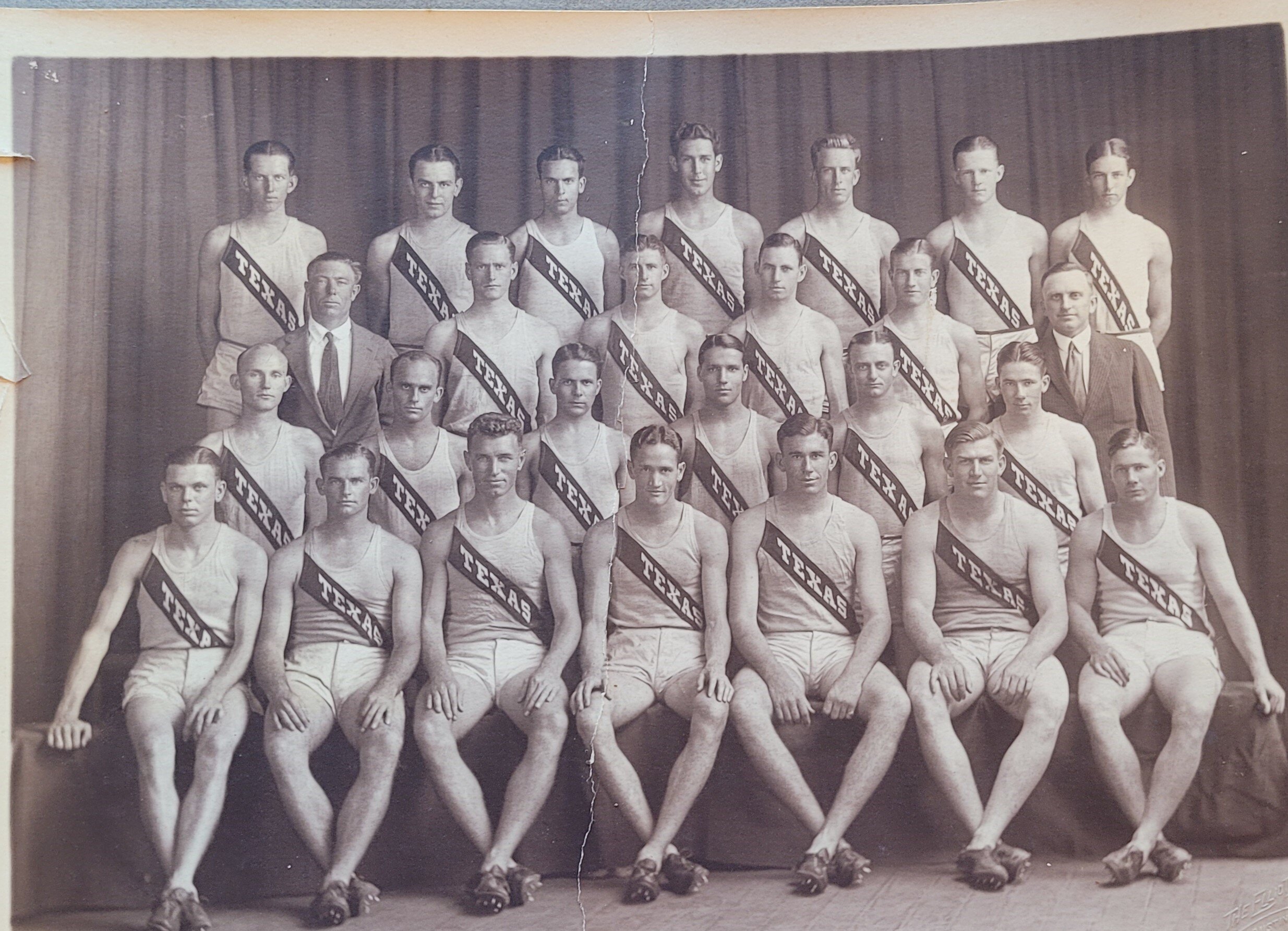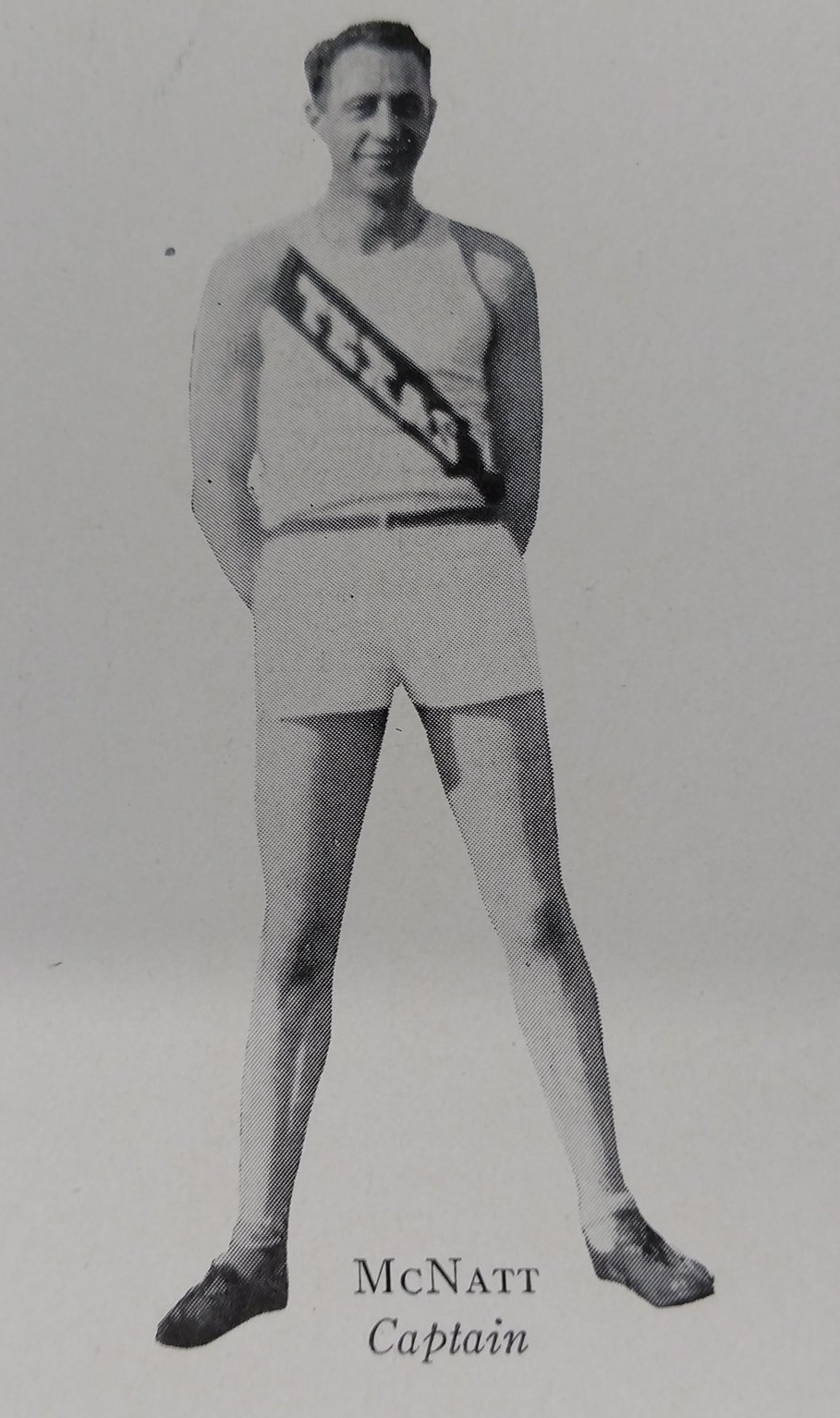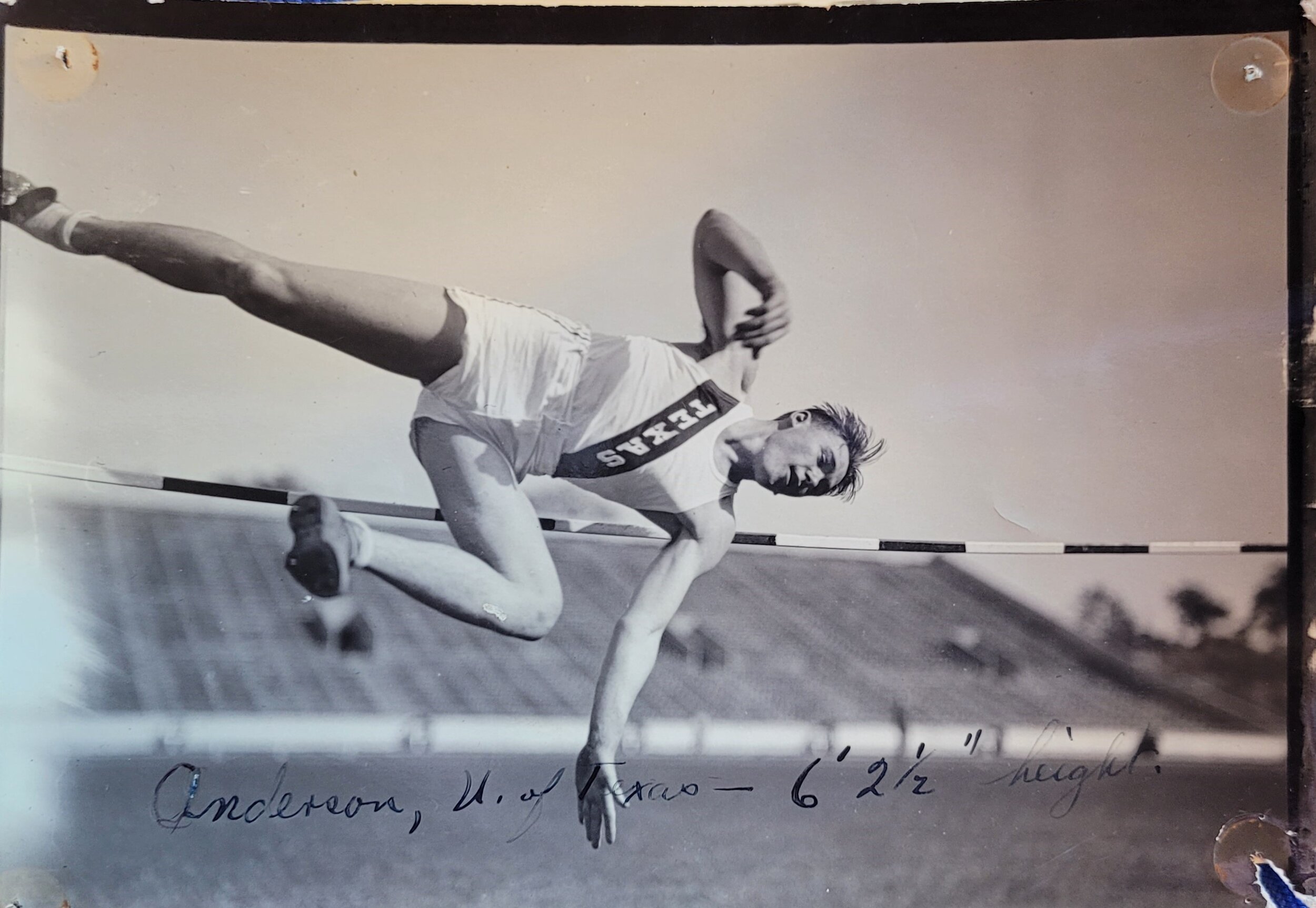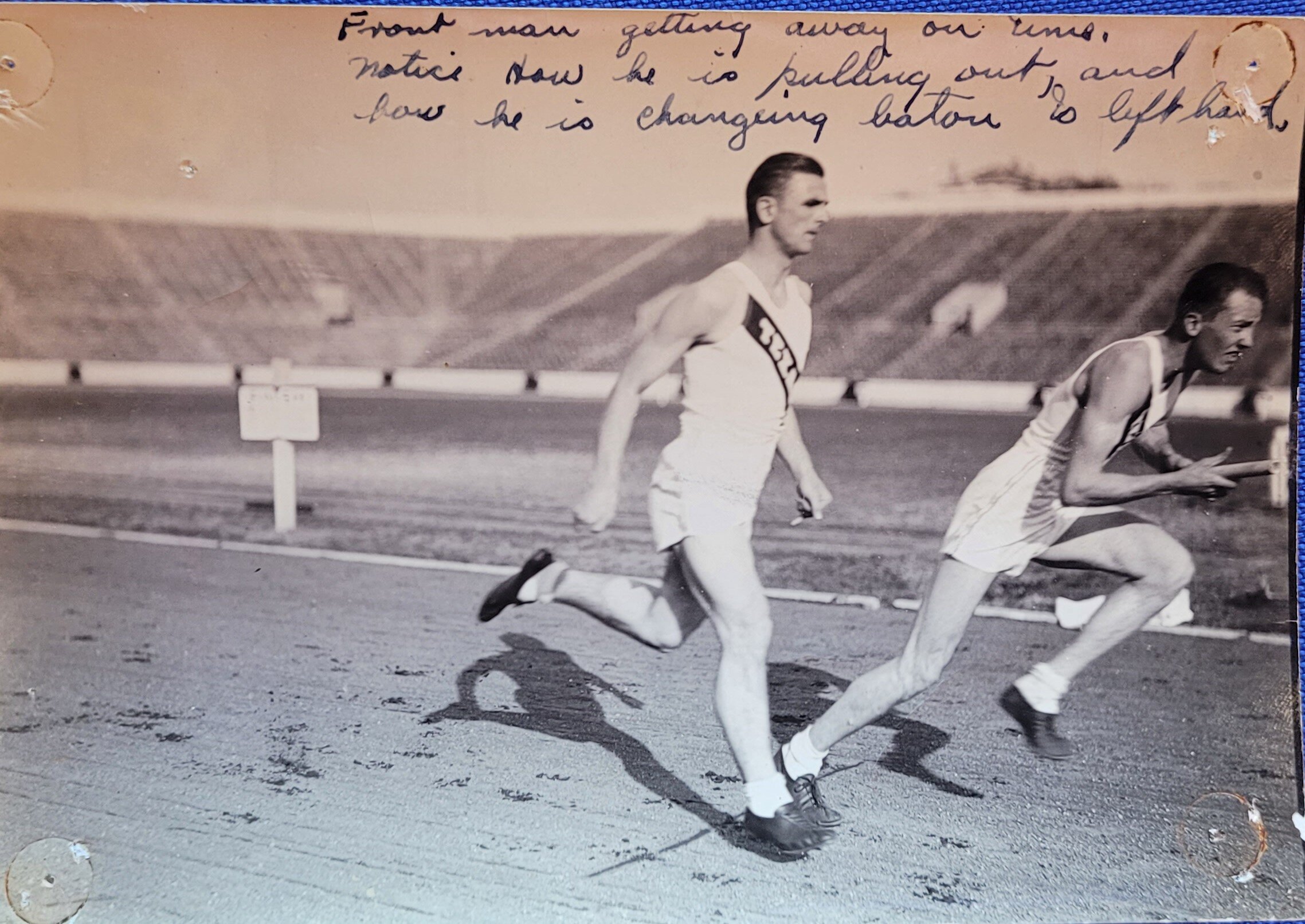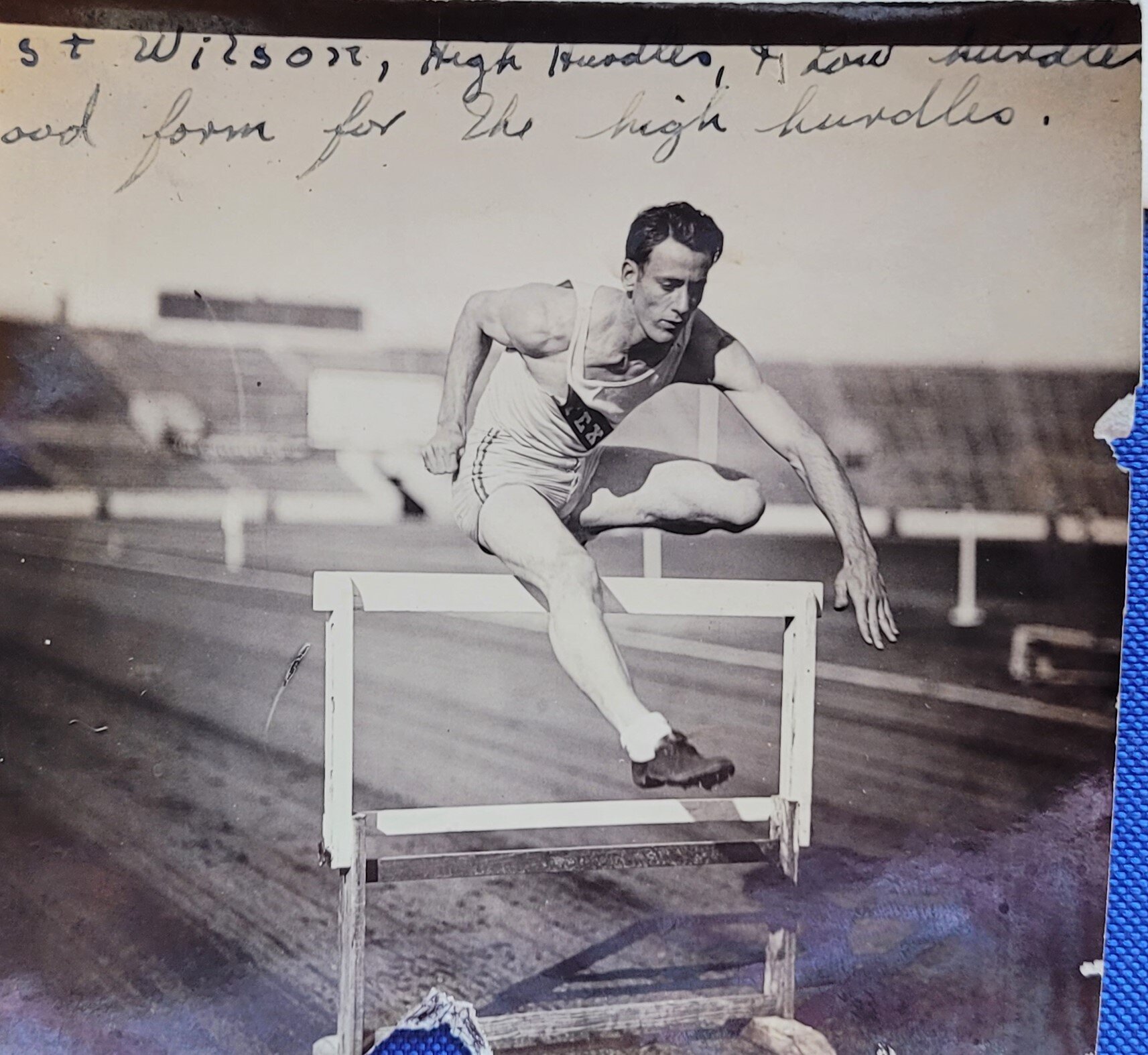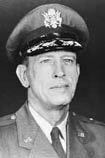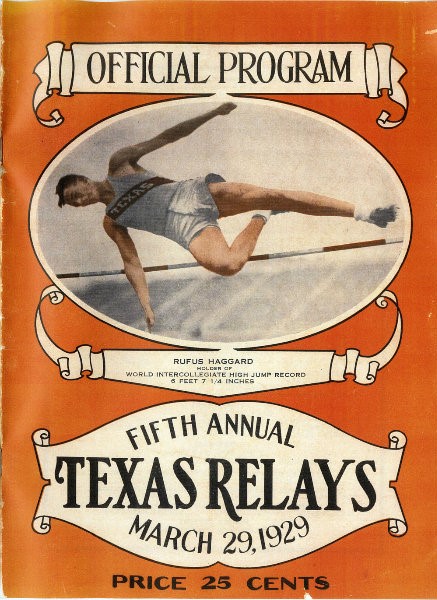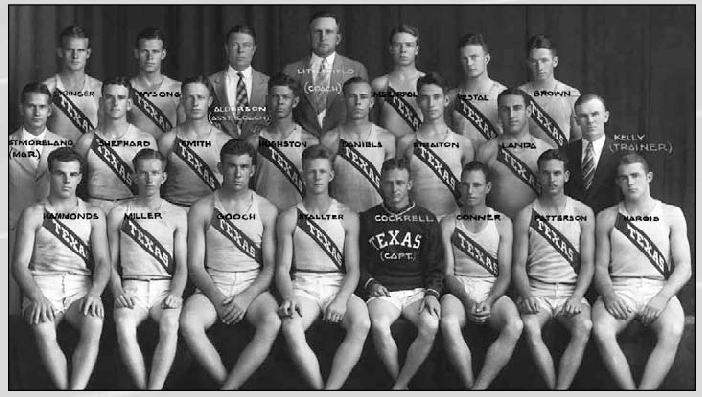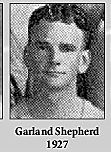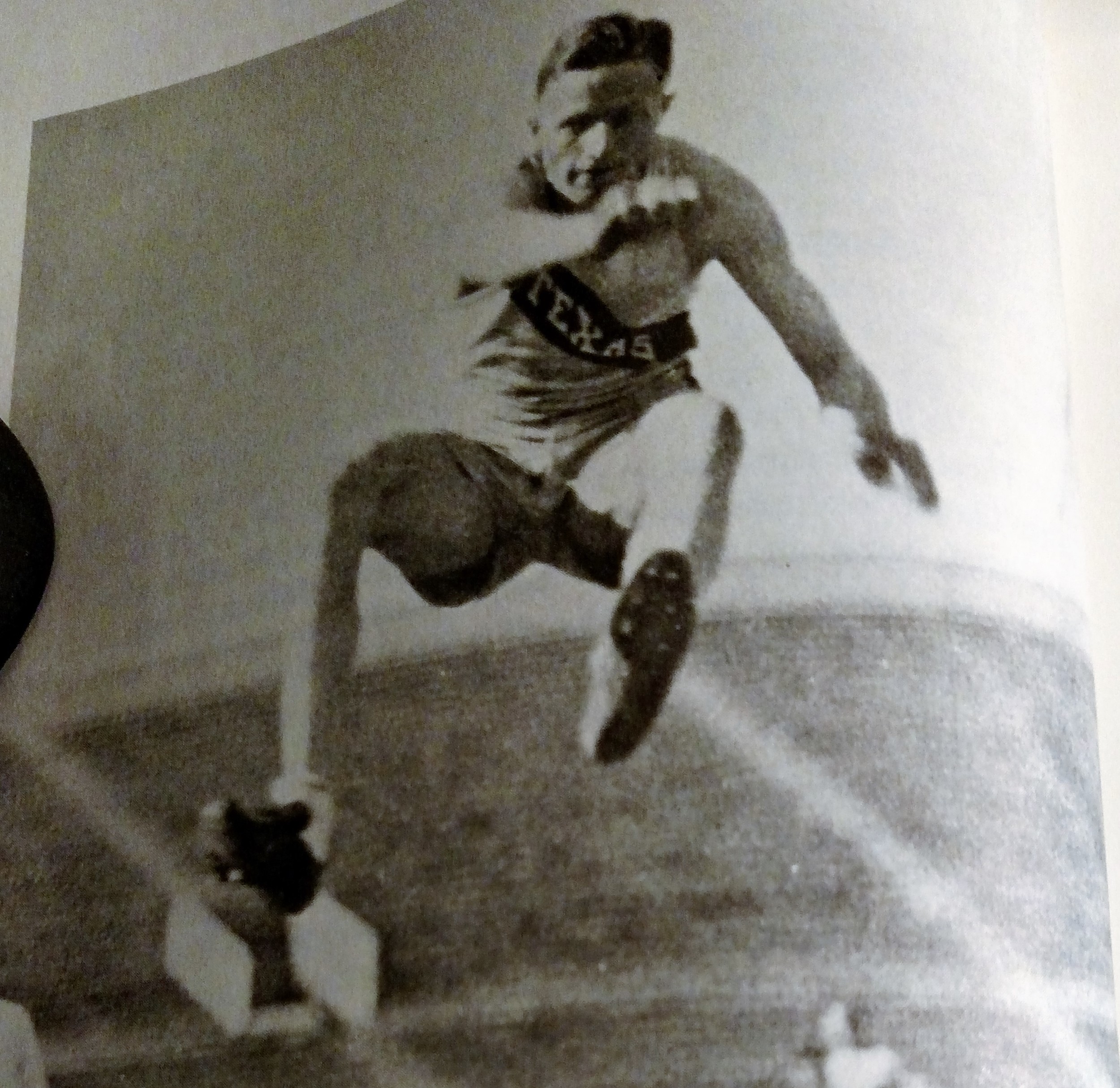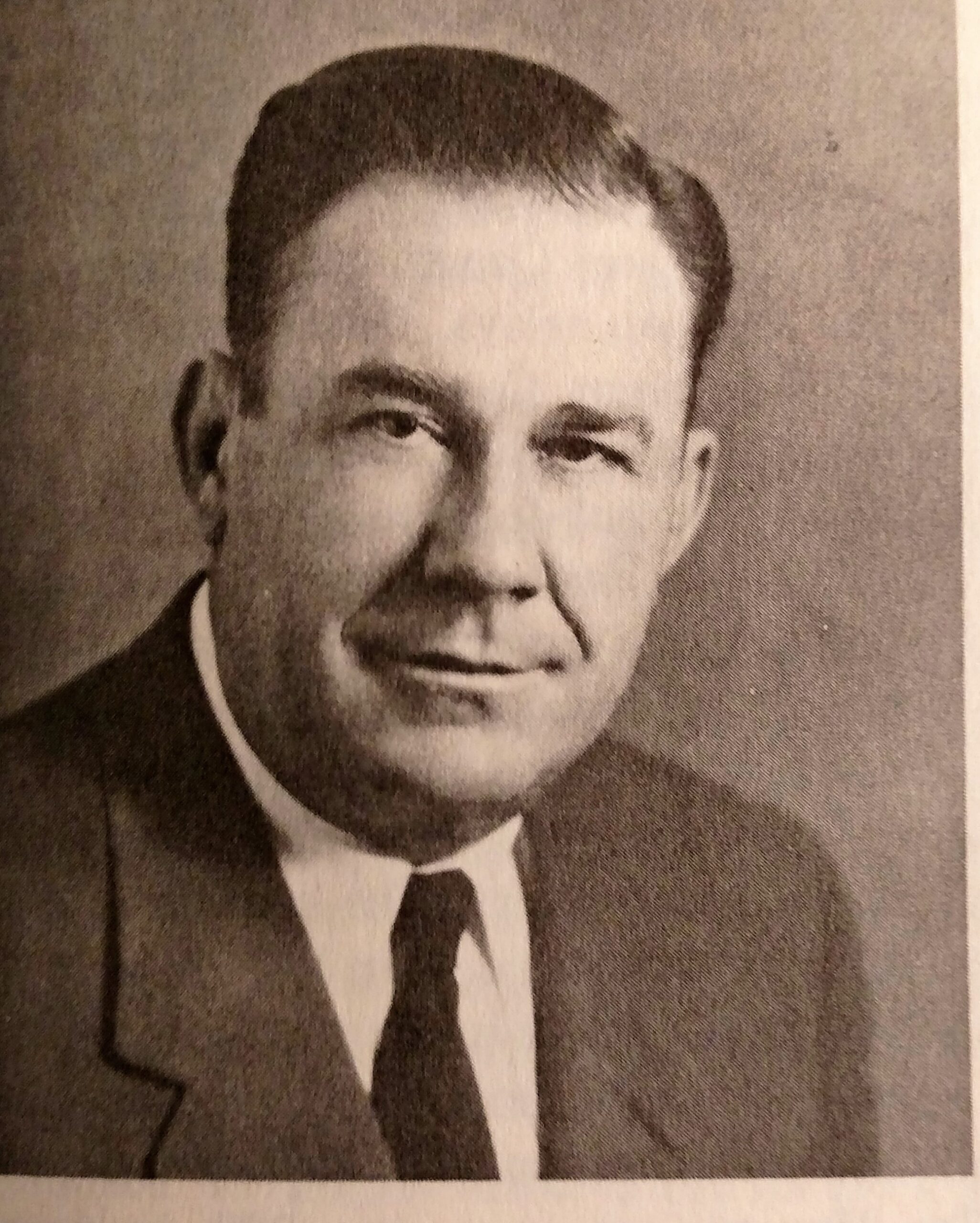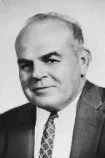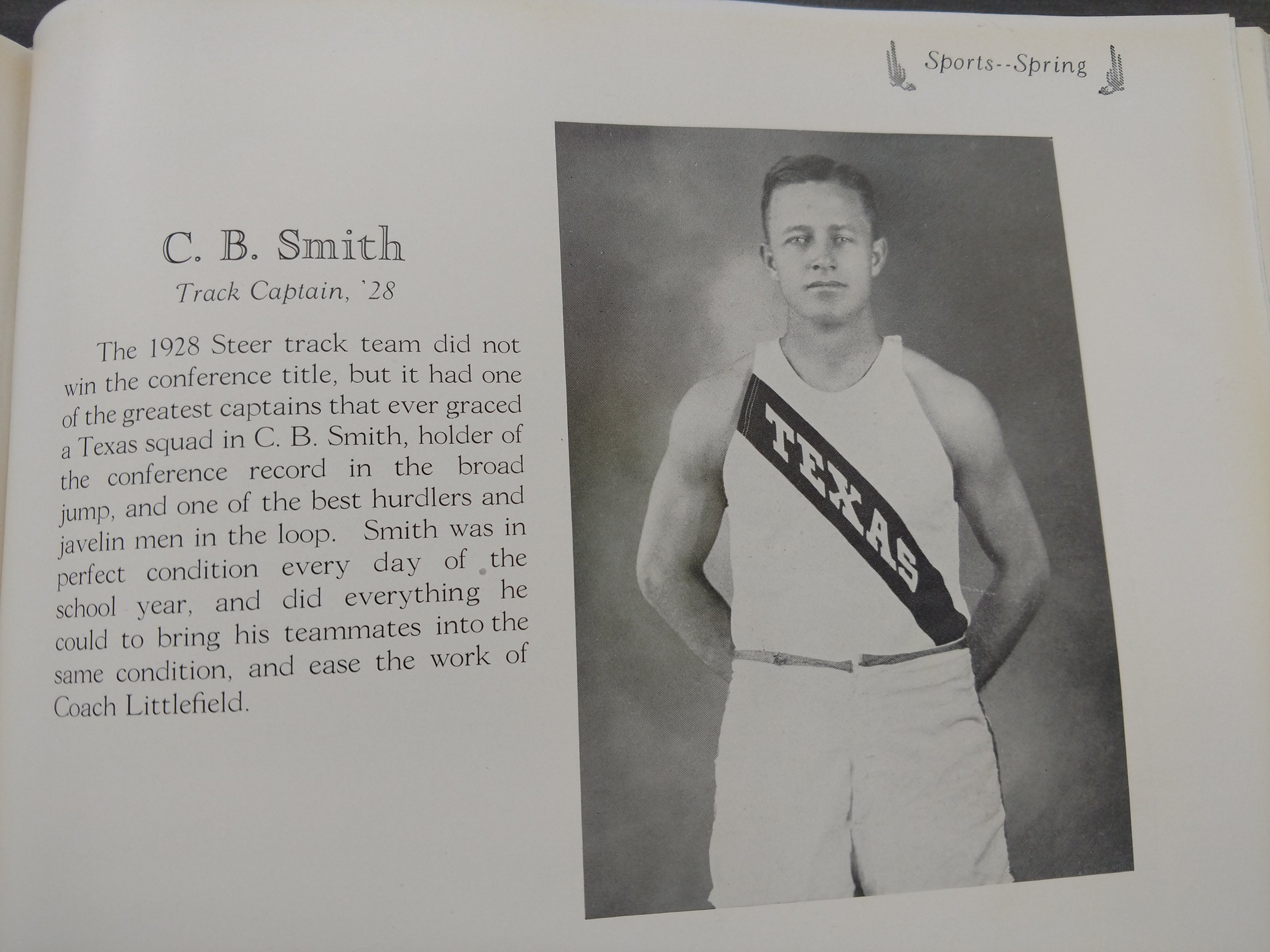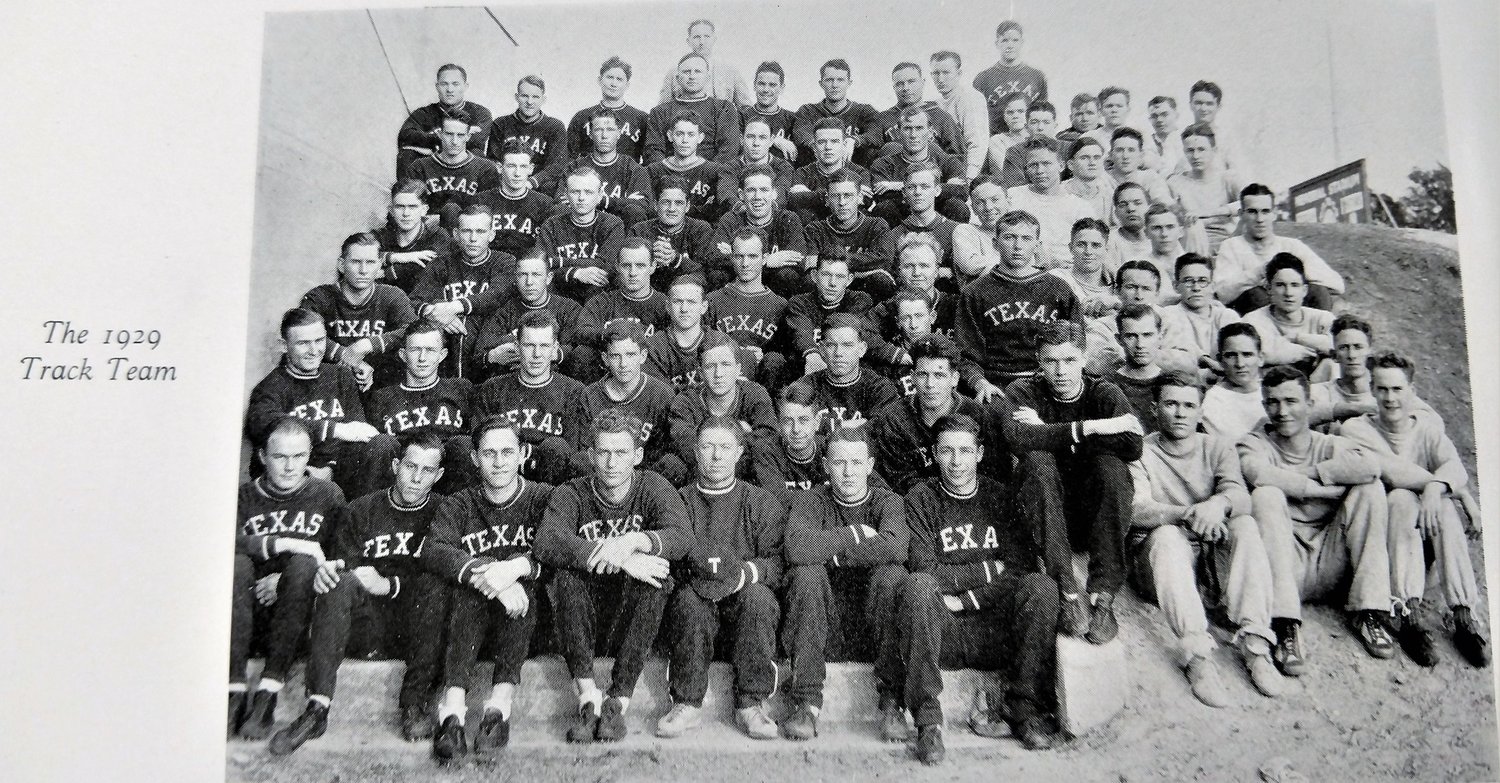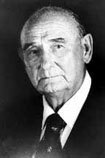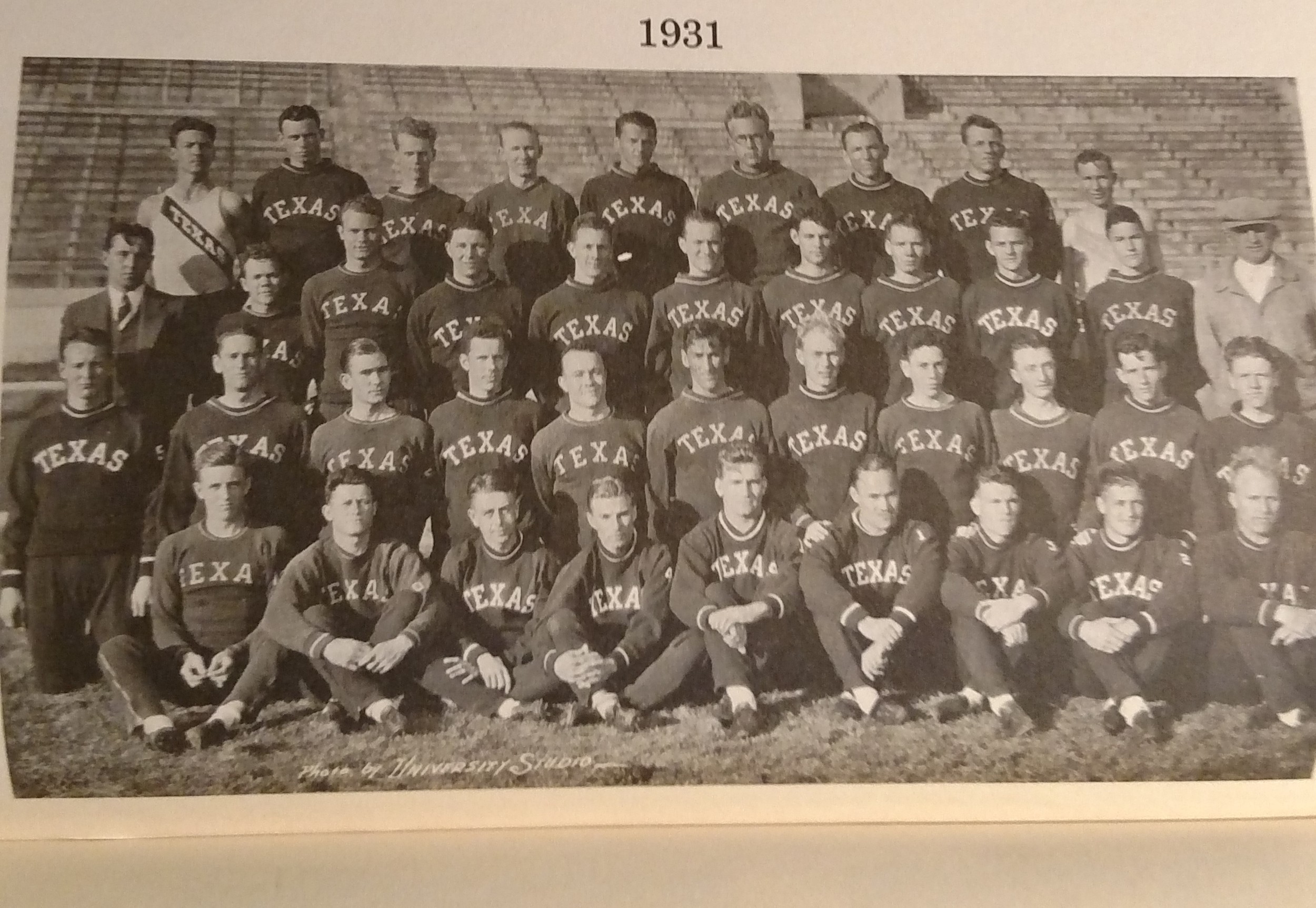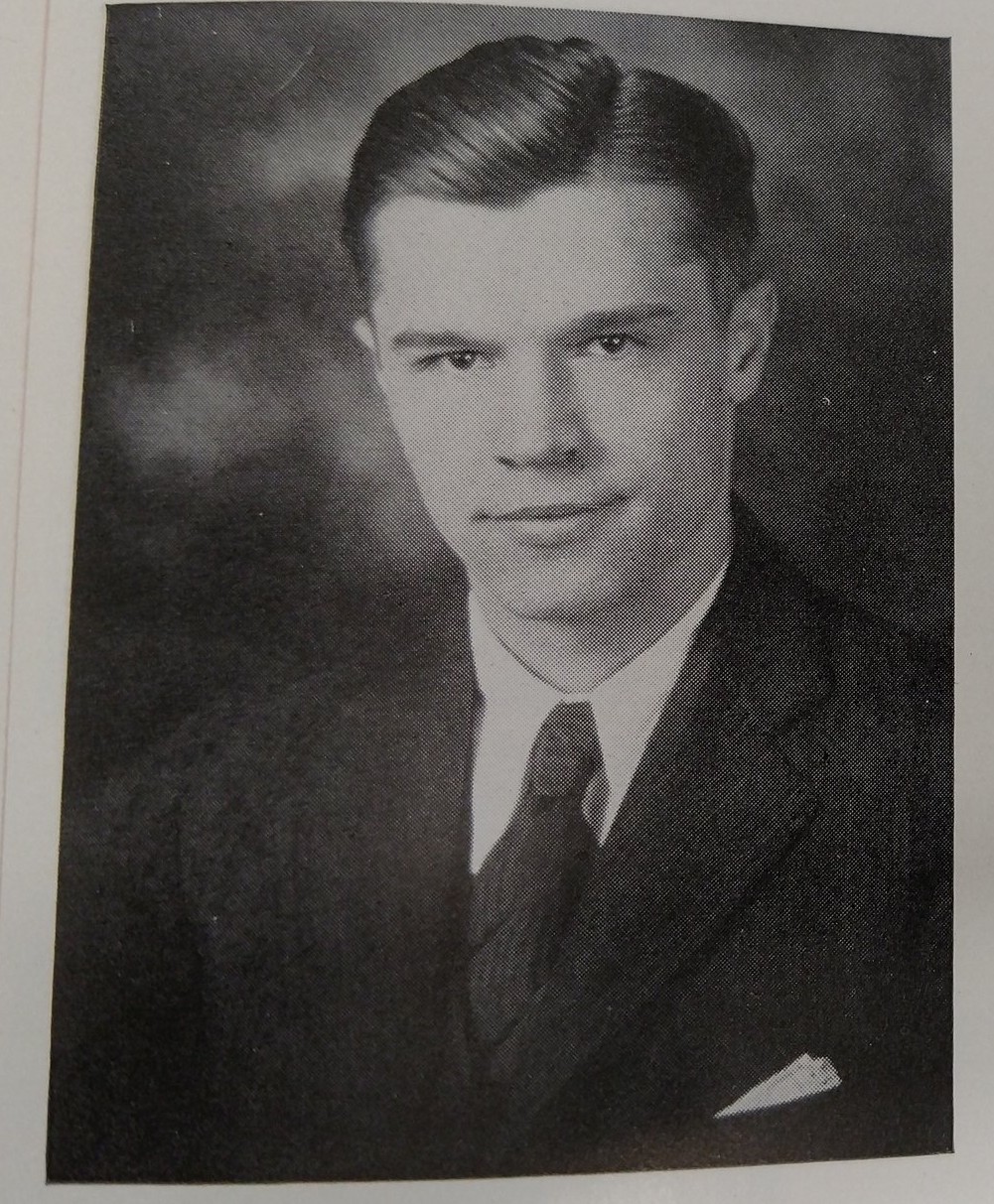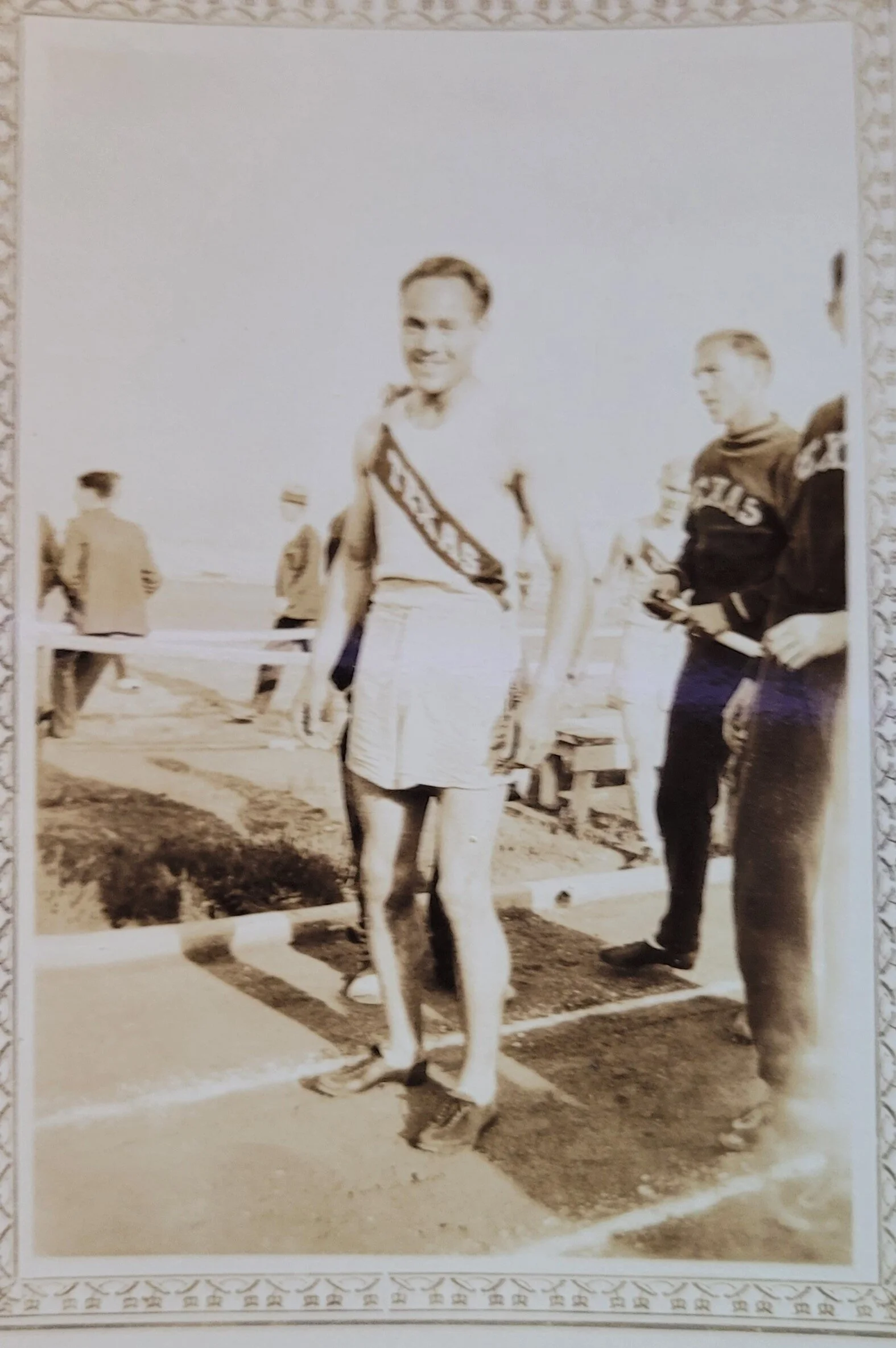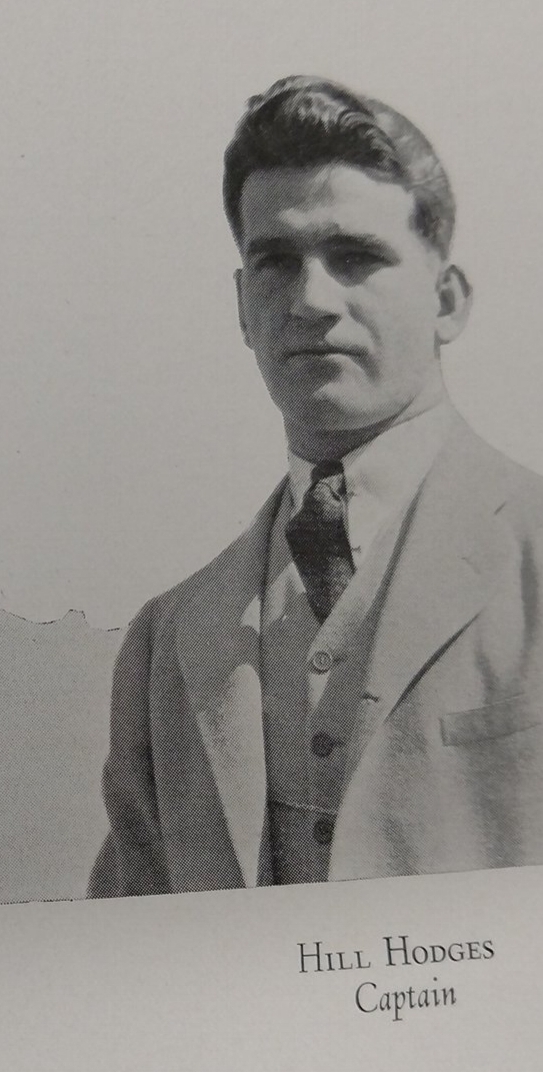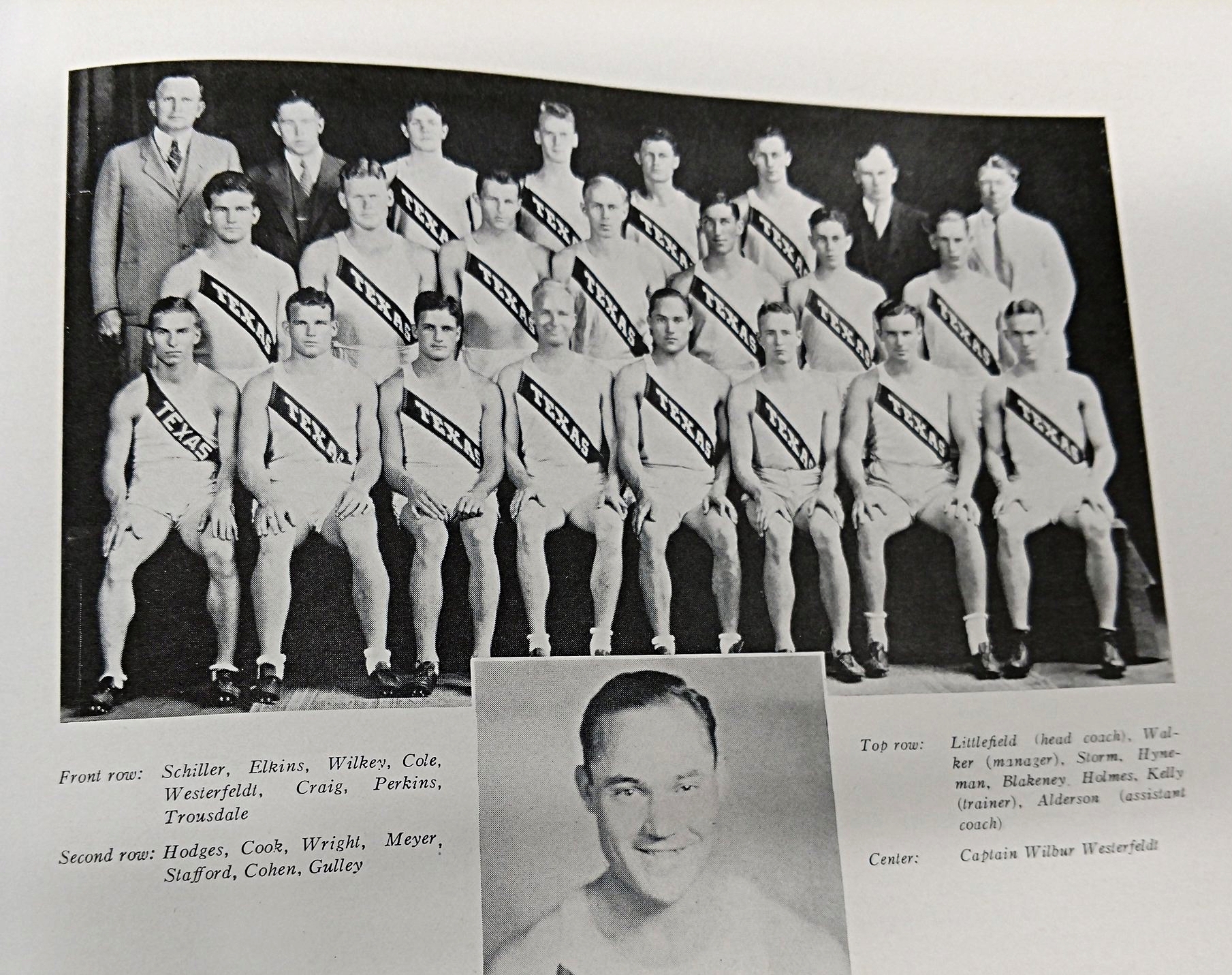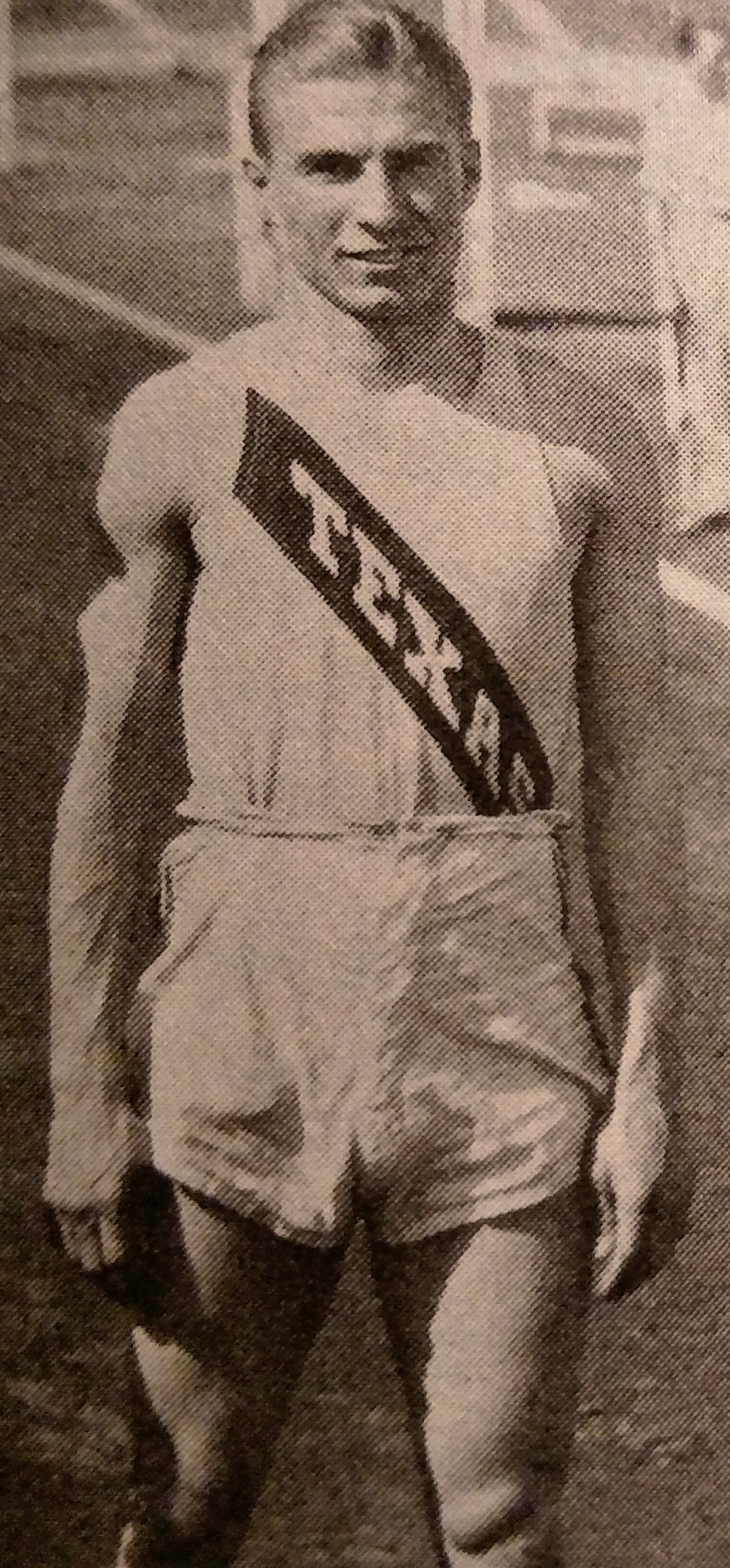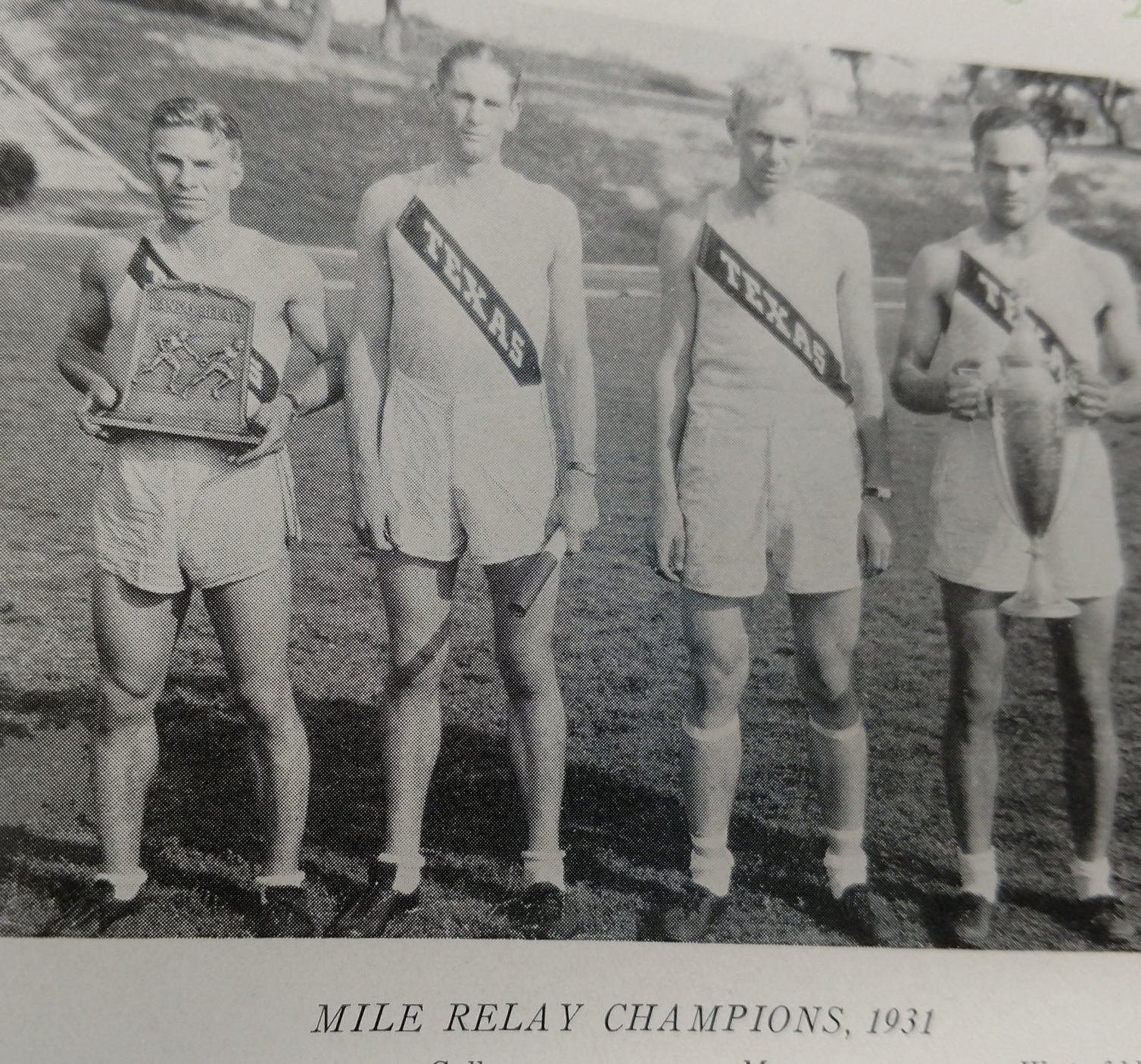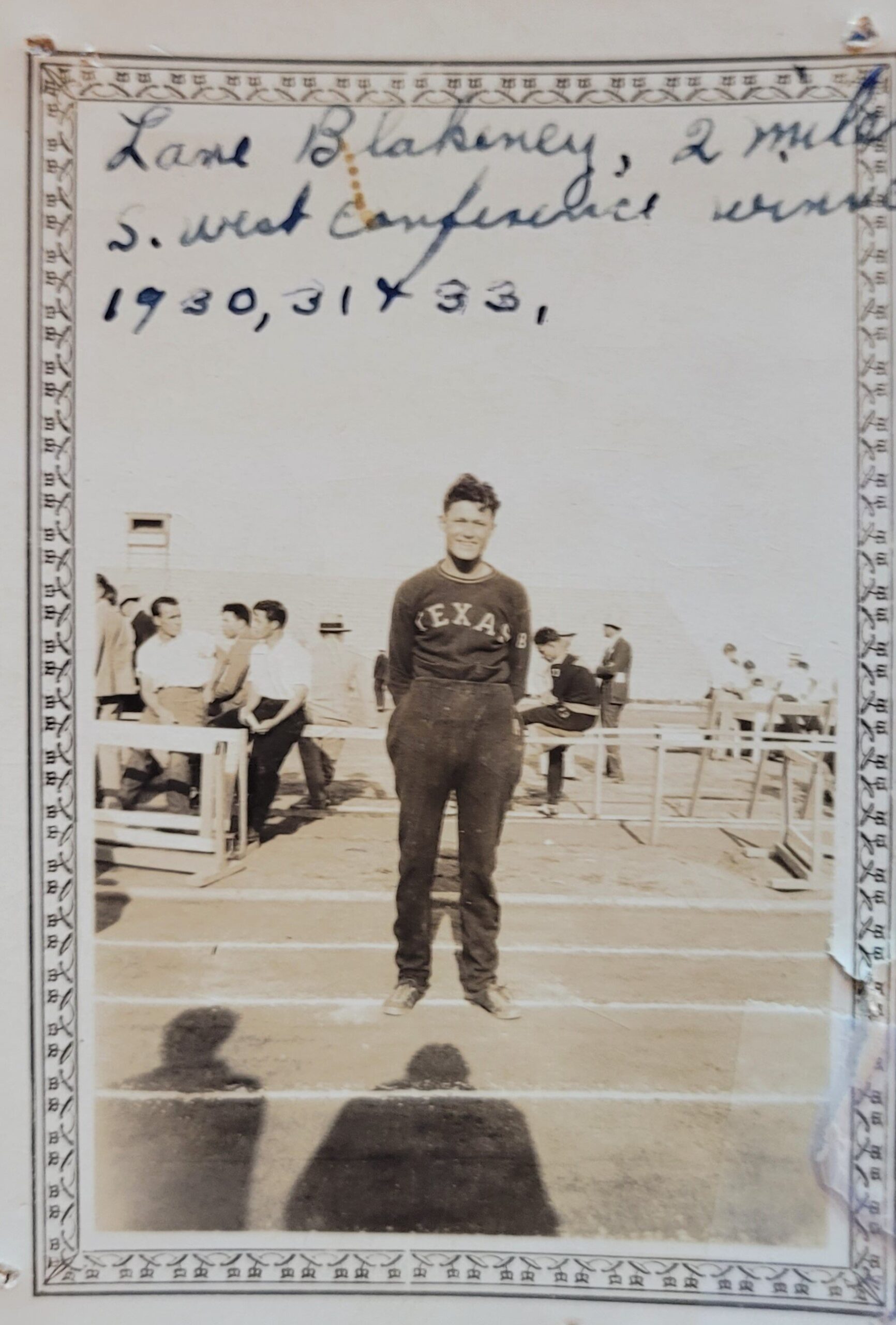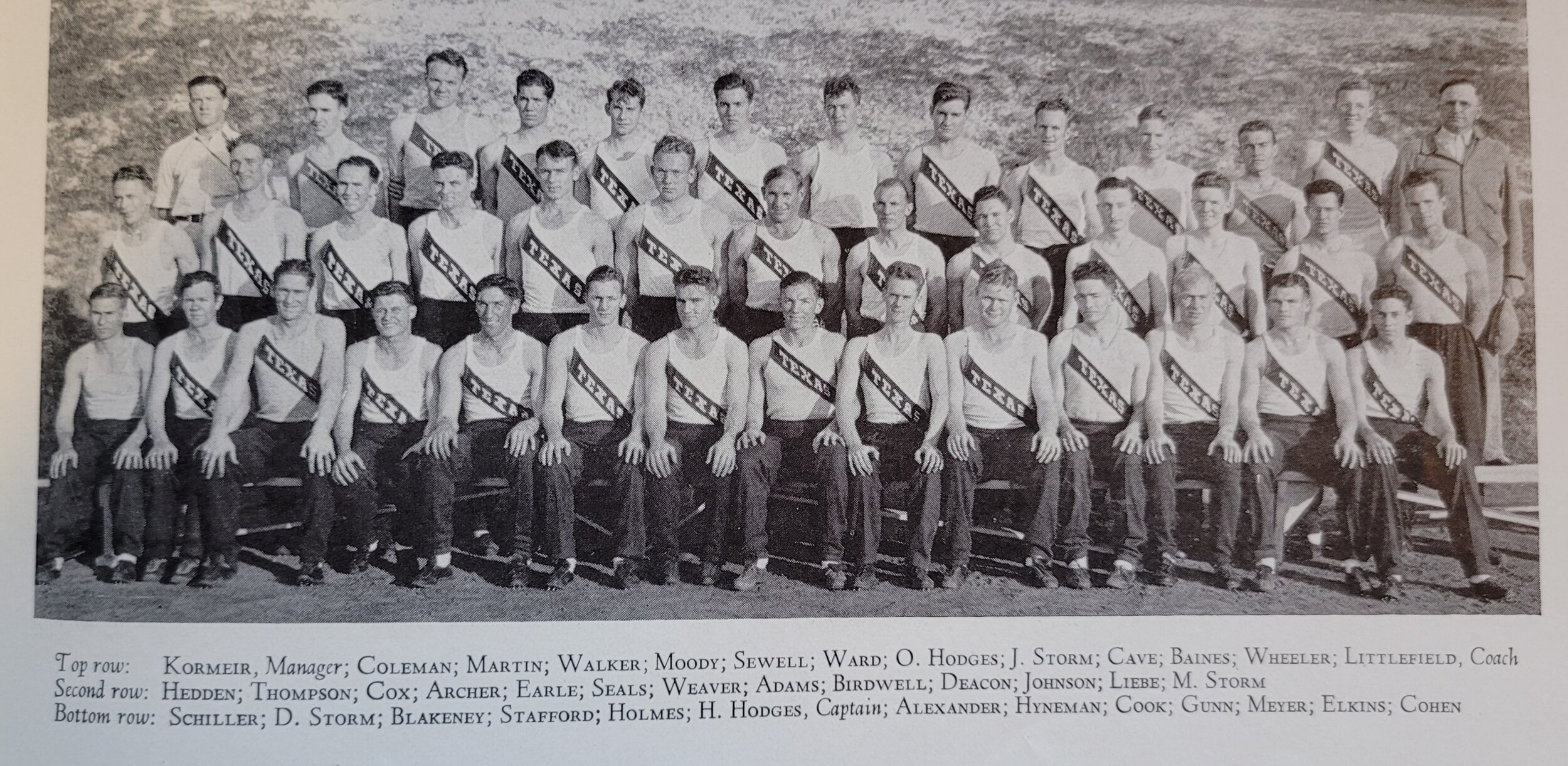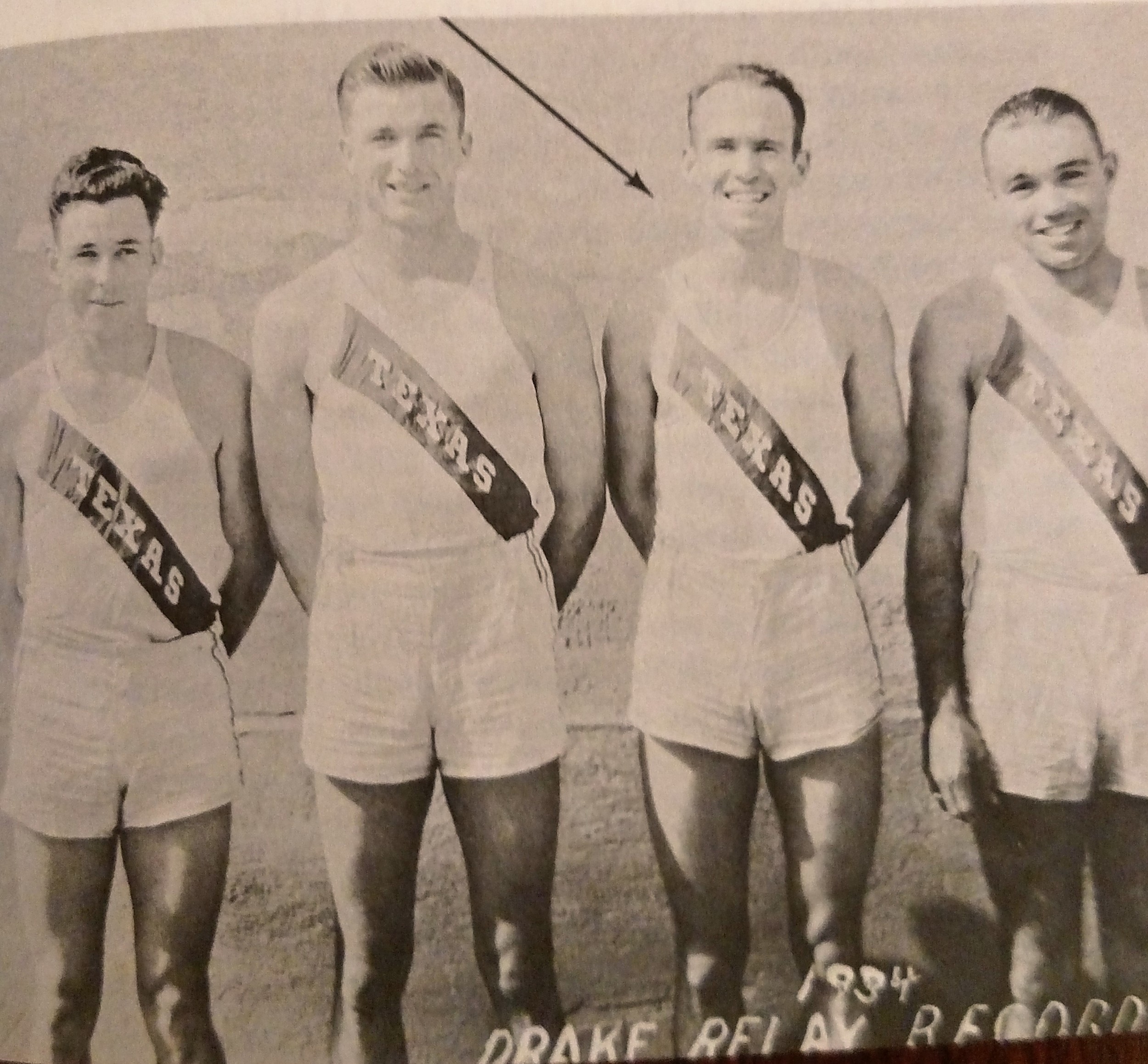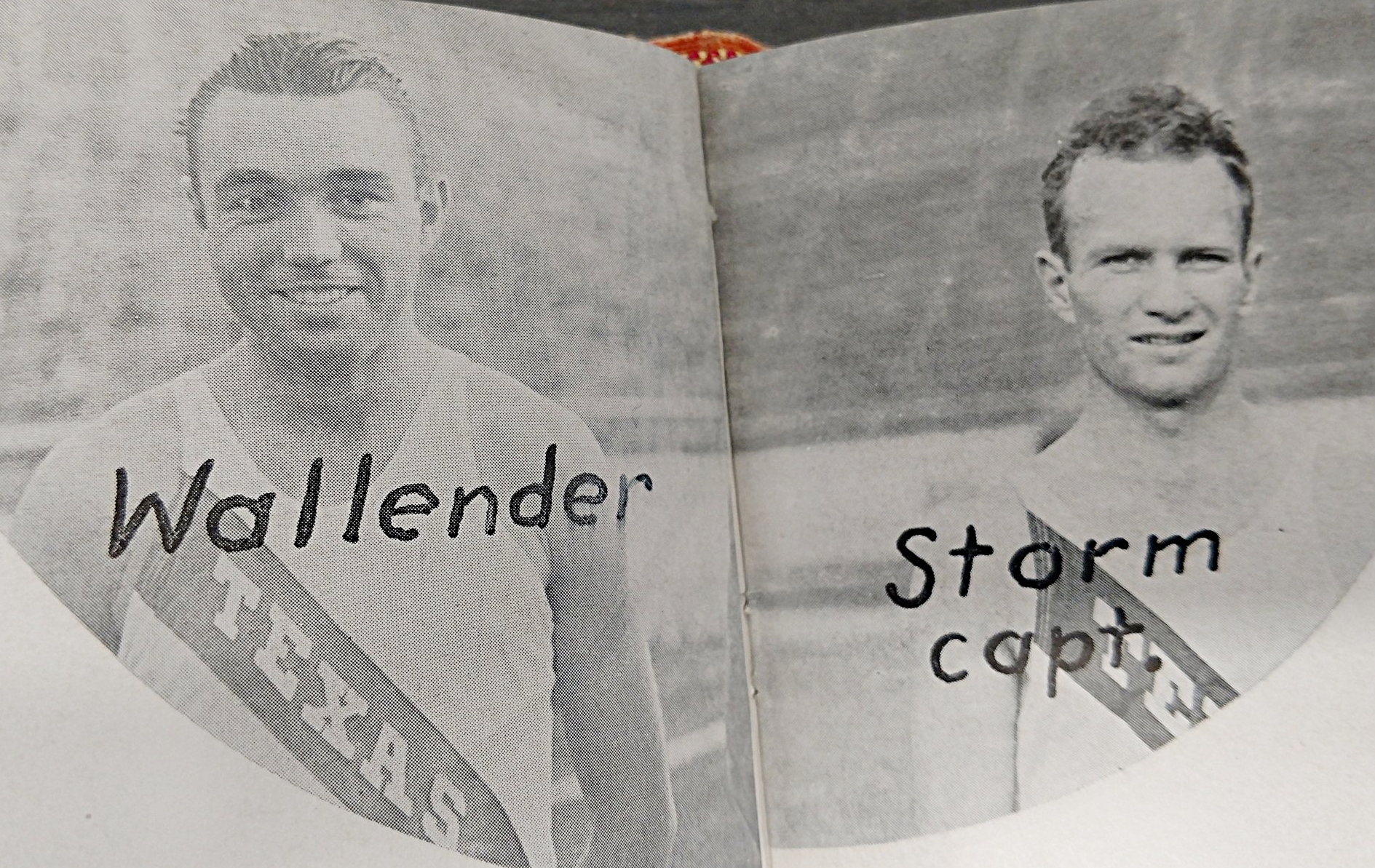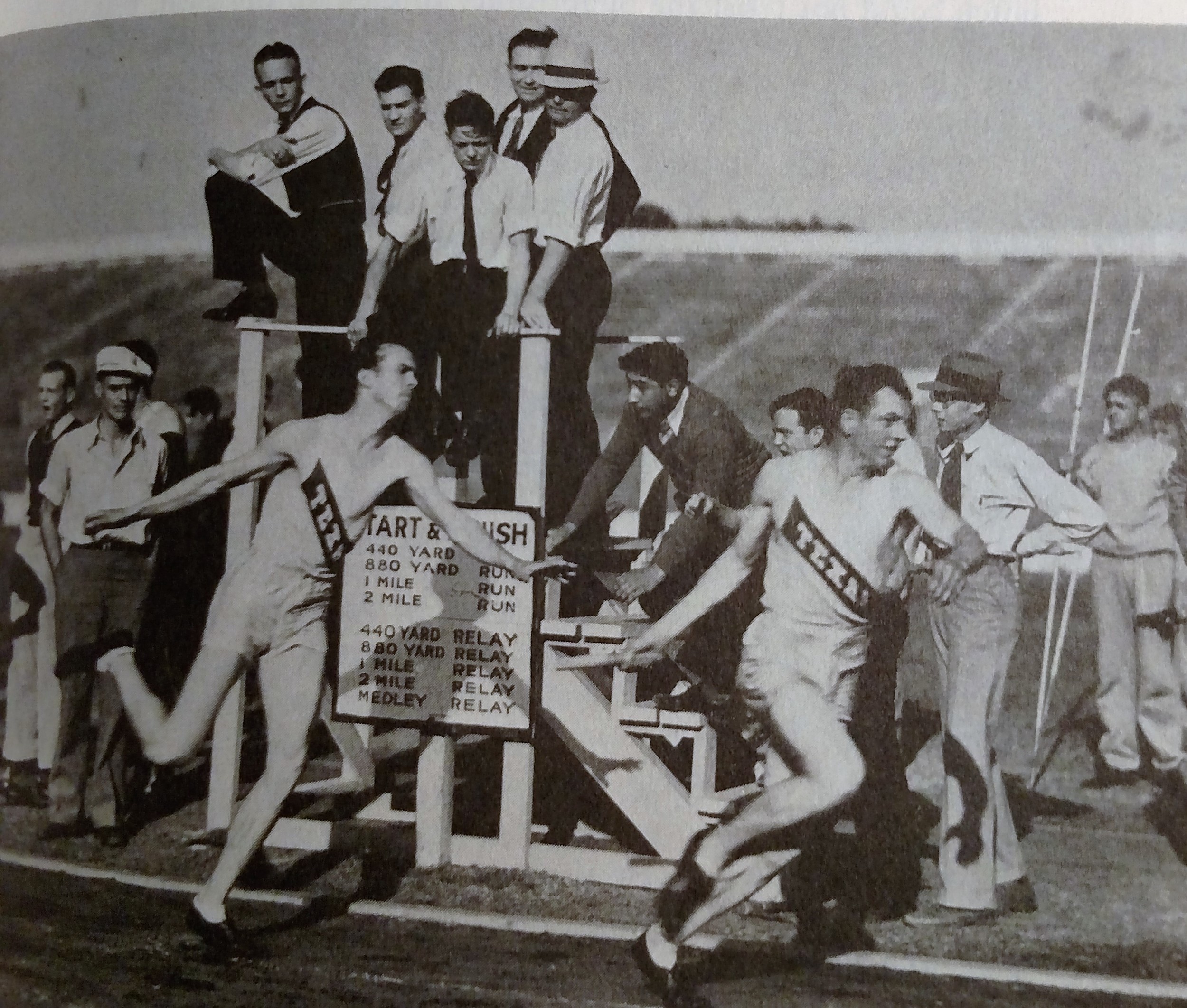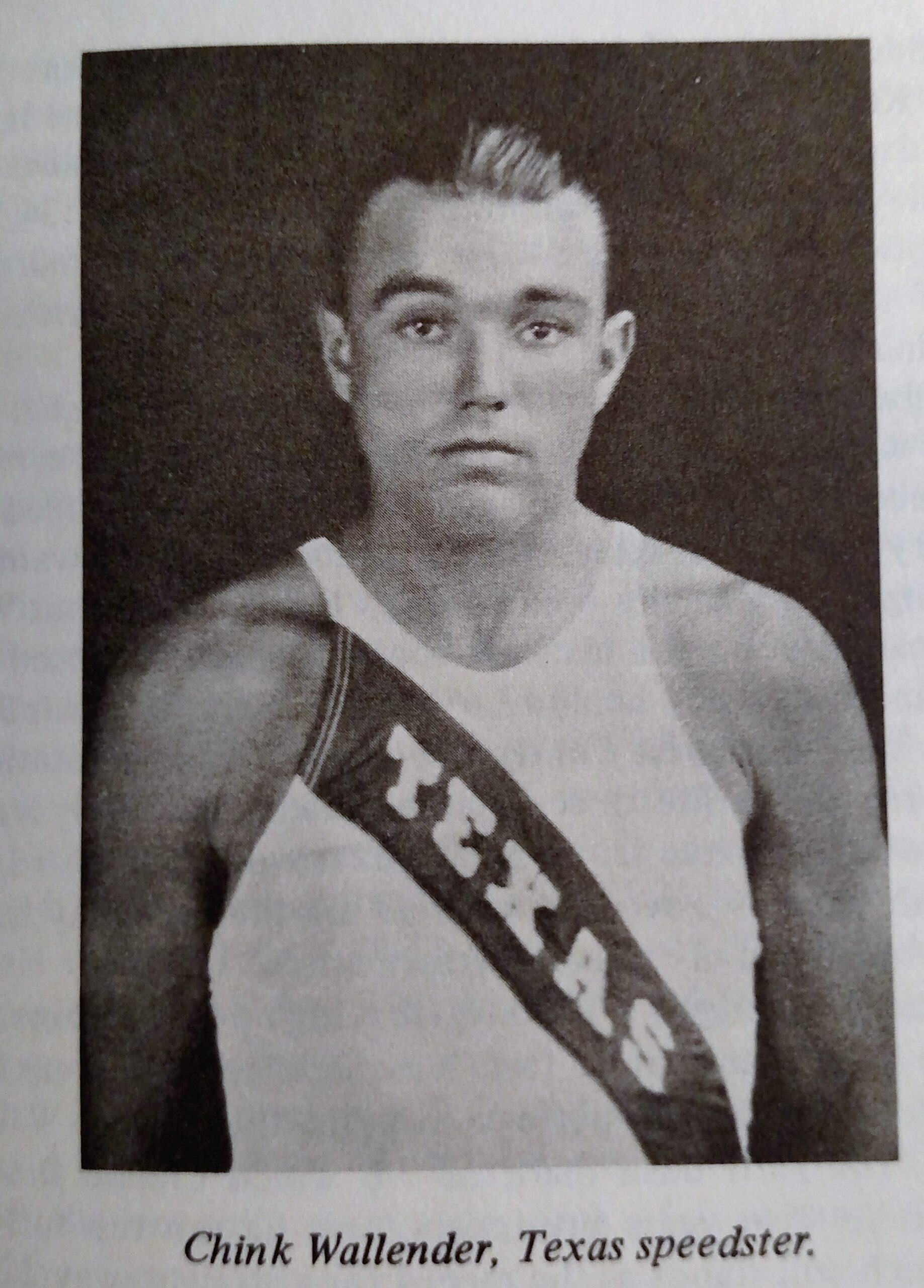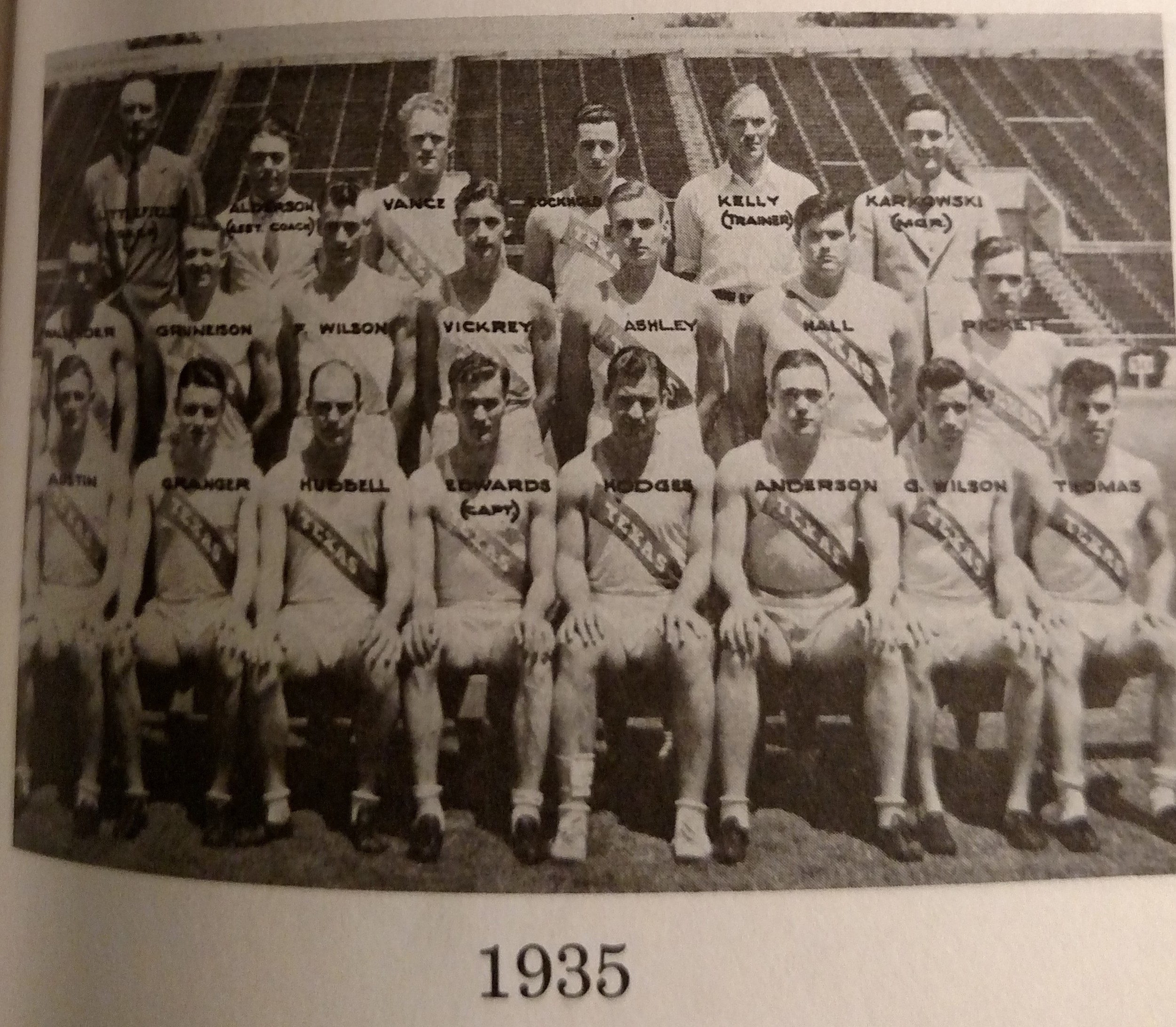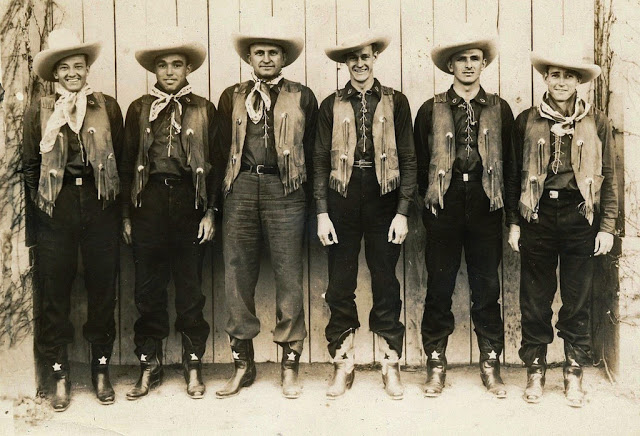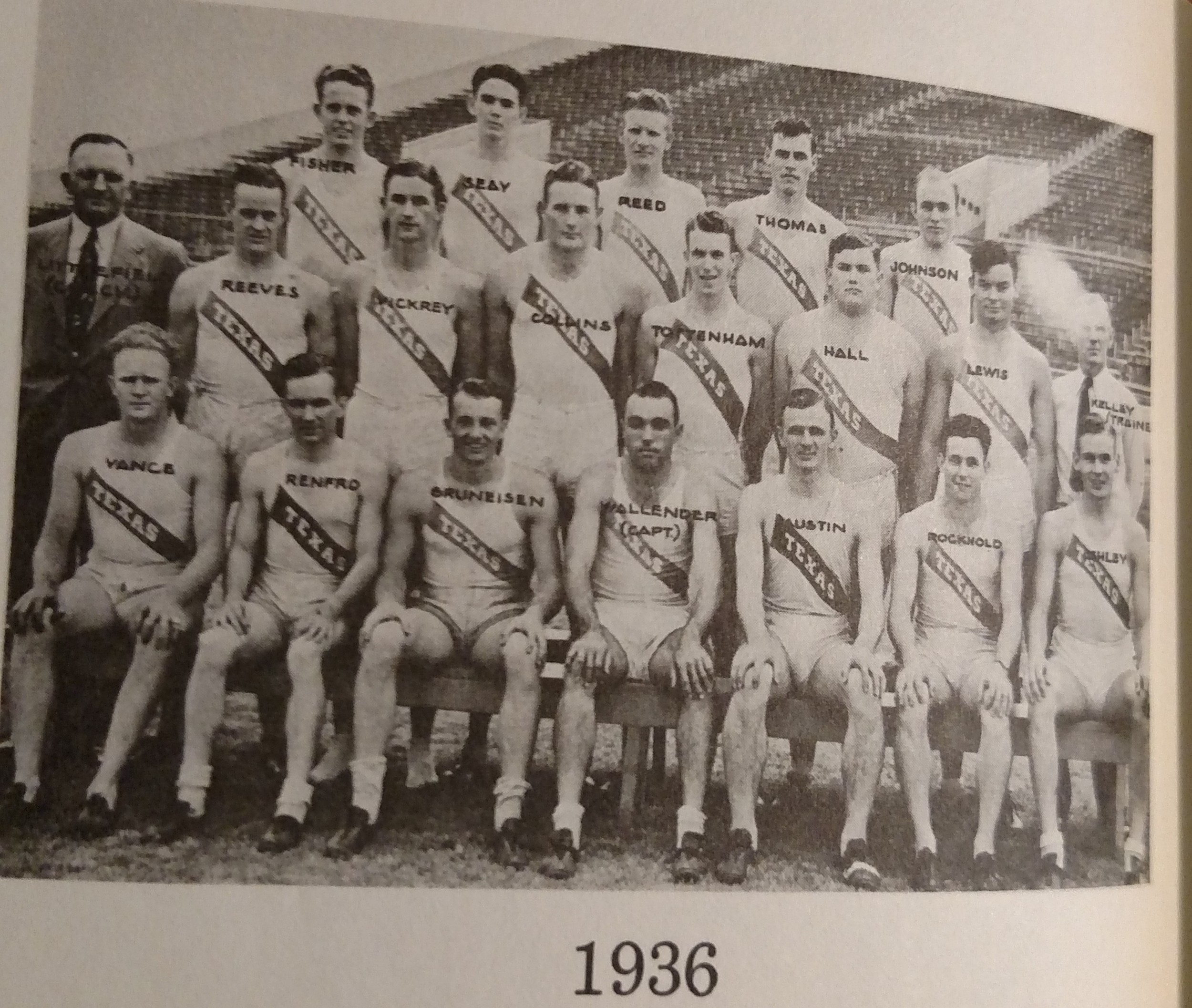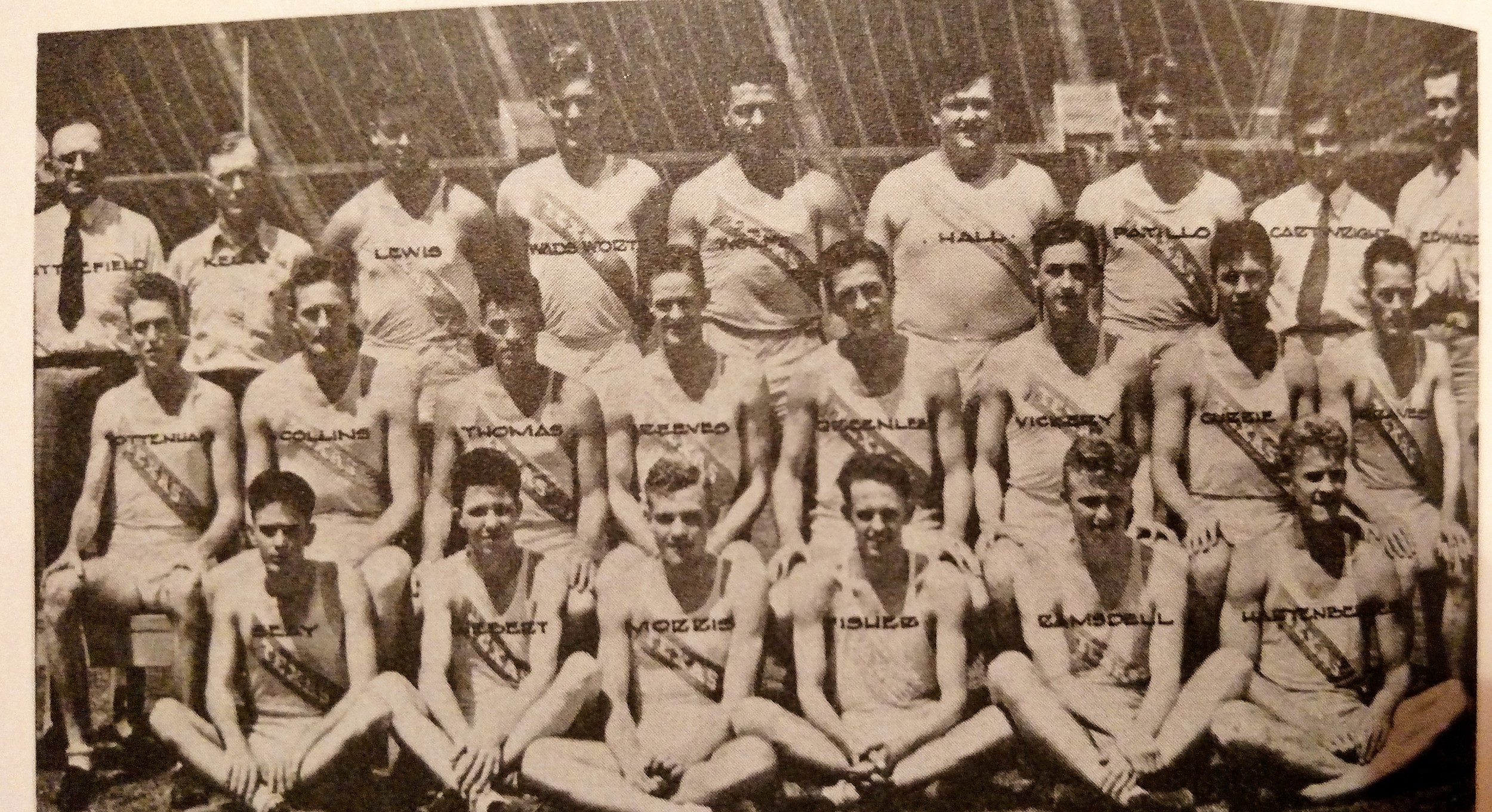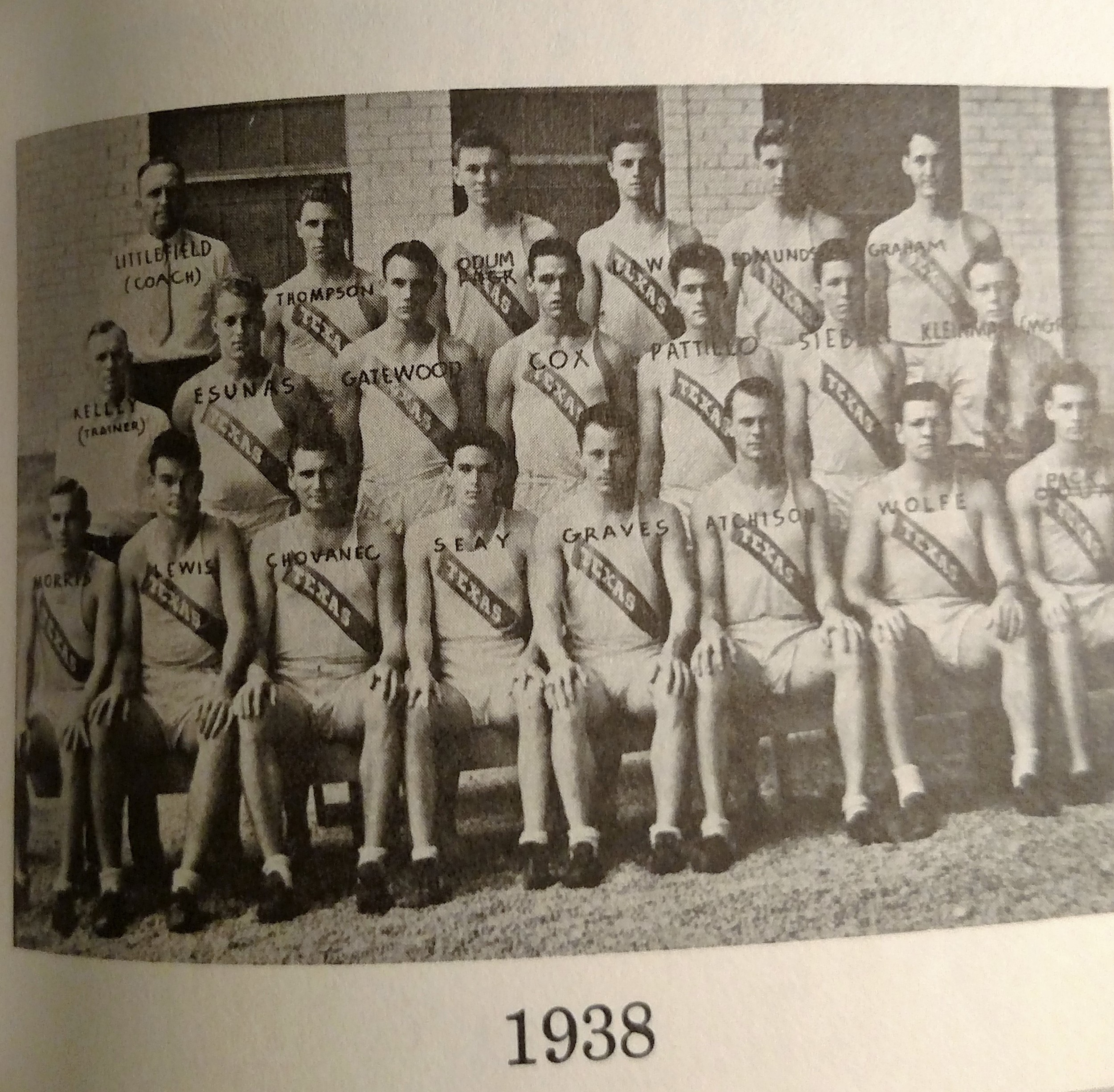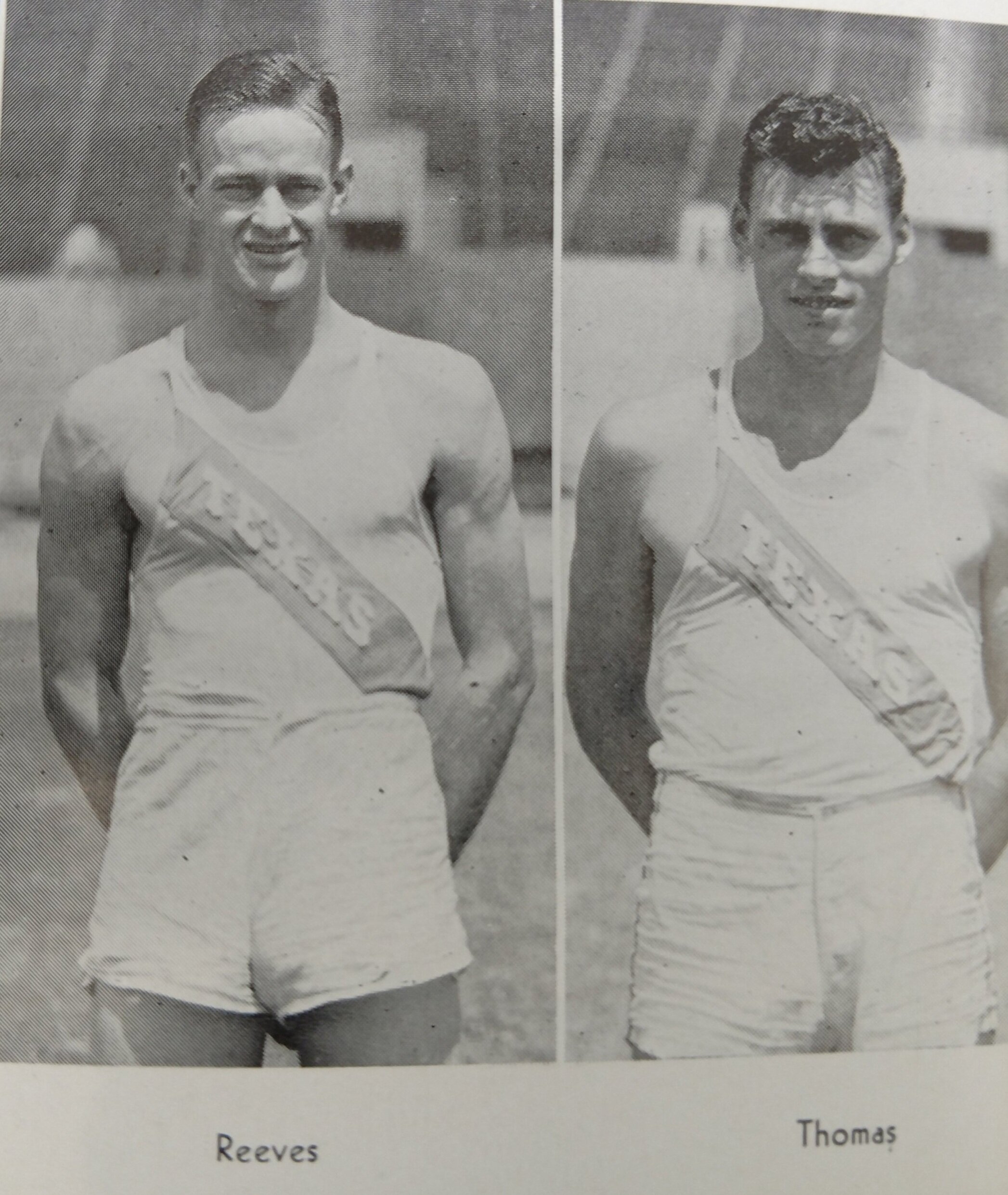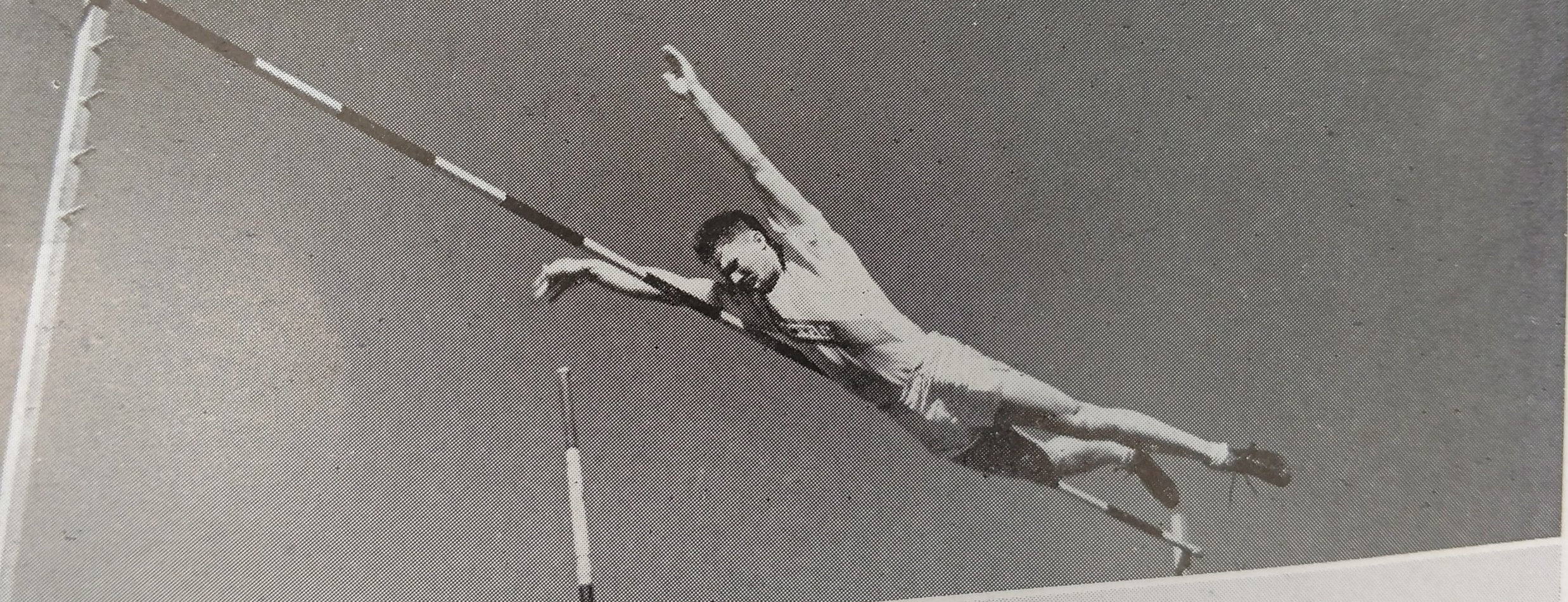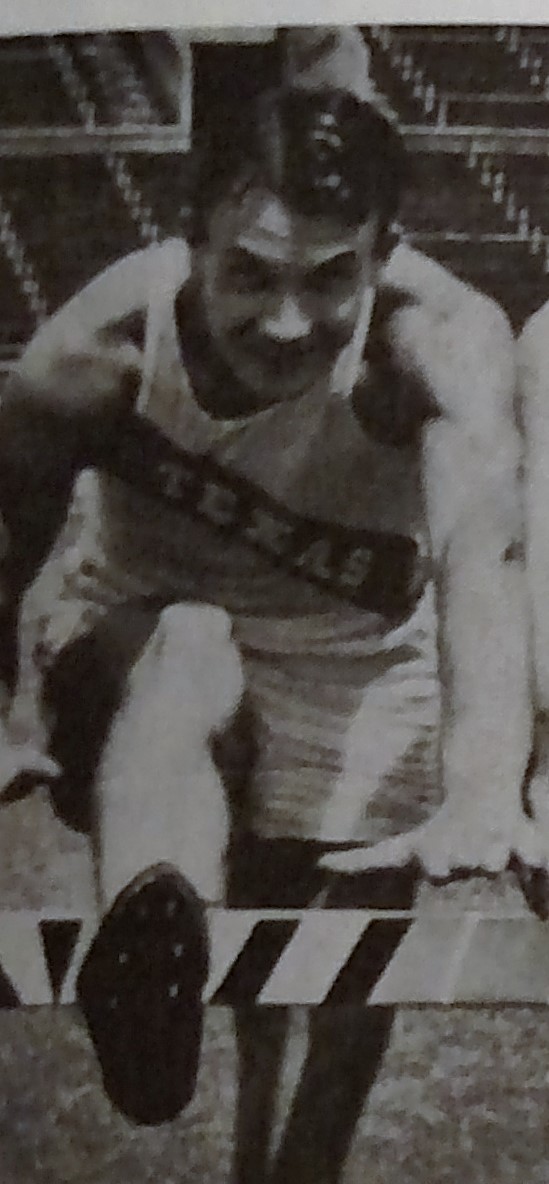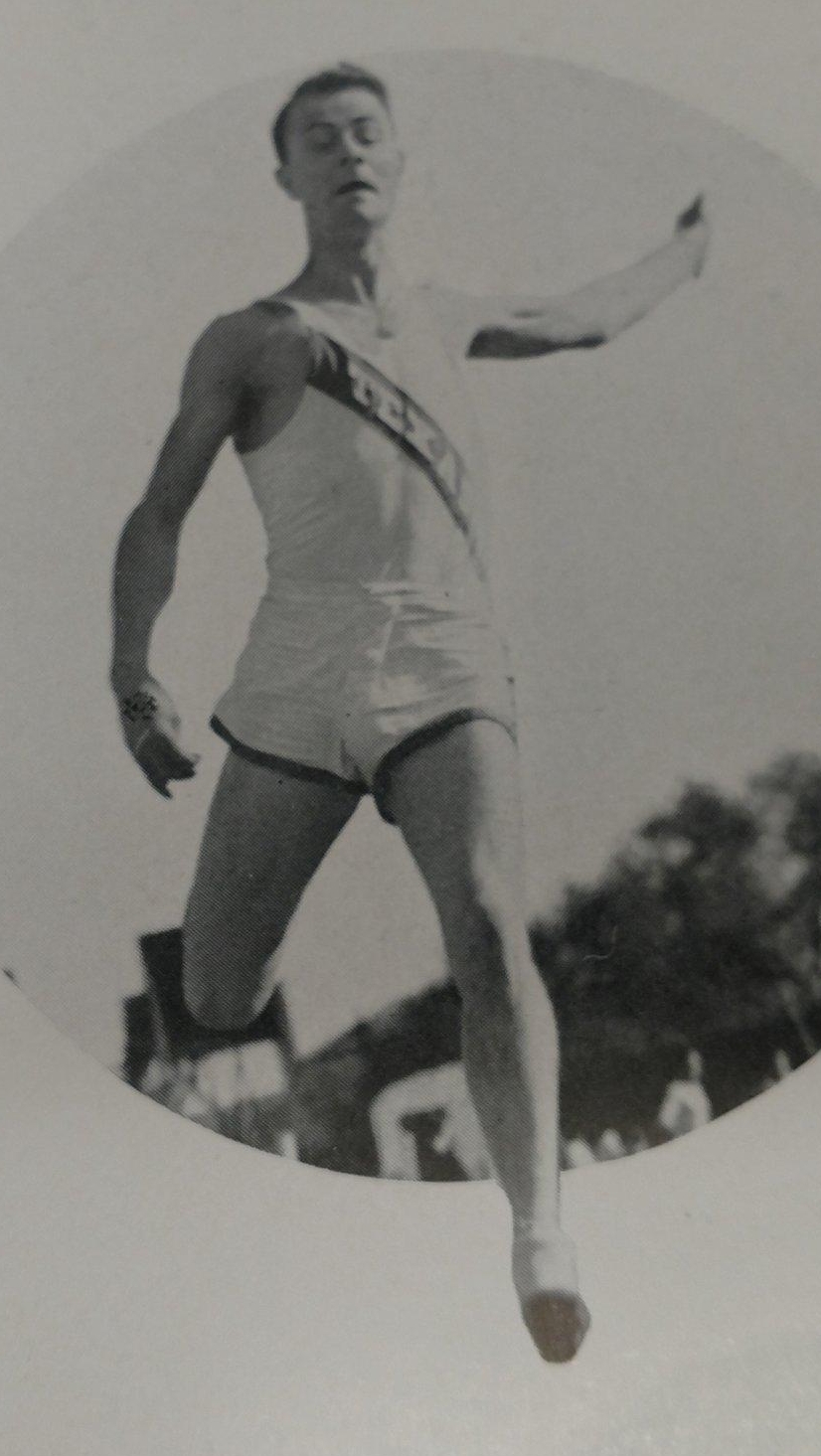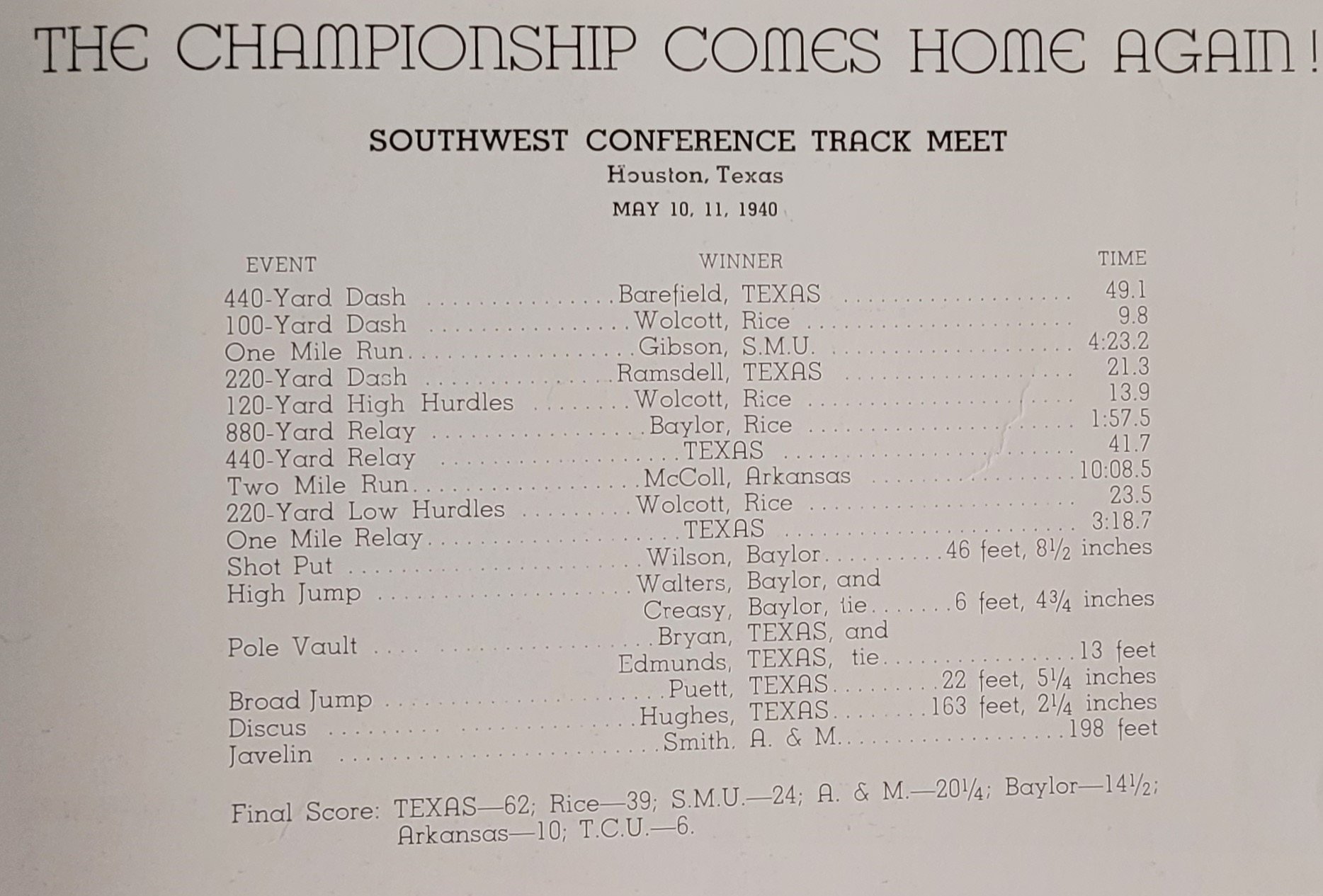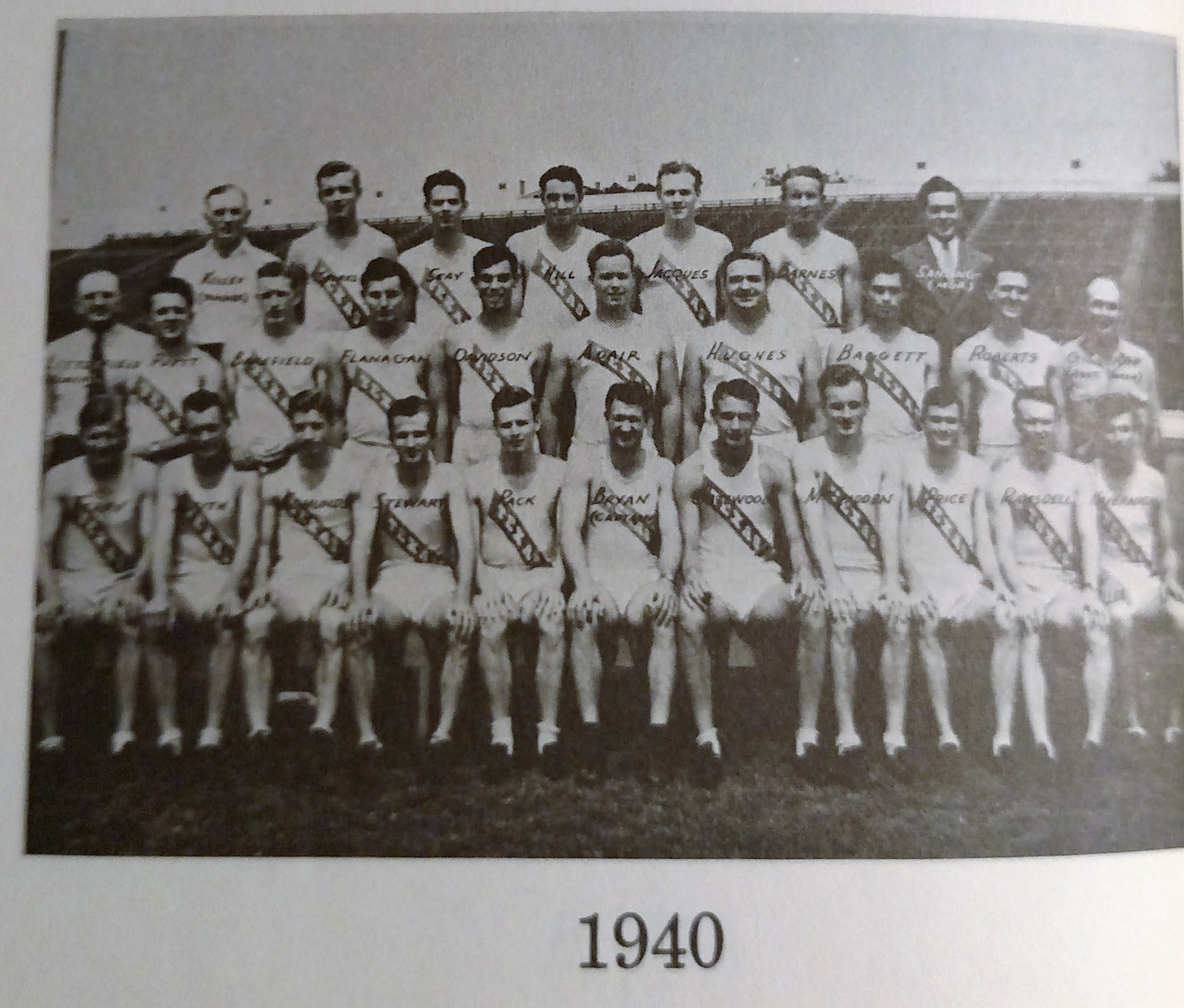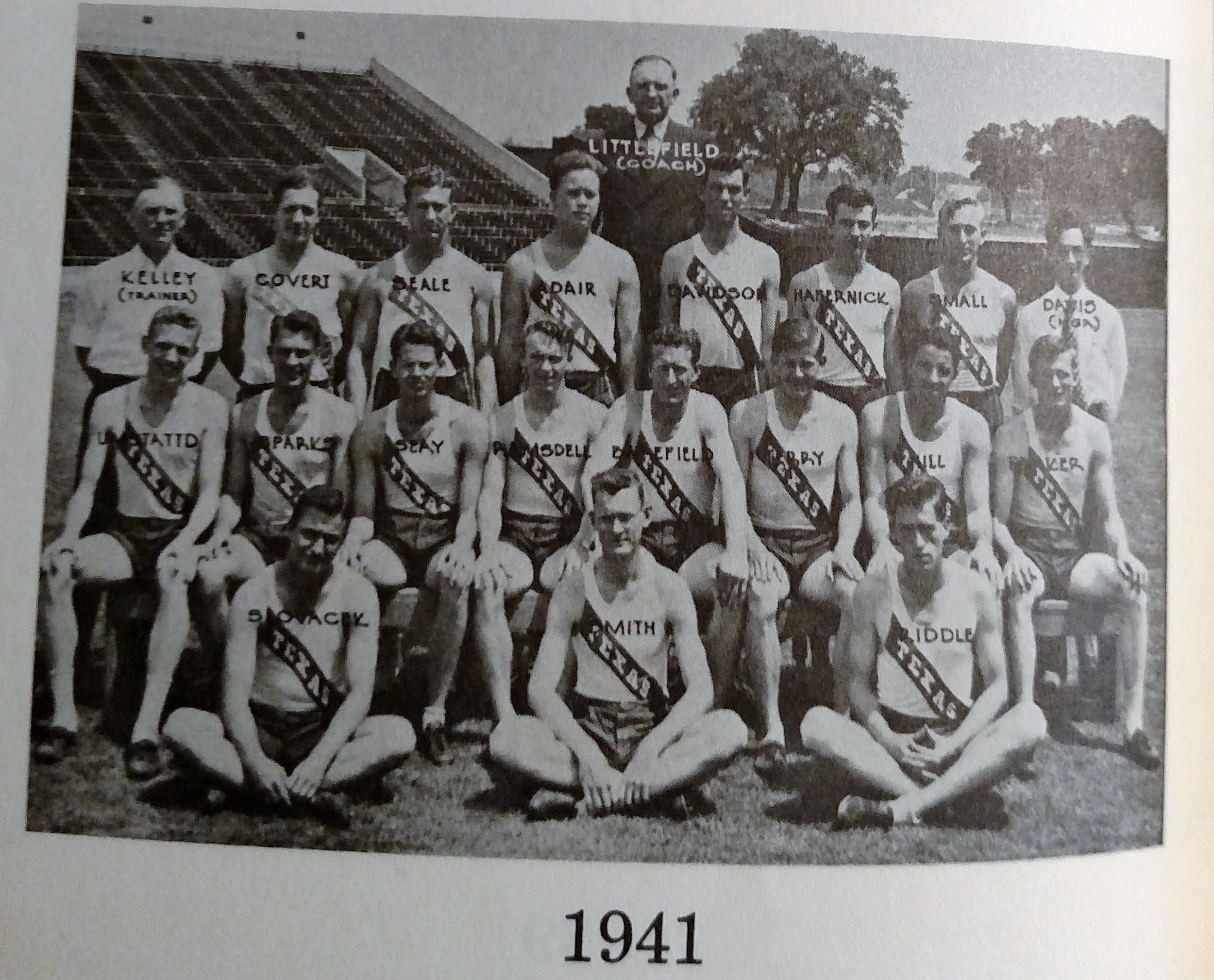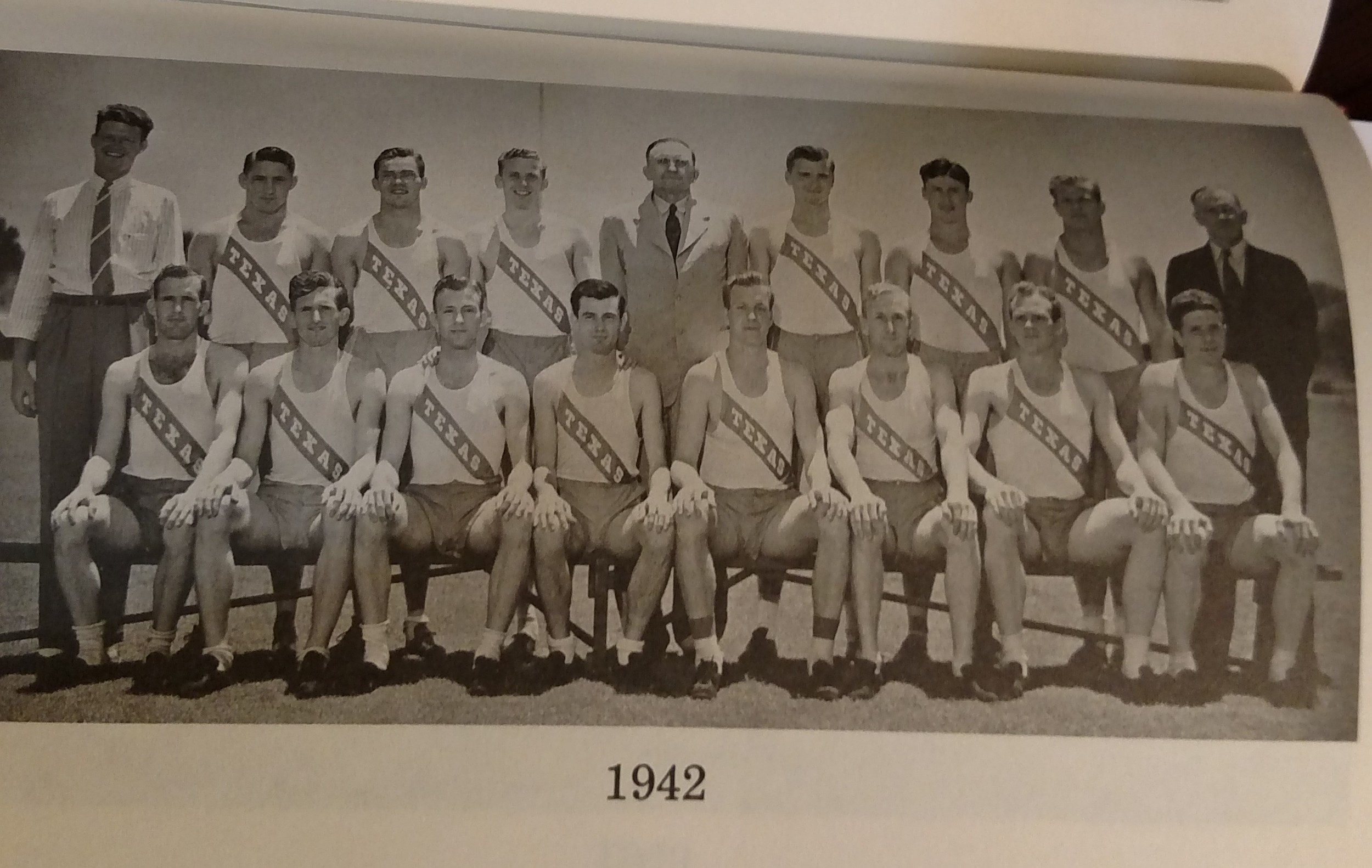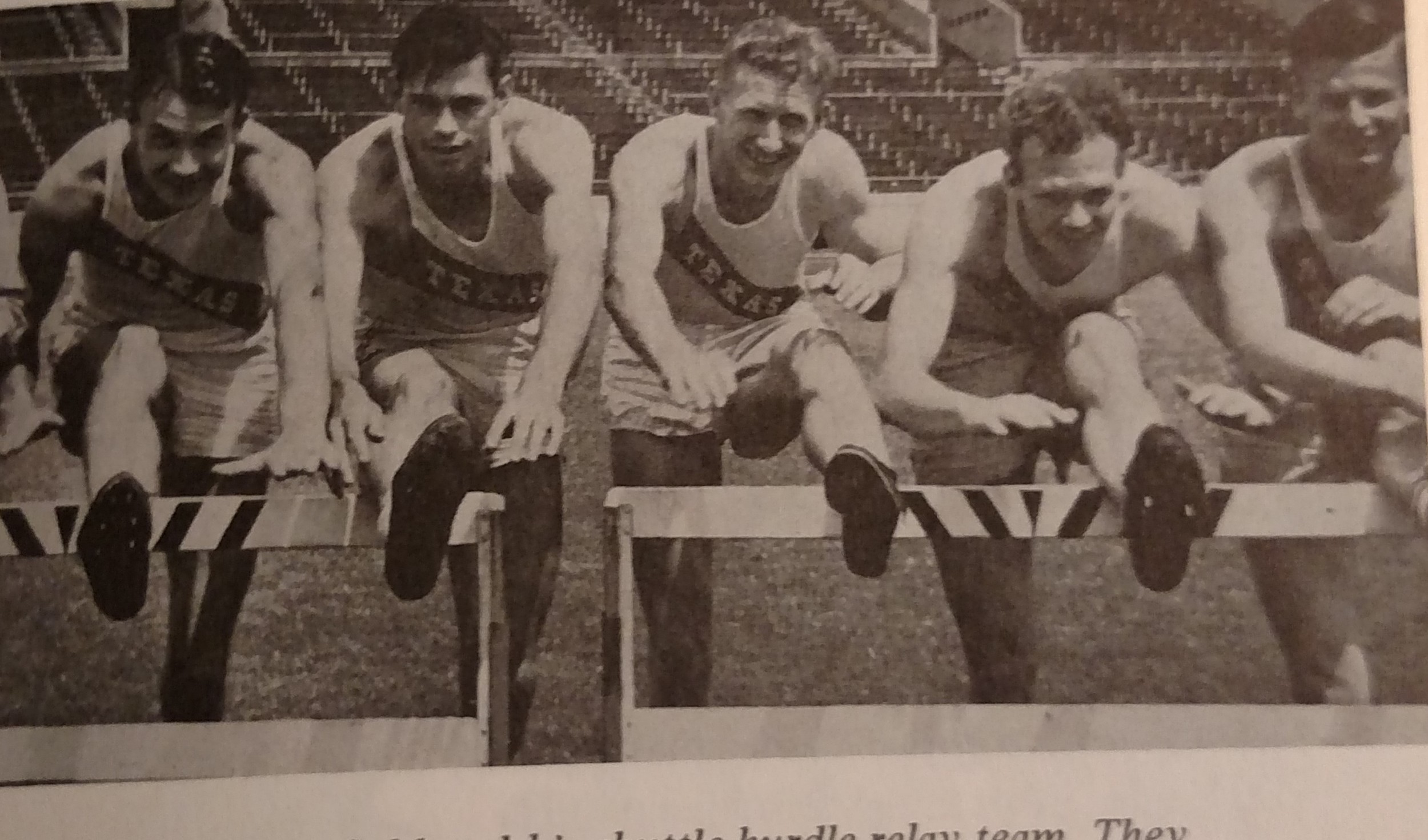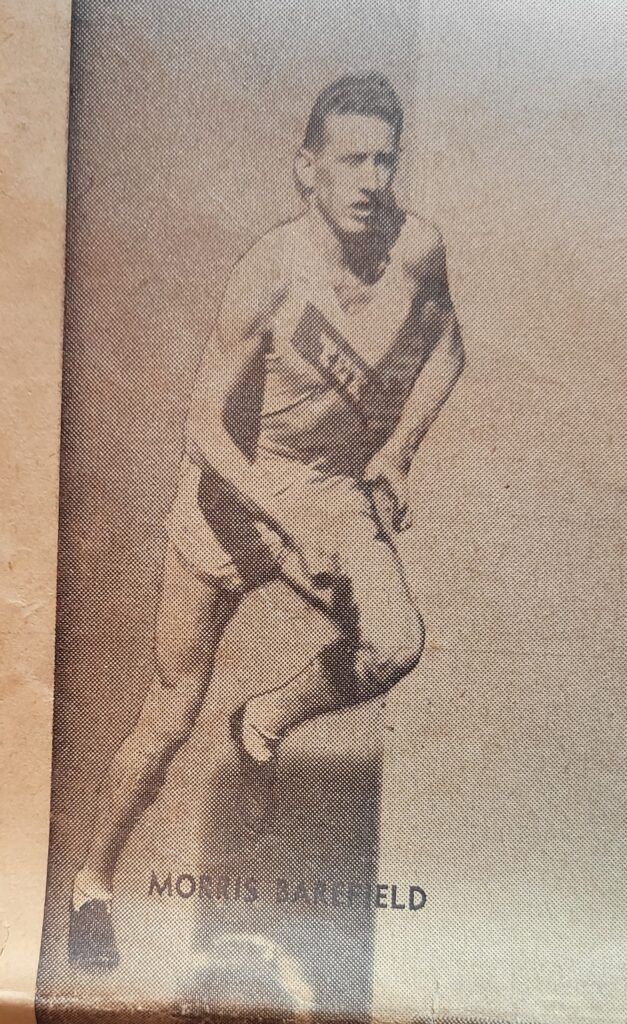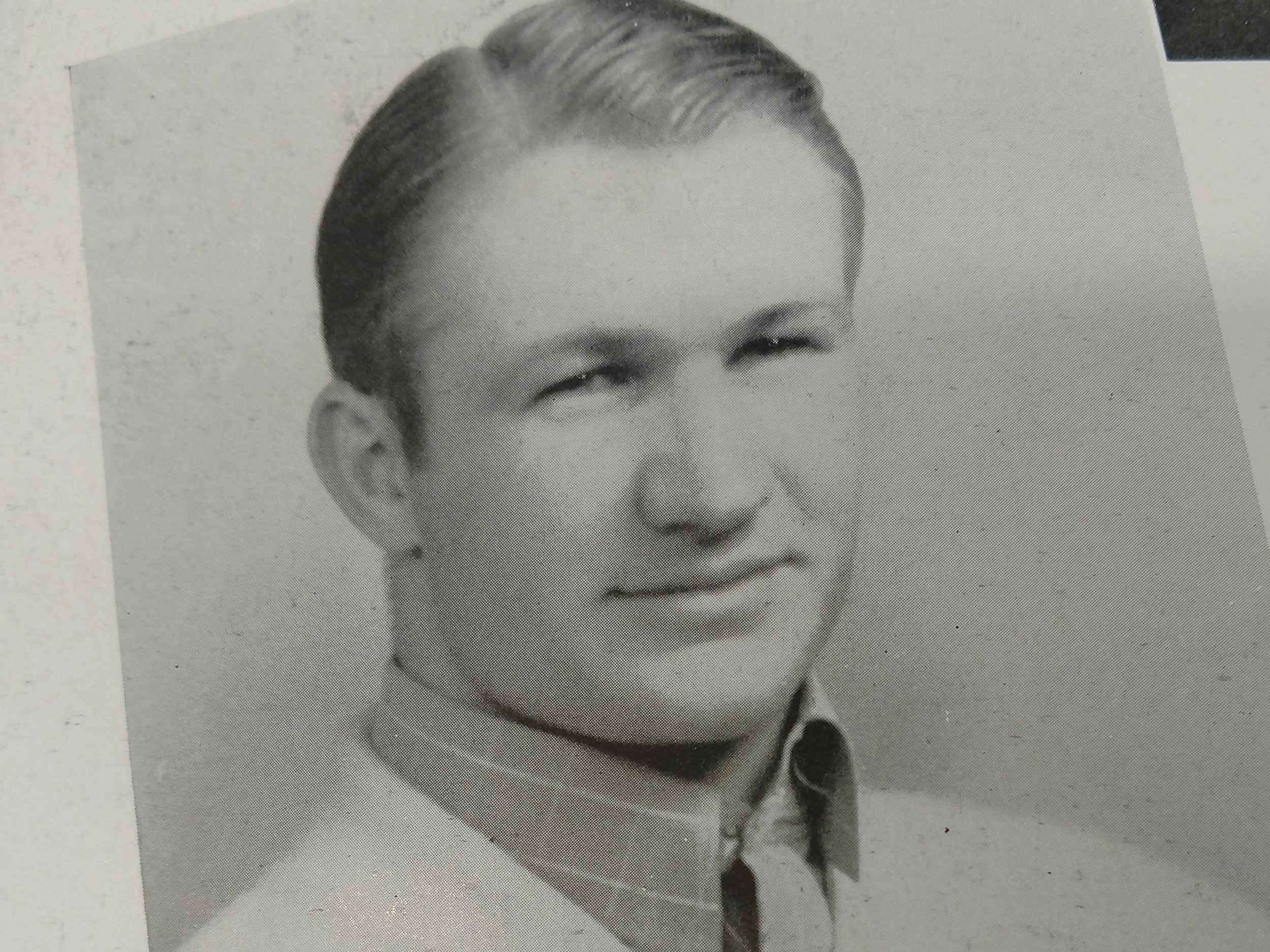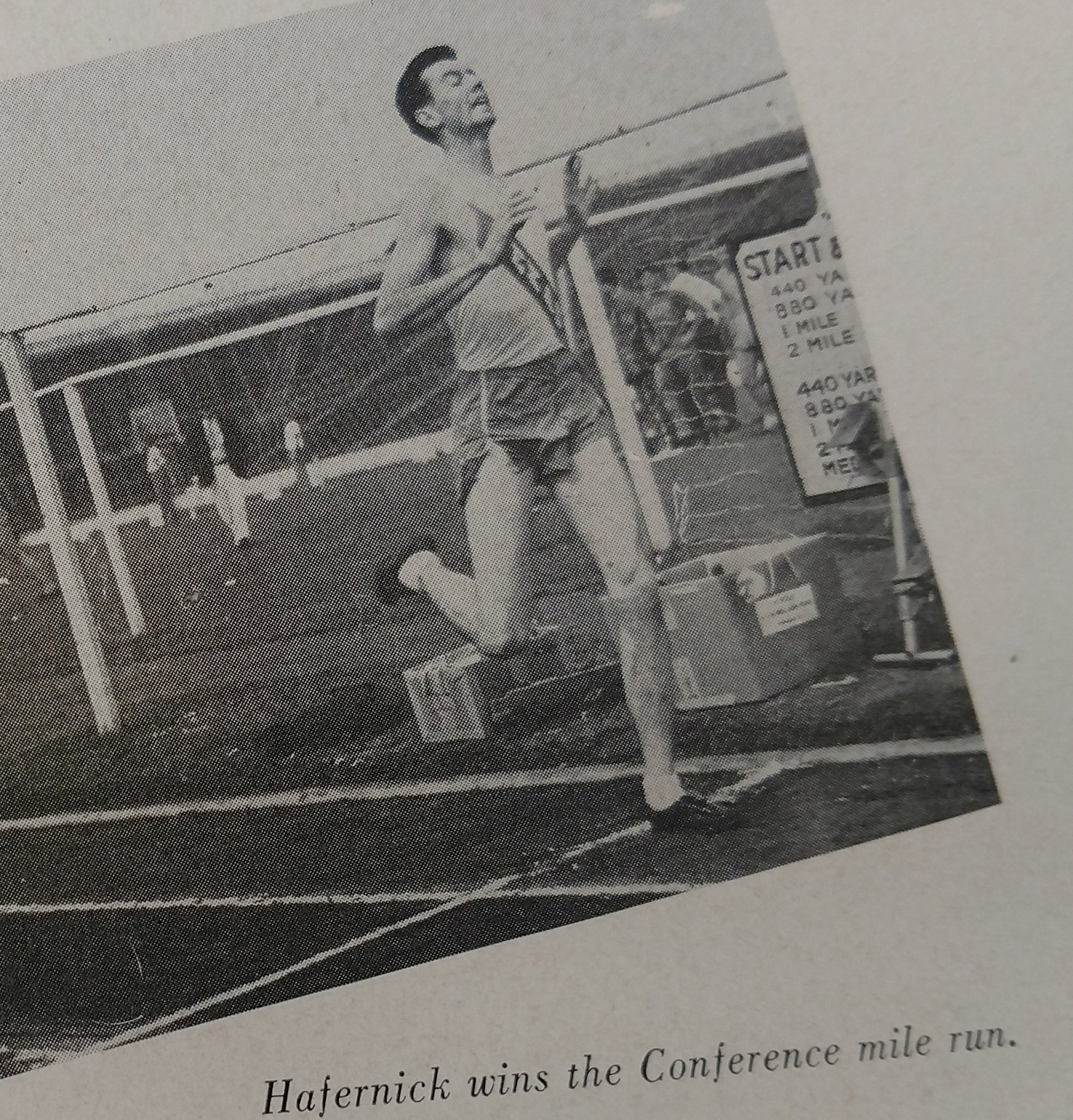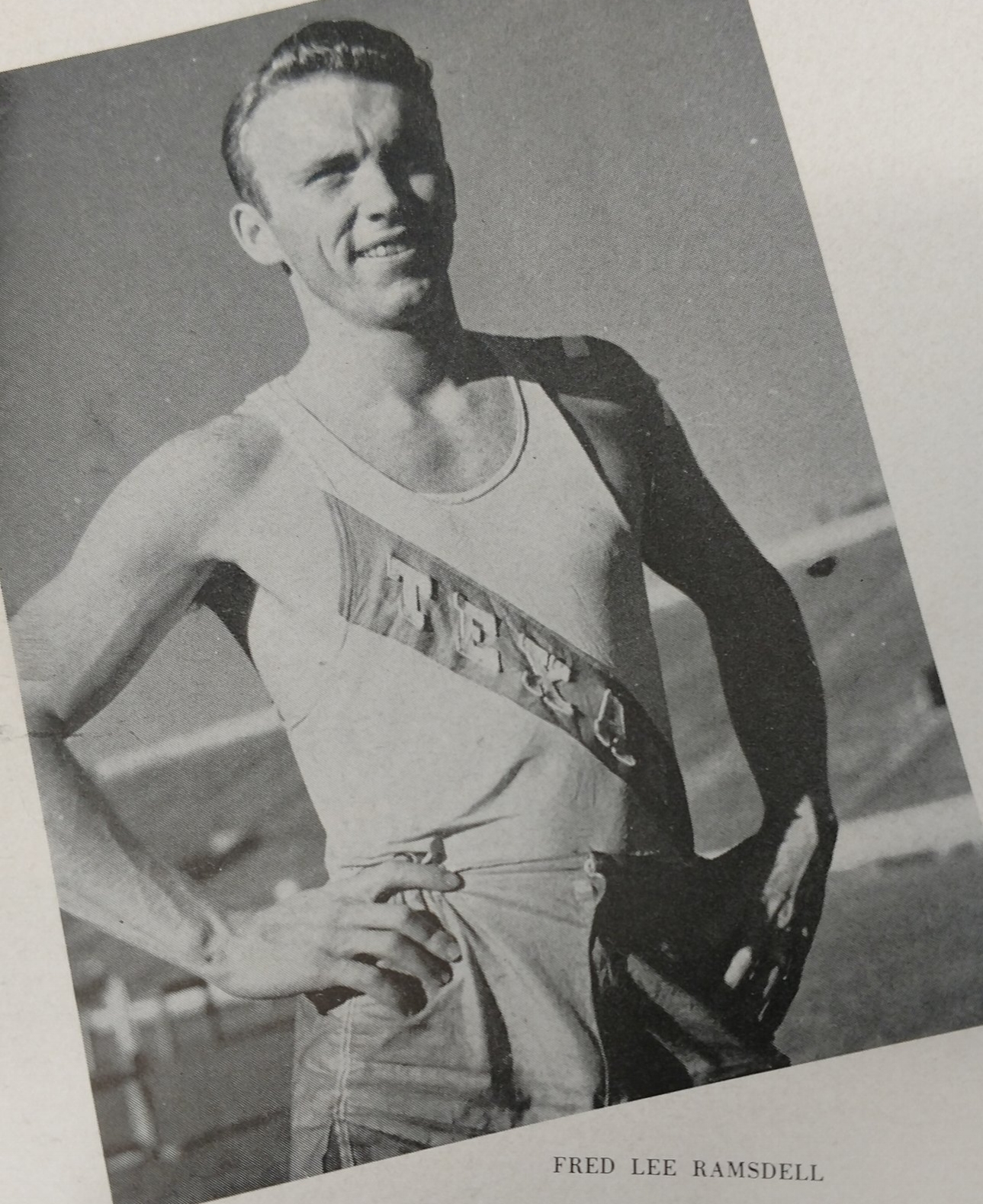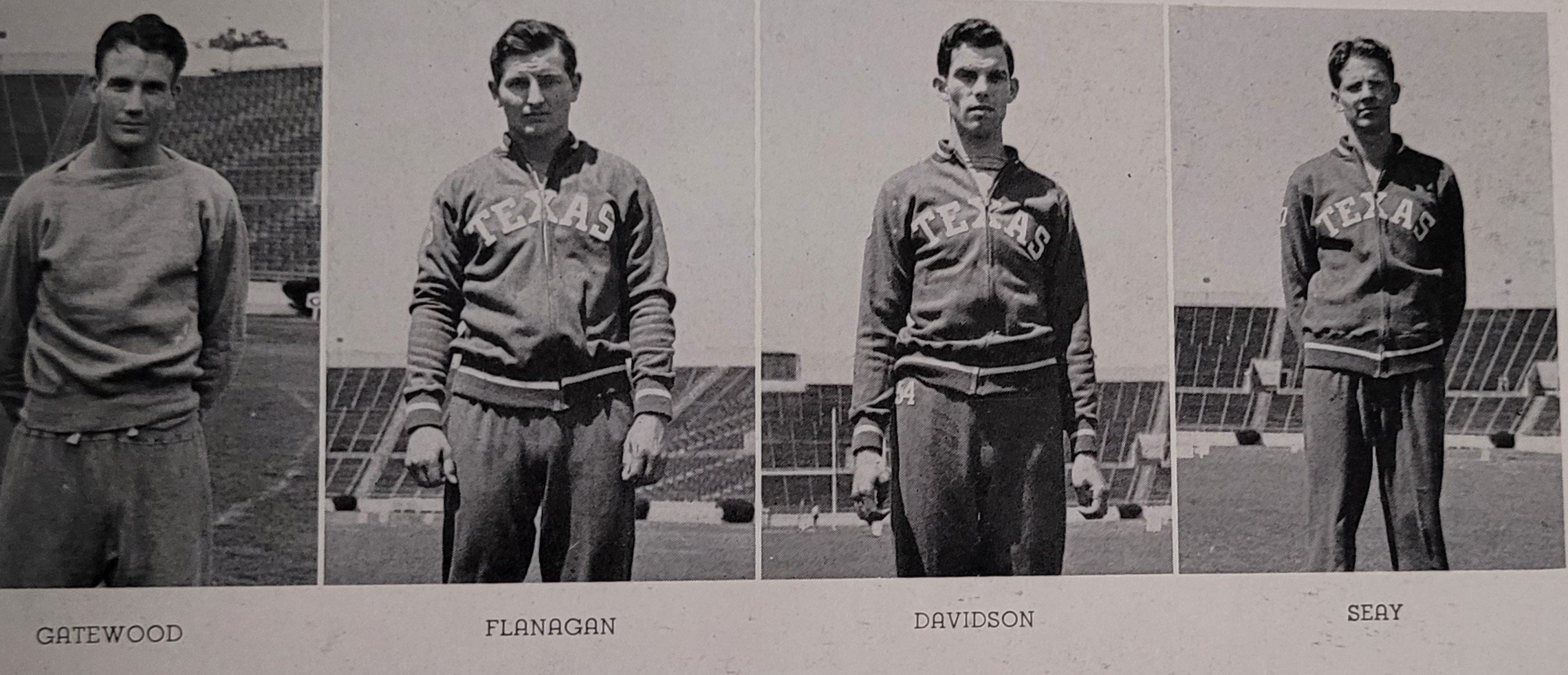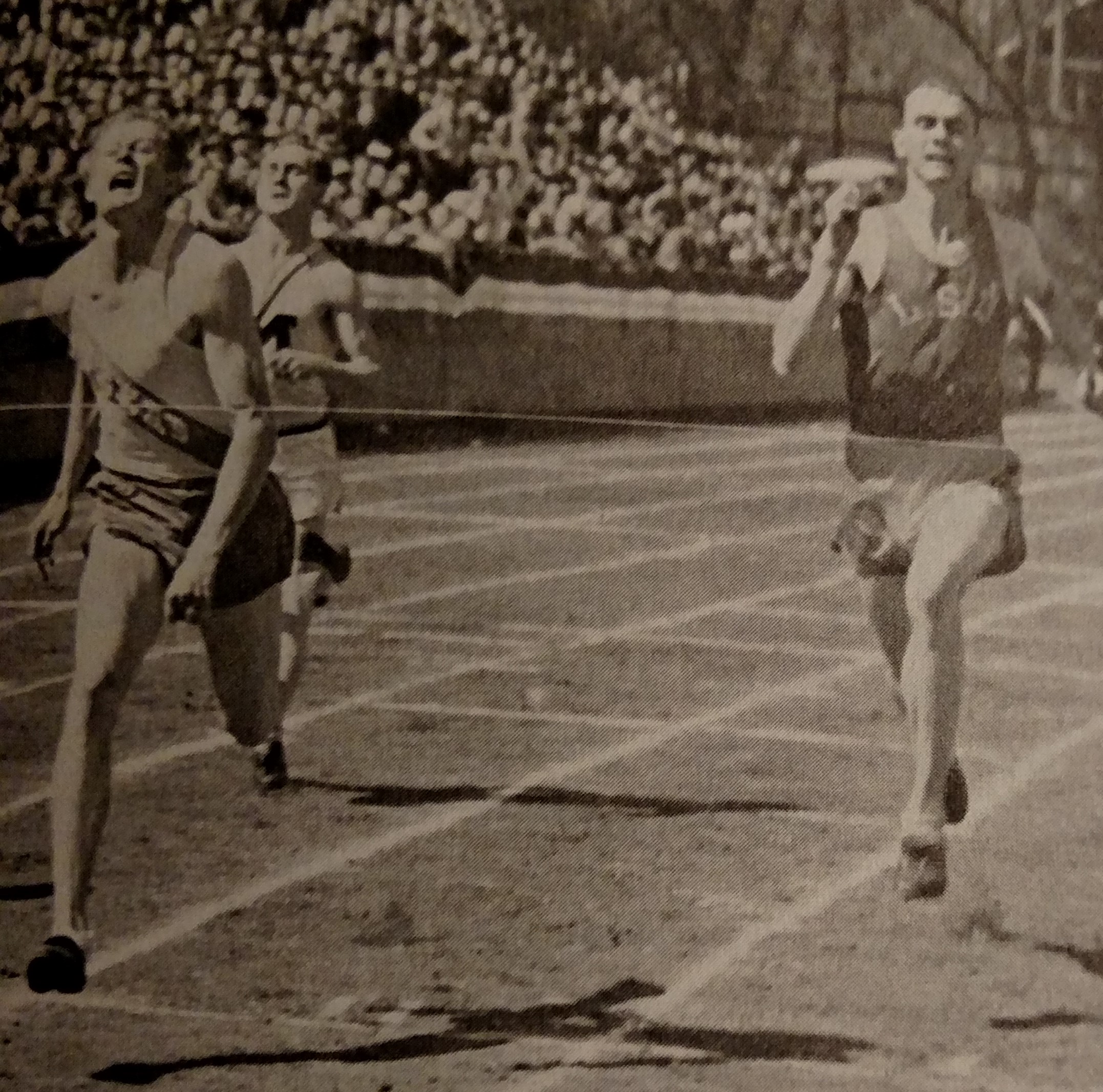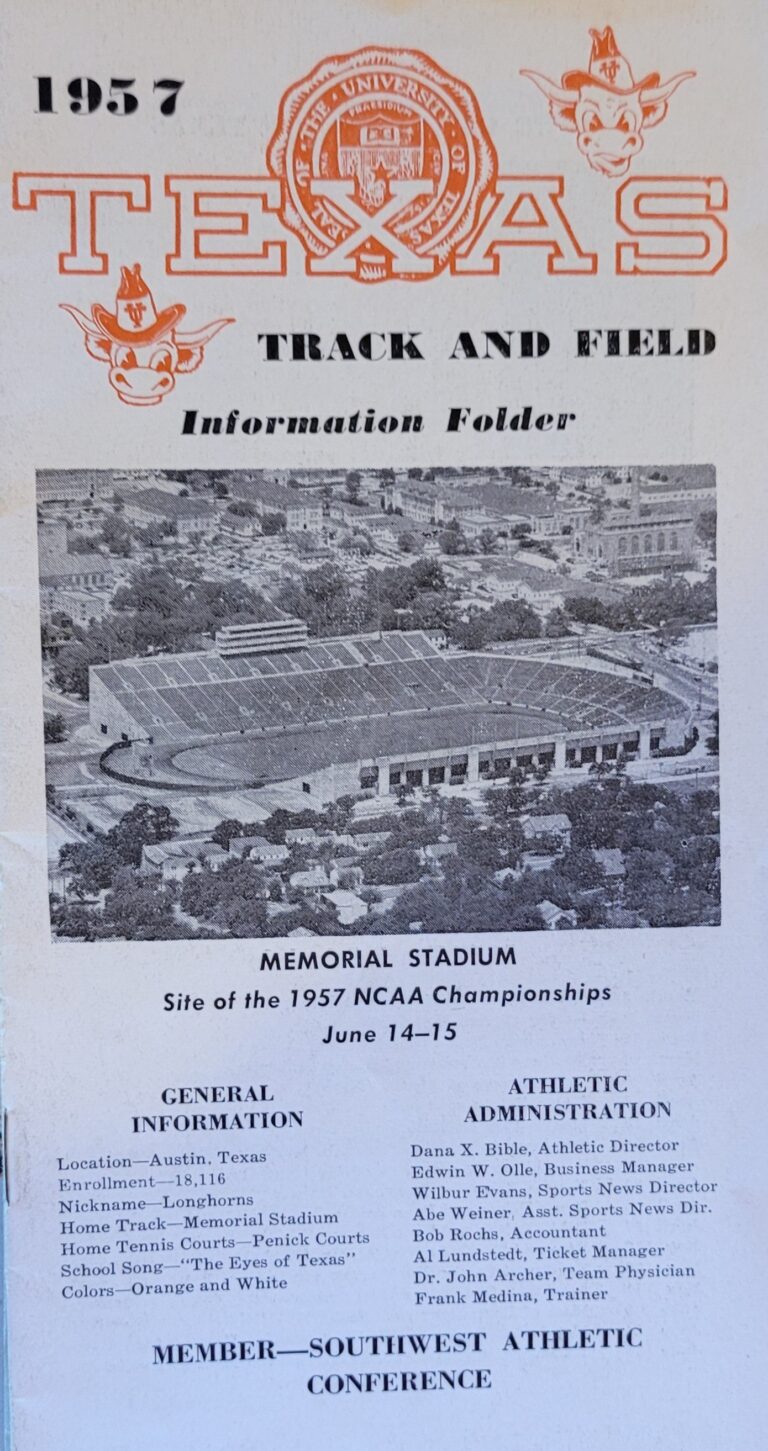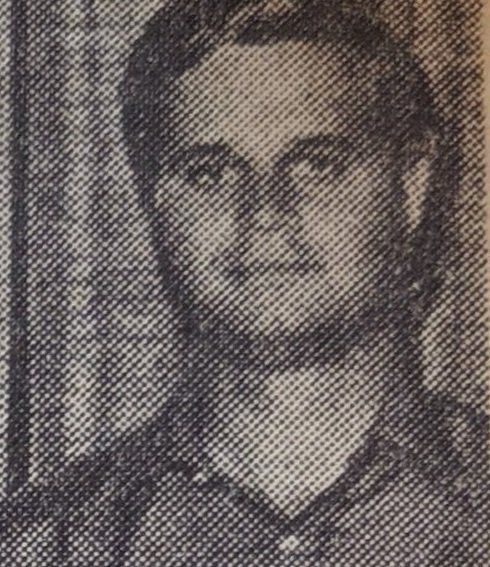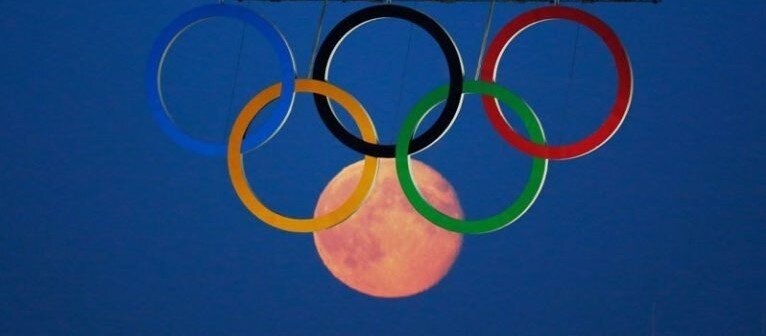1921-1941 Clyde Littlefield track
Track is the only sport in which athletes reveal their character to the fans as the event unfolds. In the picture below, Preston Davis (left) and Richard Romo (right) mirror the internal struggle that occurs thousands of times for UT athletes as they write their story in the History of U.T. Track.
1920 COACH W. J. JUNEAU
O.U. leaves the SWC
As a young head coach
Coach Clyde Littlefield makes track history
Head Coach Clyde Littlefield – 1921-1961
Some of the information for the History of Longhorn track was found in a book titled Champions written by Longhorn track star Carlton Stowers and newspaper man Wilbur Evans/
Blue font denotes results at the national meet.
UT administration did not allow Blacks to use the track “facilities” during the Littlefield years – 1921-1961.
Littlefield revolutionized the relay baton exchange that resulted in record relay times. His teams won more relay championships than any other school in the country, breaking 4 world records and 5 national records. Along the way, he coached 11 individual national champions, 13 All Americans, and 3 Olympians.
A link to the Stark Center archives about Clyde Littlefield follows
http://www.tiki-toki.com/timeline/entry/326908/Clyde-Littlefield-The-life-of-a-Texas-legend/
Clyde Littlefield was the greatest all-around athlete in UT history. From 1912 -1915 he led the football team, basketball team, and track team. His freshman year in the track, he led the team in scoring. Clyde could throw a ball 75 yards, so instead of punting, the rules permitted a 4th down pass out of bounds to count as a punt.
Clyde Littlefield says, “winning was never the whole thing with me; the development of young men was important-and rewarding.” He said, “Athletics, in addition to helping the physical development of the body, teach young men the value of working together and helping one another out.” ” It gives me great pride to know that young men I’ve coached have gone on to become………..”
Texas Relays start as a men’s only by Clyde Littlefield and Theo Bellmont. It is now the second-largest track meet in the country.
Clyde Littlefield is the head track & field coach at The University of Texas from 1920 to 1961 and its football coach from 1927 to 1933. He is one of the greatest track coaches in NCAA history. In his 41 years at Texas, his teams won 25 Southwest Conference championships and finished 2nd in 14 other SWC meets.
His football coaching tenure is also quite impressive, with a record of 44-18-6, and he won two Southwest Conference championships.
In 1920 he accepted the job as head track coach, freshman football coach, freshman basketball coach, and physical-training instructor.
In 1925 Littlefield started the Texas Relays.
In 1952 He served on the United States Track & field coaching staff for the Helsinki Olympics.
Coach Littlefield is in the Helms Hall of Fame, the Texas Sports Hall of Fame, the Longhorn Hall of Honor, and the Knute Rockne Club.
His teams broke 4 world records and 5 National records.
1921- 1924 Coach Littlefield
Captain Jim Reese was declared ineligible, but the team still won the Conference title. This was the first year the team received national recognition by winning the medley relay in Kansas. There was only enough money to pay for the athlete’s journey, so Coach Littlefield paid his own way.
In 1923 the track team’s small Track budget allowed only the best 4 athletes to attend the Lawrence, KS track “carnival.” It is the first longhorn Track team to compete in a major relay.
Track star Beaumont Stinnett was also a Phi Beta Kappa Sprinter.
1923- Clyde Littlefield
Track team returns to prominence in the SWC. McNatt, Reese, and Trout are the Longhorn entries in the National meet in Chicago. Reese was the only one who placed in the meet.
Coach Littlefield did very little recruiting of Longhorn athletes instead depending on the exes to recruit the athletes. During this era, the walk-on athlete was the rule, not the exception. Financial assistance and jobs were usually only offered after the athlete proved themselves at Texas.
1924 – Clyde Littlefield
This scrapbook was compiled by Leona Kellum and includes events and people from the 1920s during her time as a student at the University of Texas at Austin. Leona Kellum married George A. Harris in 1927. George Harris was a track athlete at UT who earned his letter in 1924-’25 and 1930. Harris also assisted legendary Clyde Littlefield as a coach of the UT men’s track and field team. The scrapbook was generously donated in 2021 by Kay Nell Harris, the daughter-in-law of Leona and George Harris. Here is the link.
Ripley “Believe it or not” McNatt finishes his leg of the medley relay with a fractured leg, but the four still set the world record.
Joe Ward is deprived of being the only Longhorn to letter in all 4 sports when his conference-breaking throw was surpassed by a Rice discus throw, which disqualified him from lettering in track.
L to R George Ritchie, Kenneth Hackler, R.E. McMatt, and Jim Reese.
1925- 2 SCORES AT NATIONALS Coach Littlefield
Jim Reese is Texas’s first National Champion, winning the outdoor mile run.
1926-2 SCORES AT NATIONALS Coach Littlefield
General Stuart Wright receives All-American honors in football, basketball, and track. He is inducted into the HOH in 1984.
Stuart “Spud” Wright was a hurdler and javelin thrower and was the high point man in the 1925 and 1926 Conference tournaments.
General Wright represented the Board of Regents on the Athletic Council. He was also instrumental in developing the radar for the Pacific.
At the conference championship, four Longhorns set records: Stud Wright, Rufus Haggard, Sandi Esquivel, and Sprague. Esquivel set a record in the two-mile run that lasted 24 years.
Rufus Haggard wins the 2nd National Championship for the Longhorns in the high jump in 1925
1927 -5 SCORES AT NATIONALS Coach Littlefield
Texas is 2nd at the National meet. This is the highest finish in the history of men’s track for the Longhorns.
Ralph was 2nd in the pole vault at the national meet , the college wrestling national champion, and the first Longhorn to qualify for the Olympics.
1928-1 SCORE AT NATIONALS and 1929 Coach Littlefield
1928 Lost the SWC Championship for the first time in 5 years.
1929 – Start of the Depression does not stop Texas from winning the SWC champs on the strength of field events.
Leo Baldwin was second in the Discus at the National meet and was the high point performer at the SWC meet, winning the shot put and discus and second in the high hurdles.
During the depression, Coach Littlefield promised chicken dinners for meeting specified achievements.
There were not enough funds for Coach Littlefield to attend out-of-state events.
1930, 1931
1930- Adolph Schiller, Ed Meyer, Gulley, and Westerfeldt win the Kansas 1-mile relay. Because of the depression, the presentation of watches was discontinued.
At the Drake Relays, 4 Longhorn football players from the 1930 conference champions won the only first place by the Longhorns- Harrison Stafford, Bull Elkins, Johnny Craig, and Pap Perkins.
Mondrik is the star of the team and the pilot for a successful year in track. His feats in the hurdles inspire the team to excel.
1932- 1 SCORE AT NATIONALS Coach Littlefield
Horns dominated the pre-season circuit with no losses. Coach Alderson was instrumental in building great distance runners.
Hill Hodges wins the javelin at the Kansas relays.
The Texas Relays were cancelled for three years due to the Depression.
1933- 1 SCORE AT NATIONALS Coach Littlefield
Littlefield’s decision to resign from coaching football and concentrate on track was the right decision for Longhorn sports. Coaching both football and track was too much for Coach Littlefield and both programs were beginning to suffer poor performance.
College Football Hall of Fame athlete Harrison Stafford in the SWC meet was a member of the winning sprint relay, 3rd in the broad jump, and 4th in both the low hurdles and the javelin throw.
Ed Meyer is a high point man in the SWC meet by winning the 100 and 220.
1934 Coach Littlefield
For the 3rd straight year, the Horns win the SWC with a record 8 first places. Wallender was high point man. Jay Arnold, who is also a half-back on the football team, sets a school record in the Javelin throw. Leo Baldwin, an end and half-back, won the shot put in the SWC three years in a row.
This year 5 school records were set, and Cox, Wallender and Forrest, and Mule Wilson qualified for the National meet.
Members of the track team were pinched for living expenses during the depression. Ed Blitch actually sold blood for cash. Dating was limited to a “coke date.” Cokes only cost a nickel, and the couple would walk from the dorm to the drag to enjoy a “Coke date.”
Alex Cox was the first person in the SWC to break 49 seconds in the 440. Inducted into the HOH in 1974. Coach Littlefield says that Cox is one of the “best athletes and leaders I have ever coached.”
Littlefield presented Cox with a trophy that said, “Excellent Leader and Good Record.”
Chink Wallender qualifies for The National Outdoor Meets In 1935 And 1936.
At one track meet, he was second in the 100, second in the 400, first in the 880, and second in the mile relay. He got a standing ovation from the fans.
1935-1 SCORE AT NATIONALS Coach Littlefield
Coach Littlefield, up to this point, has won 9 SWC championships. This team is undefeated during the season. Forrest Wilson in the hurdles and Charles Gruneisen on the dashes help lead this team to success.
Texas won the SWC for the 4th time, winning 9 of 16 events with Gruneisen winning high point honors and Forrest Wilson and Wallender named the National Honor Roll.
The Texas Relays return with teams from Pittsburgh, Drake, L.S.U., Minnesota, Kansas.
1936- 2 SCORES AT NATIONALS Coach Littlefield It is the state of texas centennial
Chink Wallender finished 2nd to Jesse Owens in the 200 and 6th in the 100 M., and Jack Vickery is 4th in the high jump.
This team won the 4th consecutive conference championship. The team set many SWC records, including the 220 and 440 relays. Charles Gruneisen was the high scorer for the SWC championship game. This team also set records at the Drake Relays and Kansas relays.
The Story of the 1936 UT Track Cowboys.
The Story of the 1936 UT Track Cowboys.
1936 was the state of Texas Centennial, and the Longhorn track team celebrated their Texas heritage as ambassadors for the state. Gruneisen (far left in photo) was a Journalism major and convinced the Texas Centennial officials that purchasing western attire for the track team would promote the state of Texas. The Centennial committee agreed and bought 6 complete western attires. The photo below results from the media attention for both the Longhorns and the great state of Texas.
One East Coast sportswriter said the Longhorns ran like “they had spent their childhood keeping ahead of steer stampedes.” Another writer said, “they were slow-talking and fast-moving.” Four of the individuals in the photo below won the national championship honors in 1936- Reeves, Rockhold, Wallender, and Gruneisen- against a team that included Jesse Owens. Alan Gould, an AP sports editor, said the Horns were in “record-breaking form.”
1936 L- R Gruneisen, Wallender, Littlefield, Reeves, no name given, Rockhold
908 athletes enter the 1936 Texas Relays. 10 new records were set and 1 world mark. Texas won the track meet followed by Kansas. Half mile relay world record was set by H.V. Reeves, Beverley Rockhold, Tiny Gruneisen, and Chink Wallender.



1937 1 SCORES AT NATIONALS Coach Littlefield
Rice led by Jack Patterson in the hurdles gives Texas a fight for the SWC championship. 25 years later he is the Longhorn Track coach. Longhorns set two SWC records . Vickery in the high jump and Ramsdell, Atchison, Graves, and Reeves in the 440 relay. Texas captured 6 other first places in the meet. Thomas won the mile and
1937-1938 – 2 SCORES AT NATIONALS Coach Littlefield
Rice won the SWC because Beefus Bryan was hurt, and Gilliam Graham was ruled ineligible.
Hugh Wolfe, Jud Atchison and Beefus Bryan, Milo Cox, and Gilliam Graham were winners at the Texas relays. At the Kansas Relays, every Longhorn at least placed at the meet.
Jud Atchison and Gilliham Graham (no pictures). Texas is strong in the field events.
Texas sent five athletes to the nationals: Beefus, Bryan, Jack Hughes, Boyce Gatewood, Gilliam Graham, and Jud Atchison. Jud won the broad jump, Gatewood placed sixth in the 120 hurdles, and Graham placed fifth in the Javelin.
Coach Littlefield discovered Bill Seay at a Longhorn intramural track meet. Seay was part of a great relay in 1940 and 1941.
1938-1939-3 SCORES AT NATIONALS Coach Littlefield Texas finishes 2nd in the SWC
Field events still rule. Atchison, Graham, and Gatewood make the National Honor Role.
1940- 2 SCORES AT NATIONALS Coach Littlefield
Jack Hughes and Beefus Bryan were invited to eat dinner at the Kansas Master of Ceremonies’ home and the presenter of awards at the Drake Relays- Chuck Reagan. Chuck was known for his skills as a radio announcer, then as a movie actor, then Governor of California, and finally the USA’s Ronald Reagan President.
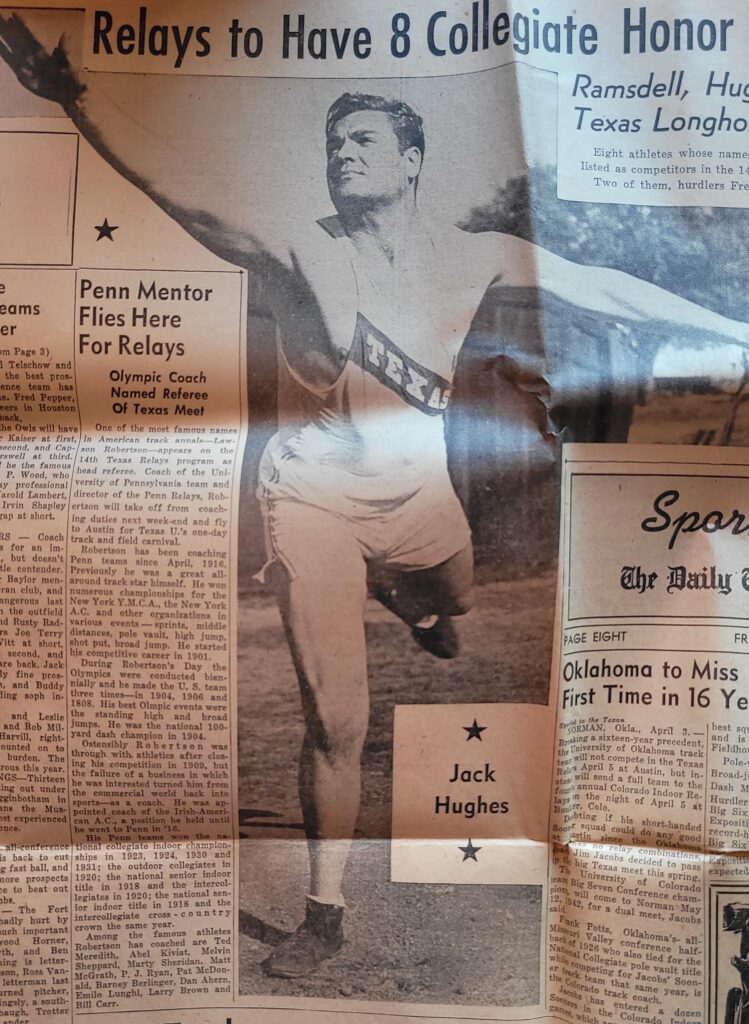
Rice was projected to win the SWC, but the son of the great Tex Ramsdell (Fred Lee Ramsdell recovered from a two-year attack of pneumonia) gave the Longhorns strength at sprinting. Fred was known for “short strides” but started placing in the 100 and 220 to give the Horns needed points. Texas won the SWC by 23 points.
Bryan, Gatewood, and Ramsdell were named to the National Collegiate Honor Roll. At the National meet, Gatewood placed 3rd in the high hurdles.
1941-2 SCORES AT NATIONALS Coach Littlefield
1940-1941 track front- Terry, Smith, Edmunds, Stewart, Pack, Bryan, Gatewood, McSpadden, Price, Ramsdell, Hafernick- second – Littlefield l, Puett, Barefield, Flanagan, Davidson, Adair, Hughes, Baggett, Roberts, Gilstrap- 3rd row- Milton Kelly -trainer, Sparks, Seay, Hill Jacques, Barnes, Sansing
Longhorn Logo 1941
The track association changes the title from “National Collegiate Honor Roll” to “All American
Jack Hughes 5th in Discus
Garland Adair 4th in Javelin
The Sprint Medley Relay team of Mac Umstattd, Fred Ramsdell, Bill Seay, and Morris Barefield set a world record of 3:24 in 1941. Coach Littlefield says that Bill Seay is the “greatest lead-off man” in Texas track history
Carlton Terry
The Talpa, Texas terror. Terry’s career was plagued by leg injuries resulting in pulled muscles that often occur with fine-tuned athletes. However, in 1941, he won everything in sight. He was the first-ever athlete to win the triple crown of racing in the 100. The outstanding athlete at the Drake relays; the first collegian to run a 9.2 100 (wind-aided). He was the first All-American for Texas (with Jack Hughes). Terry says, “ I would get nervous the day of a meet that it was impossible for me to eat anything, and more often than not, I would get sick to my stomach after competing.”
The team is the SWC champion, winning 9 of 16 events and setting two SWC records.
Terry becomes the first Longhorn to win the 100 at Kansas relays, earning his name the Talpa Terror.
440 team was unbeaten in all races and invited to LA to compete against undefeated USC. It was one of the first times the team flew, and all got airsick except Ramsdell. Lonnie Hill was so sick he refused to fly back to Austin. He took the train. Joining the team on this commercial flight was Robert Stack (The Untouchables). He got violently ill.
The national championship meet was a disappointment for the team, with only two members placing. Carlton Terry and Hughes were selected as All-Americans.
